THE BANNER
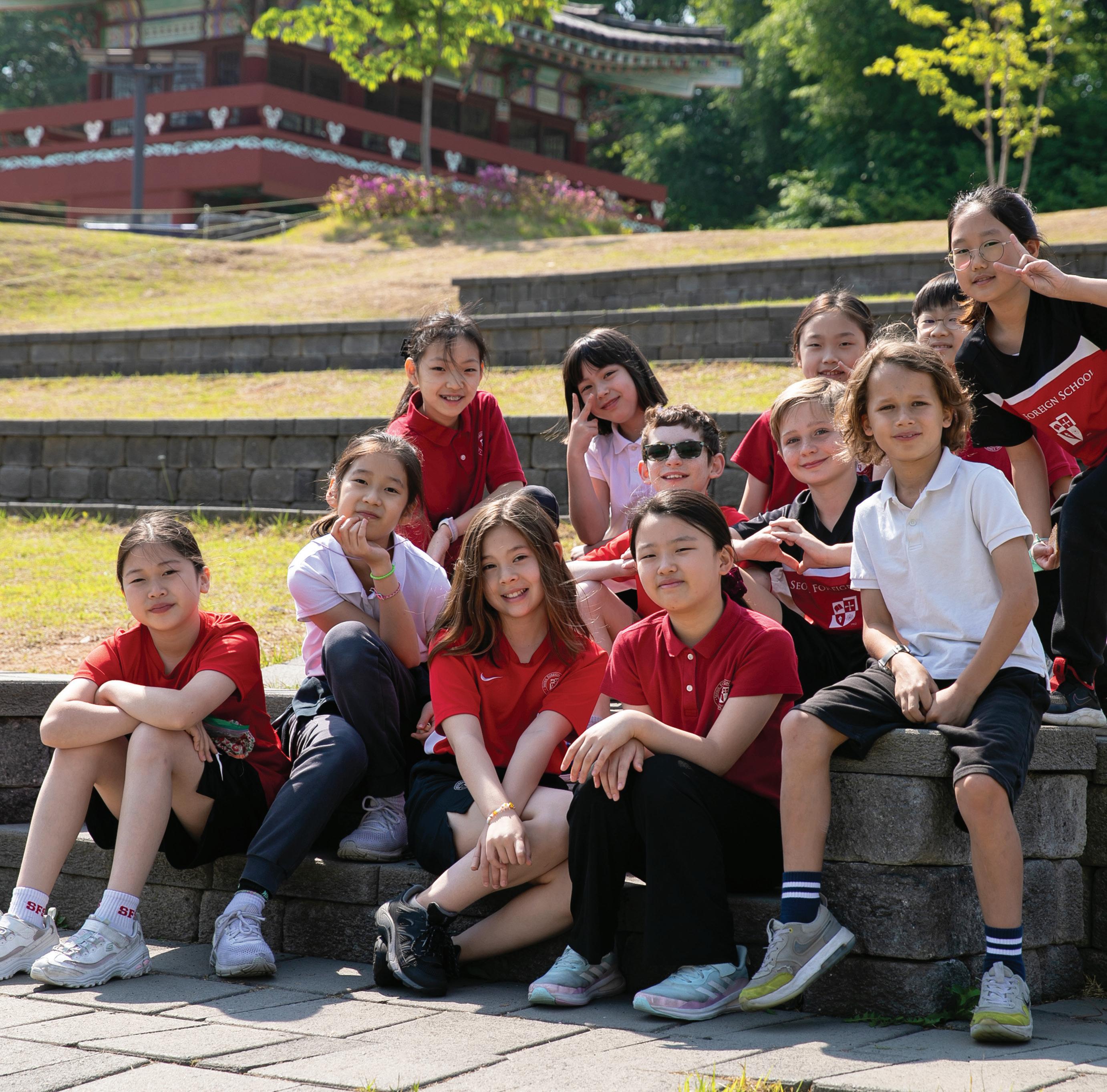
Inspiring Excellence, Building Character - since 1912 Seoul Foreign School Magazine, Spring 2023
Next Chapter
The
Features
6
14
The Next Chapter: Class of 2023
Celebrating our seniors as they embark on a new Journey.
Embracing Inclusive Values: The next Chapter at SFS

Defining inclusion and applying it to our classrooms.
18
A Dive into Innovative Approaches in the Elementary School
A glimpse into the many ways the Elementary School constantly innovates.
24 MYP & DP Design - Then and Now
A dive into the exciting world of design.
28
The Next Chapter in the British School: Collaboration, Success & Belonging Success, belonging, and provocative pokes!
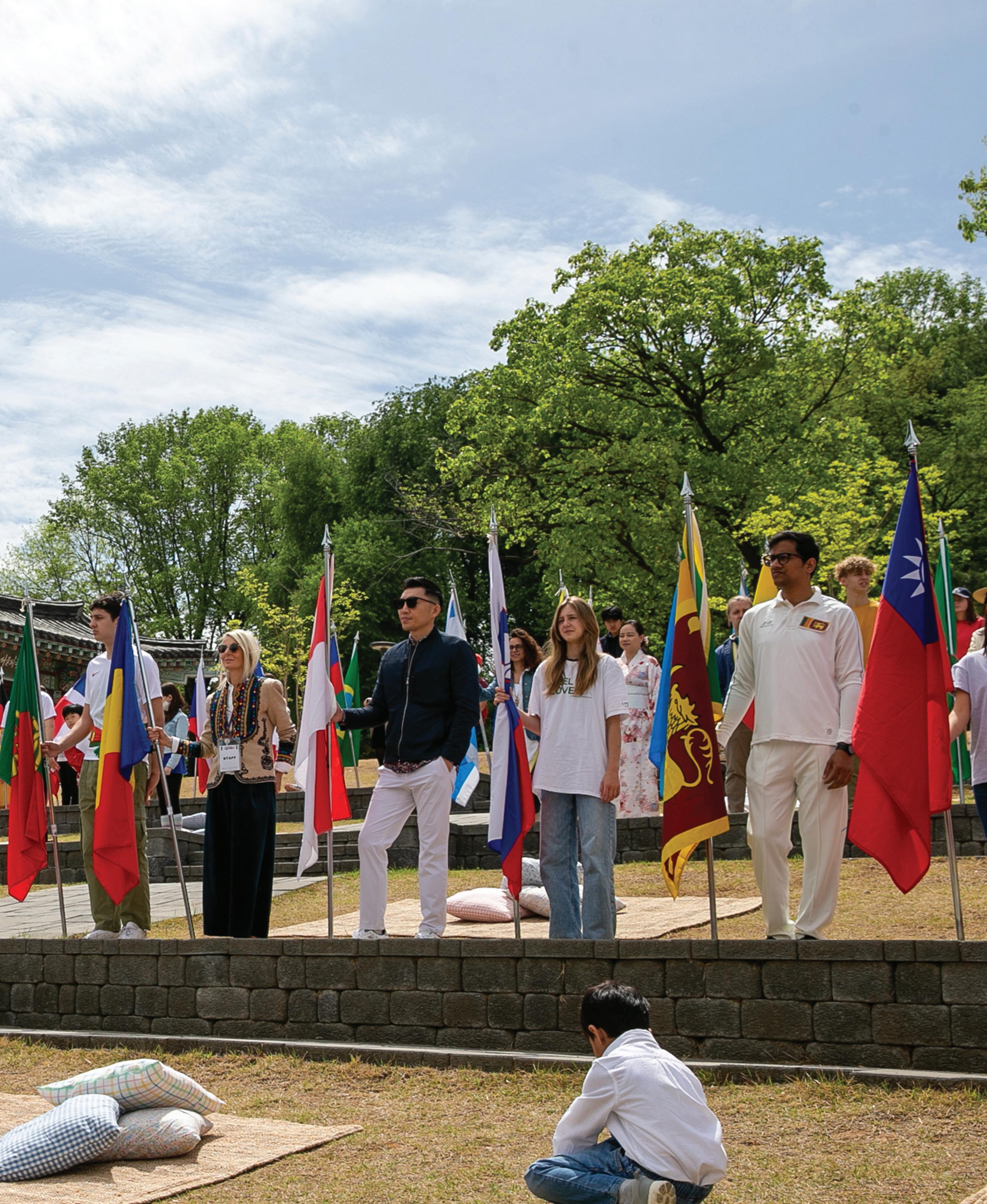
International Fair 4 From the Head of School and Board Chair 32 School Happenings Sports, Arts, Academics 58 Alumni 66 Lately at SFS 68 Advancement 72 Games
From the Head of School
Dear SFS Community,
As we reflect on the past year, I am filled with pride and gratitude for all that we have achieved together. Our school has a longstanding history of educational innovation, spanning over 111 years, and it has been inspiring to see how we have continued to build on this legacy of excellence and innovation, even in the face of challenges brought on in the last couple of years. As we welcomed back our students and staff to campus, we were reminded of the importance of face-to-face interactions, the power of community, and the value of learning from one another.
In addition to these moments of resilience and togetherness, we also have many achievements to celebrate. As we celebrated the 110th anniversary of our school, we were reminded of our strong foundation of educational excellence and innovation. We also had many successes in our sports programs, with our teams excelling in various tournaments such as APAC, FOBISIA, KAIAC, and KASS. Our students have embraced healthy competition, teamwork, and sportsmanship, and we are incredibly proud of all that they have accomplished.
We have also seen a resurgence of our performing arts programs this year, with many shows and concerts finally being able to be performed in front of a real audience. It has been a joy to witness the creativity and talent of our students and staff, and these events have come back stronger than ever.
The generosity of our community has also been on full display this year, both through our philanthropic programs and various fundraisers linked to our service initiatives. Our students have continued to give back to our community and beyond, and we have seen firsthand the positive impact that this can have on the world.
As the school year draws to a close, we bid farewell to our exceptional faculty and staff members who are embarking on new adventures. I extend my heartfelt best wishes to all of them and express my sincere gratitude for their unwavering dedication to SFS. I want to say a particular thank you to three long standing staff; Mrs. Woo who will be retiring after 35 years of service in the Middle School. Her impact on our school will continue to reverberate for years to come, and her legacy will always be cherished. And Edie and Jack Moon, whose commitment and embodiment of our core values at SFS have left an indelible mark on our institution. Their story will forever remain intertwined with ours.
Finally, I want to give a special shout-out to the Class of 2023. This group of students has overcome so much and shown incredible resilience and strength throughout their time at Seoul Foreign School. It was truly inspiring to see them graduate with so many successes, and we cannot wait to see all that they will accomplish in the future.
Looking ahead, I am excited for what the next chapter holds for our school. With your continued support, we will remain at the forefront of educational innovation and provide our students with the skills and knowledge they need to thrive in a rapidly changing world.
Thank you to our entire community for all that you do to make Seoul Foreign School such a special place.
God bless,
Colm Flanagan Head of School
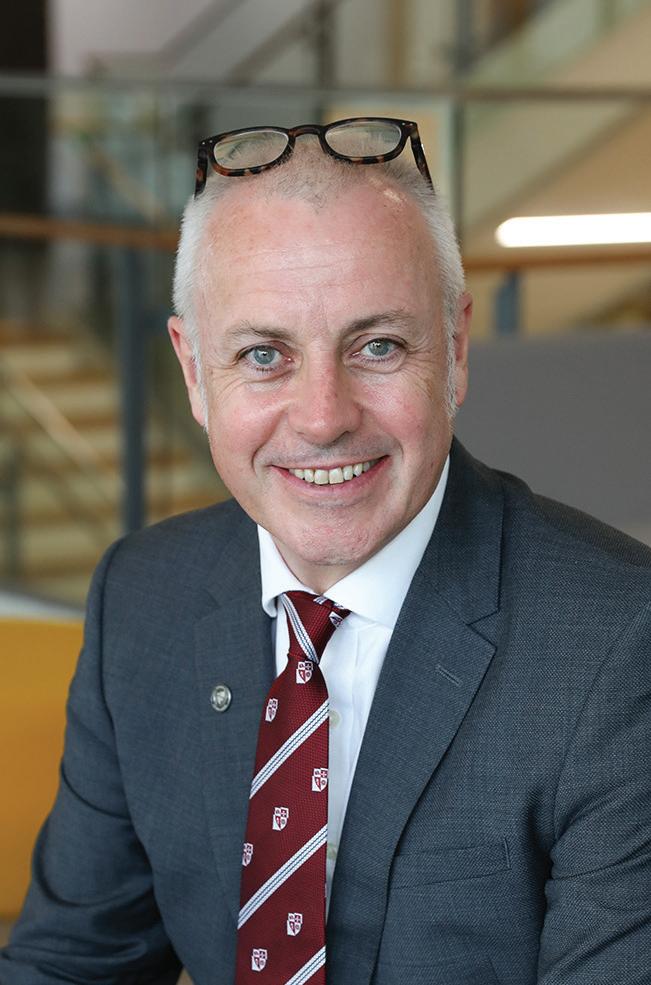
4 The BANNER | From the Head of School
THE BANNER
Seoul Foreign School
Magazine, Spring 2023
Team
Published by: Seoul Foreign School Communications & Marketing
Department
Editor-in-chief: Cyrielle Bazin
Design and Photography: Juhie Suh

A special thank you to everyone who contributed to this issue
Address
Seoul Foreign School
39 Yeonhui-ro 22-gil Yeonhui-dong Seodaemun-gu Seoul, South Korea, 03723 www.seoulforeign.org
Unless otherwise noted, articles may be reprinted without permission - as long as they are not edited or revised - with appropriate credit given to “The Banner, the magazine for Seoul Foreign School.”
*All efforts have been made to check details and consistency. Please contact communications@ seoulforeign.org with any questions.
Cover: Elementary students enjoying recess.
From the Board Chair
Dear SFS Community,
From the beginning of the academic year, I realized I had started spending more time on the SFS campus and gradually re-engaged with the SFS community. In the past few months, I have been able to see old and new faces, all finally with a discernible smile not obscured by a mask. The COVID pandemic is not over, but the immunity gained by vaccination and exposure has allowed the government to lessen restrictions which meant that the school finally switched to full-gear mode. A few weeks ago, we had our first International Fair together in years with the much-anticipated celebration of our 110th anniversary. I am still in awe at the idea that our school has survived and thrived through numerous devastating historical events and that, every time, it has adapted and changed to engage with every new reality that was present. We have eye witnessed the resilience of our school and the amazing response of our administration to the COVID pandemic hurdle. The hard work and hard decisions made during those early months have resulted in our school coming out stronger and in a better position within our Seoul community than it was three years ago.
I am coming to the end of my term on the Board of Governors, and I will step down from the Chair of the Board at the end of this academic year. I felt privileged to have been part of this community. SFS has been a home away from home for my family, I learned a lot as a governor, and through this journey, I have met many remarkable individuals that have made this experience unforgettable.
I know I leave the school in good hands as the current Board members are an extraordinary group of dedicated individuals that love the school and firmly believe in its philosophy and mission. I encourage everyone to get involved with this amazing community; it is what makes this school so special: each and every one of you that trusts SFS with your children's education.
Sincerely,
Dr. Silvia Ratto Kim Chair of the Board of Governors
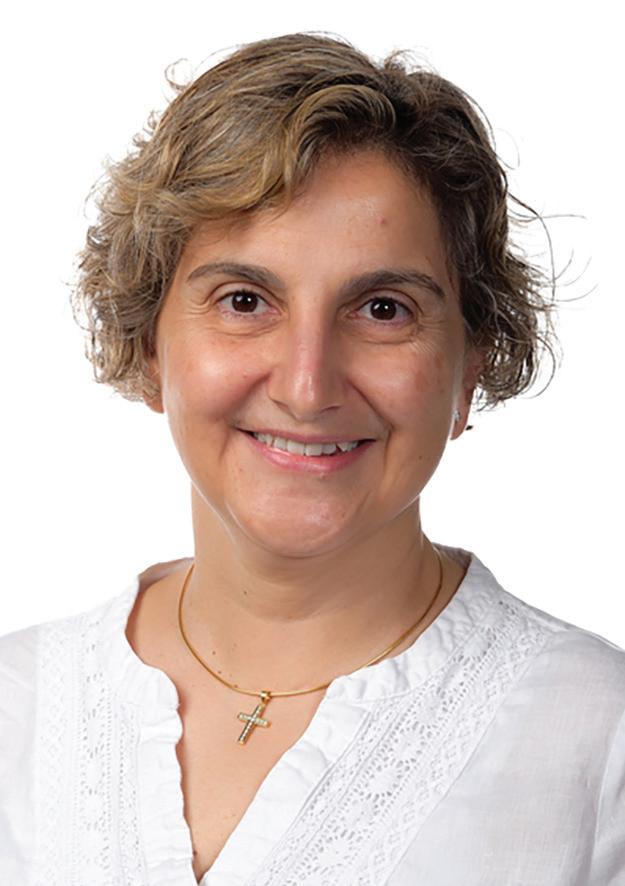
“I repeat, be strong and brave! Don’t be afraid and don’t panic, for I, the LORD your God, am with you in all you do.”
- Joshua 1:9
5 Spring 2023 | From the Board Chair
THE NEXT CHAPTER: CLASS OF '23

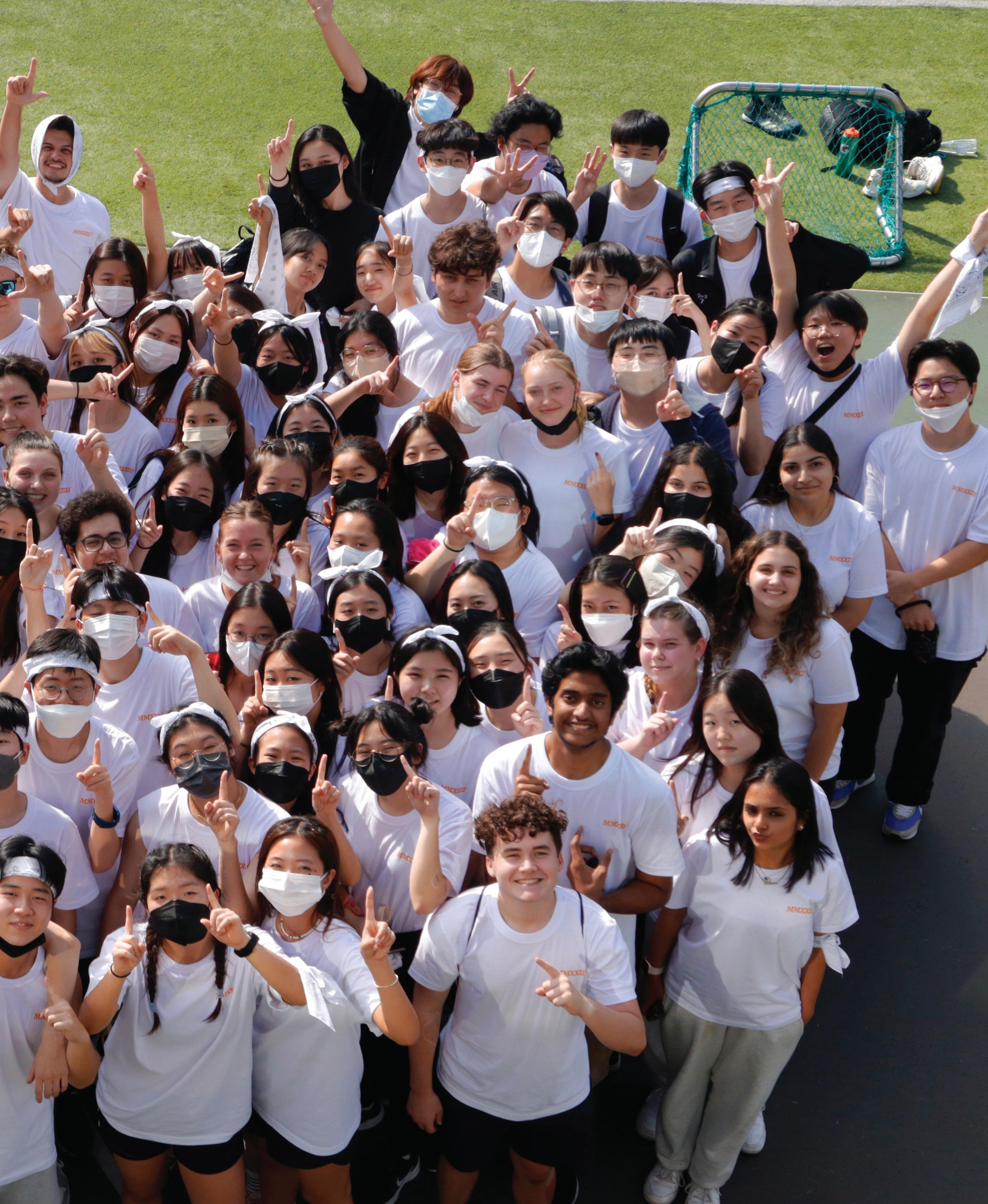
Open Letter by Dr. Nancy Le Nezet, High School Principal
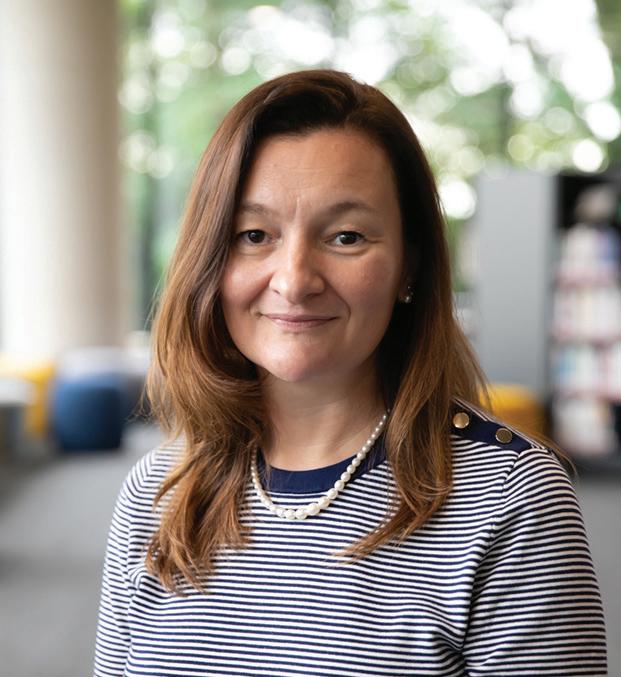
Dear Class of ‘23,
It has been a whirlwind of a year and I think we can all agree it has gone faster than we expected! There has been a sense of “busyness” and many of you have commented on your packed schedule of classes and activities. The truth is, the pandemic forced us to slow down and go back to basics. As a result, the return of normal activities - full sports seasons, live shows with real audiences, parents attending events and exhibitions, full exam sessions, overseas school trips - has felt like a tsunami. It has been fun and full of joy, but has also thrown us off-balance at times.
All these activities can help us find our balance, if we are thoughtful about how much we take on and how intensely we do it. During the pandemic, students continued working hard on their studies but they no longer had the extracurricular activities and leisure time allowing them to put their work into perspective. When all the activities were allowed to happen again, we threw ourselves into them with renewed intensityhence the occasional feeling of running out of time and energy.
Author Thomas Merton wrote: “We cannot be happy if we expect to live all the time at the highest peak of intensity. Happiness is not a matter of intensity but of balance and order and rhythm and harmony.” This is something we can take away from this year: perhaps next year will be a good time for us to continue reflecting on the right balance, the one that makes us happy and not just busy, the one that allows us to flourish because it includes some reflection time and downtime and breathing time.
Dr. Le Nezet
William Kim
Next Adventure: Princeton University
Pieces of Wisdom
Ihaveobserved that high school can be both exciting and overwhelming for underclassmen. However, there are some important pieces of advice that I would like to offer to make the experience more fulfilling.
Firstly, it is essential to understand that grades aren't everything. While it is important to work hard and strive for academic excellence, do not beat yourself up for a bad grade or two. Instead, take it as an opportunity to learn and improve. Remember, your grades do not define your worth as a person.
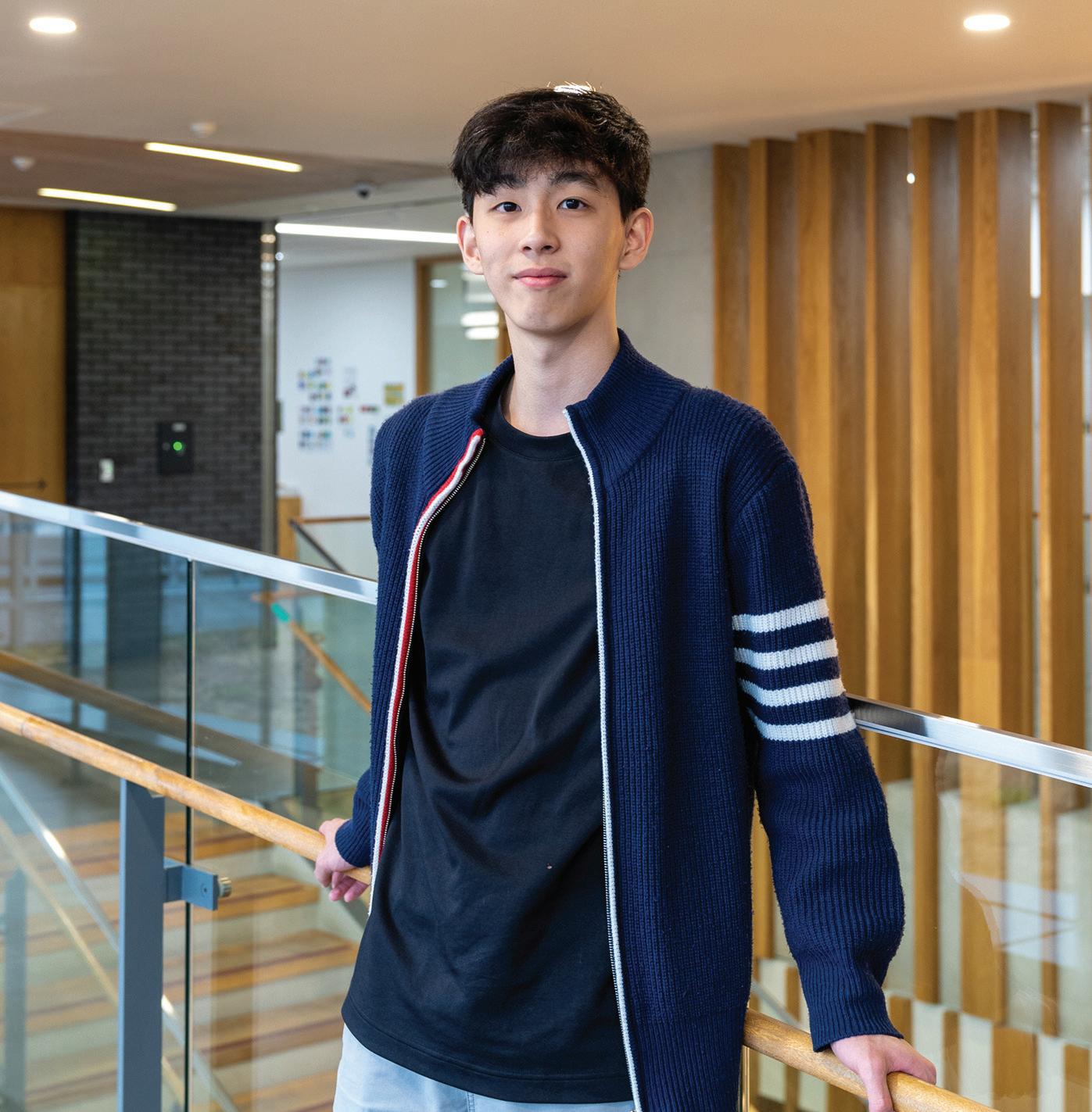
One of the most challenging times in high school is usually the first semester of senior year. This is when stamina gets tested as students prepare for college applications, extracurricular activities, and the academic workload. I have observed that it can be a time when students struggle with energy levels, no matter how much sleep they get. Hence, prioritize sleep and ensure that you get enough rest to maintain your energy levels.
Regarding the SFS community, I have observed that the SFS culture is unique, and the people are among the best you will ever meet. They embody some of the most Christlike
8 The BANNER | Feature
My advice to underclassmen would be to leave time for what you want to do and find your passion. Discovering your passion can be a long and challenging process, but it is crucial to explore different activities and interests to figure out what excites you. Once you find your passion, everything will fall into place, and you will feel motivated to pursue your goals.
However, it's important to note that while pursuing your passions, you should not neglect your studies and responsibilities. Completing your necessary tasks promptly will give you more time and freedom to do what you love. So, prioritize your studies and responsibilities to avoid any stress in the long run.
Another valuable piece of advice is to take risks and try new things. Do not be afraid of failure or rejection, because it is an opportunity to learn and grow. The worst that can happen is that you will fail, but you can always try again and improve. Remember, nothing ventured, nothing gained.
from Them to You
attitudes, such as compassion, kindness, and love. Take advantage of the community and the people around you, as they can offer support and encouragement when you need it.
As an underclassman, it is also essential to look forward to life beyond high school. Moving on from high school can be exciting and nerve-wracking, but it is an opportunity to make new friends and experience an independent life. Embrace the challenges that come with this new phase, and remember to keep an open mind.
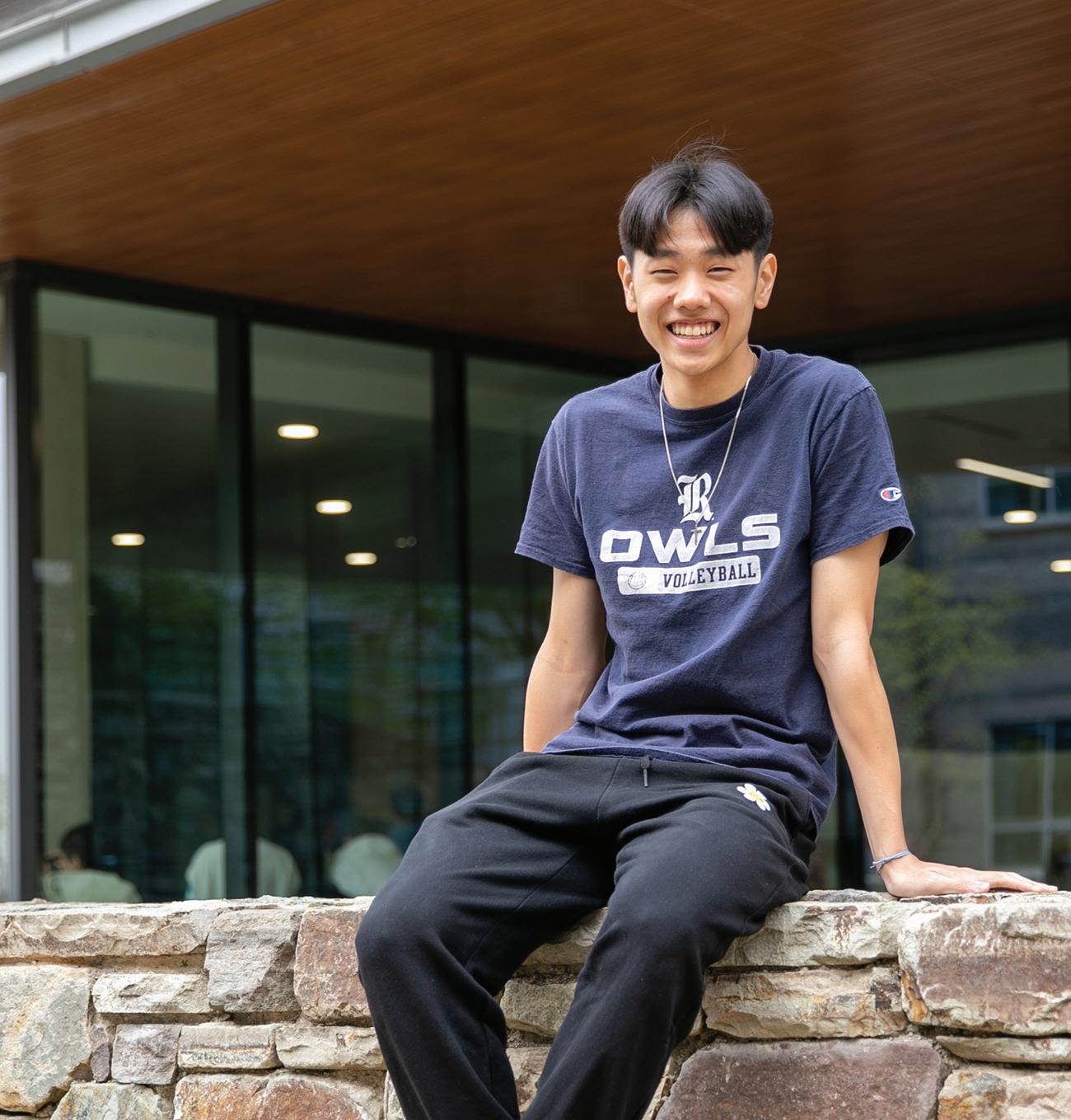
Finally, my last piece of advice is that hard work pays off, but it is not always immediate. Success often comes with a lot of hard work and dedication, but it may not happen overnight. So, be patient and keep striving for excellence. Moreover, remember that you don't know yourself as well as you think you do. Therefore, be open to learning new things about yourself and embrace change as it comes.
In conclusion, high school can be an exciting but challenging time for underclassmen. Still, with the right attitude and approach, it can also be a fulfilling experience. Remember to prioritize sleep, embrace challenges, and stay open to learning new things about yourself.
One of the most challenging moments in school is to avoid burnout. There are many things to do, both inside and outside the school, and it can be overwhelming. To avoid burnout, try to maintain a healthy balance between your studies, social life, and personal hobbies. Practice good time management and prioritize tasks that are most important to you.
Being competitive is excellent, but it is crucial not to let it get in the way of your relationships with friends. Avoid pushing your friends away by being too competitive and focus instead on building healthy relationships. Maintain your health by engaging in physical activities, eating a healthy diet, and getting enough sleep.
In conclusion, finding your passion, trying new things, maintaining a healthy life balance, avoiding burnout, and not being overly competitive are all essential for underclassmen to succeed in their academic and personal lives. Remember to take care of yourself and always strive for personal growth.
Next Adventure: Washington University in St. Louis
9 Spring 2023 | Feature
Jordan Kim
12
Interviews & photos by Ho Yoo (grade 11) from PoV (High School Photography Club)
19
19 12
Lauren Song
Next Adventure: Columbia University
Ihavedecided to pursue a degree in earth and environmental engineering in college. My decision was influenced by my experiences growing up in Seoul, where I witnessed the negative effects of air pollution. I wanted to make a positive impact on the world and felt that environmental engineering was the best way to do so. My decision to follow my passion and interests serves as excellent advice for younger students who are considering their career paths.
It is essential to pursue something that you are genuinely interested in, as it is the key to finding motivation and staying committed to your goals. For students who choose a path they are not interested in, it becomes challenging to stay motivated, leading to frustration and poor performance. Following your passion will not only help you stay motivated, but it will also enable you to make a more significant impact on the world.
One of the challenges I and other students face is time management. Balancing coursework, extracurricular activities, and other commitments can be overwhelming and leave little time for completing projects. However, these challenges also teach students valuable skills like prioritizing tasks, delegating responsibilities, and time management. These skills will help students succeed in college and beyond.
Oneof the most important pieces of advice for younger students is to always have a friend who can help them during challenging moments. Having a supportive friend by your side can make a significant difference in your academic and personal life. Good relationships are essential in life, and it is vital to make time for your friends and family.
In school, one of the hardest things students face is managing the workload. For instance, managing college applications and boosting grades can be quite overwhelming. Balancing different tasks and assignments can be a significant challenge, especially when deadlines are looming. It requires planning, prioritization, and effective time management skills.

When it comes to dealing with life's challenges, many people find solace in their faith. For example, someone may
choose to follow Christ-like attitudes and rely on God. They may believe that everything happens for a reason and trust that there is always a path to follow. They may find comfort in the idea that everything in life has a purpose and that they will eventually find their way. This belief can help them navigate the challenges and uncertainties that life throws their way.
In conclusion, having a supportive friend, managing workload effectively, and relying on faith are all essential strategies for navigating life's challenges. Younger students can benefit from building strong relationships, improving their time management skills, and cultivating a positive mindset. By adopting these practices, students can overcome obstacles, achieve their goals, and lead fulfilling lives. 19 12
10 The BANNER | Feature
Mistakes are an essential part of learning, and students should embrace them. Instead of being discouraged, students should view their mistakes as opportunities to learn and grow. Reflecting on past mistakes can help students improve their decision-making skills, learn from their experiences, and ultimately become better individuals.
For me, the challenge was not knowing what I wanted to do in the future. However, I found that things eventually fell into place, and I was able to determine my career path. Although this may not be the best approach, it provides some sense of direction and a gauge for where one stands. Students should not be too hard on themselves if they do not have everything figured out, as it is a process that takes time and effort.
In conclusion, my decision to pursue earth and environmental engineering in college shows the importance of following one's passion and interests. It is essential to embrace challenges and mistakes as opportunities for growth and learning. With hard work, dedication, and reflection, students can achieve their goals and make a positive impact on the world.
Class of 2023
College Spotlight
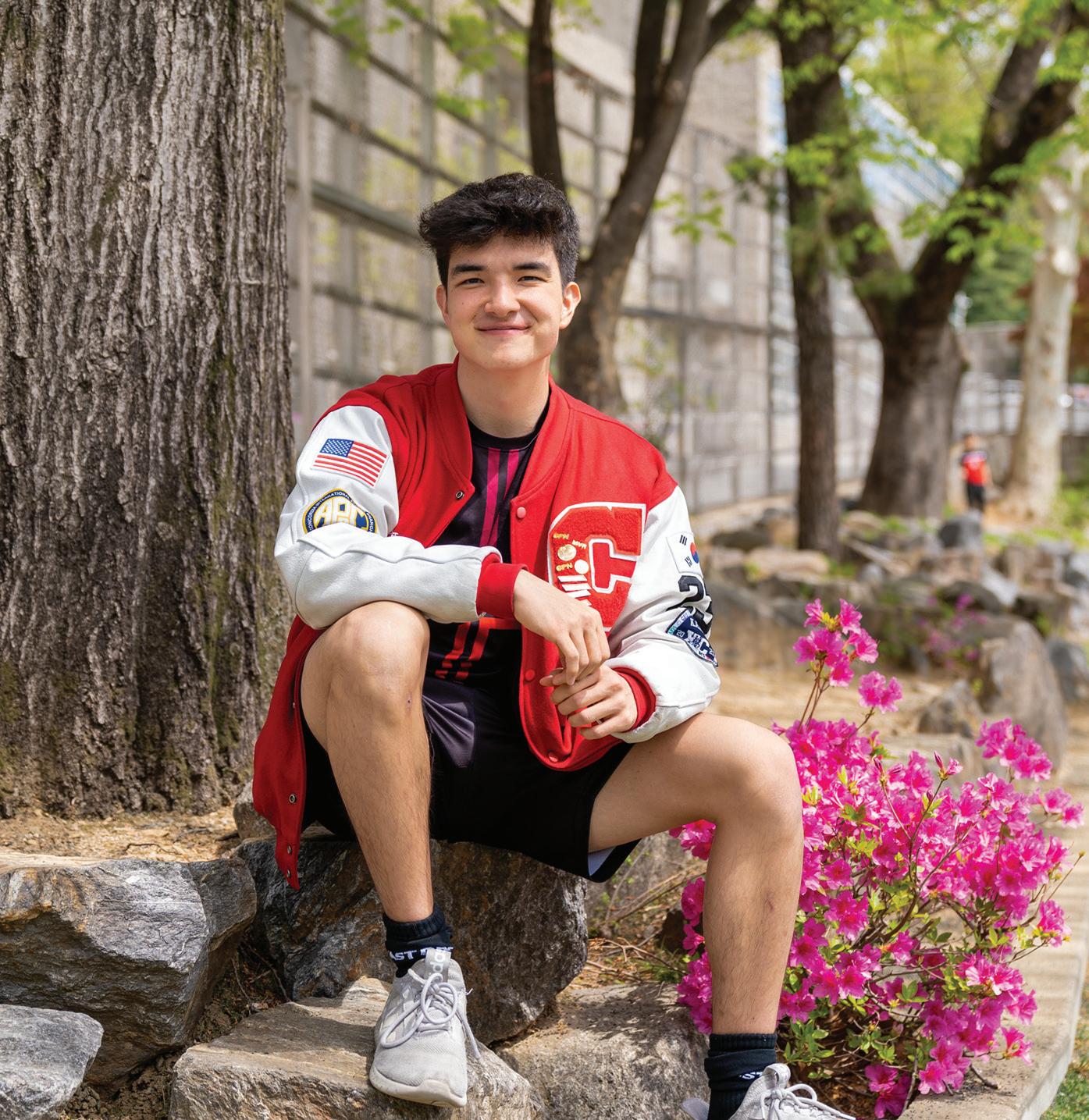
Most popular universities to attend, for class of 2023
University of Southern California
NYU
RISD
Emory
Northeastern University
Boston College
Northwestern University
University of Amsterdam
University of Rochester
University of Toronto
Most popular universities to apply to, for class of 2023
Boston University
Next Adventure: University of Southern California
University of Southern California
New York University
University of California - Los Angeles
Northeastern University
University of California - Berkeley
University of California - Davis
University of California - Irvine
University of California - Los Angeles
University of California - San Diego
University of Michigan - Ann Arbor
11 Spring 2023 | Feature
Lance Jones
19 12
Seniors 130
Attending universities 130
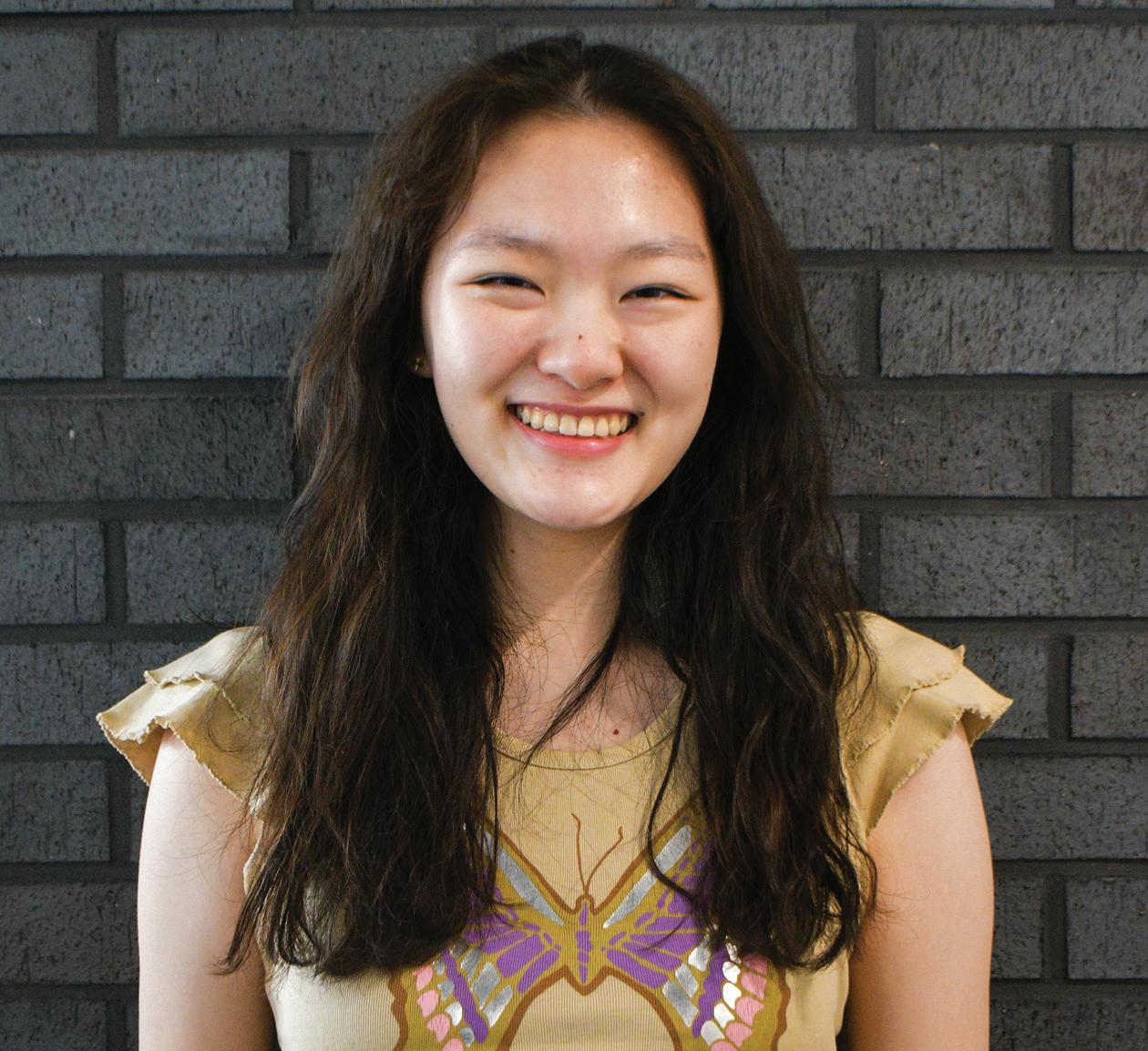
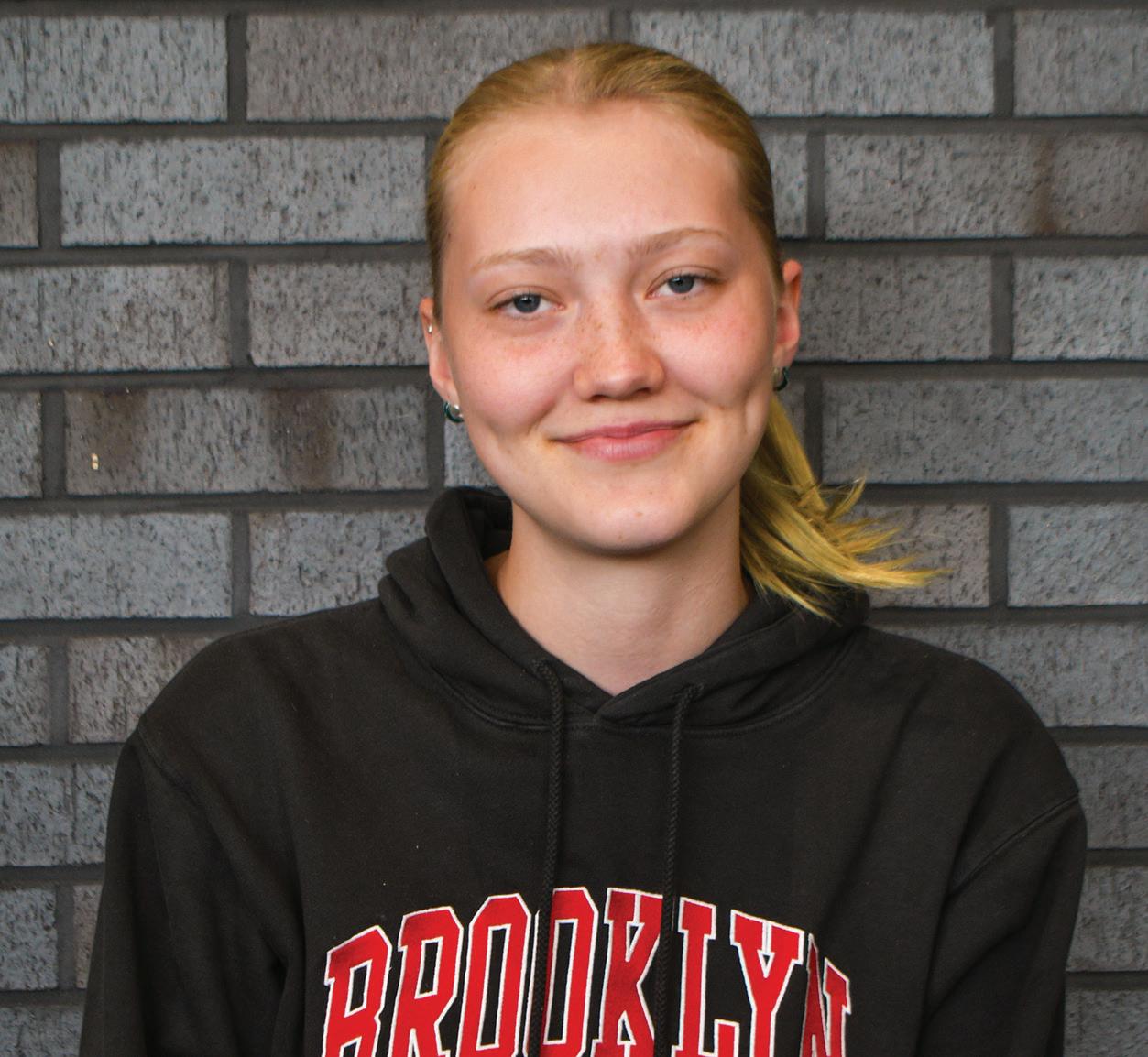
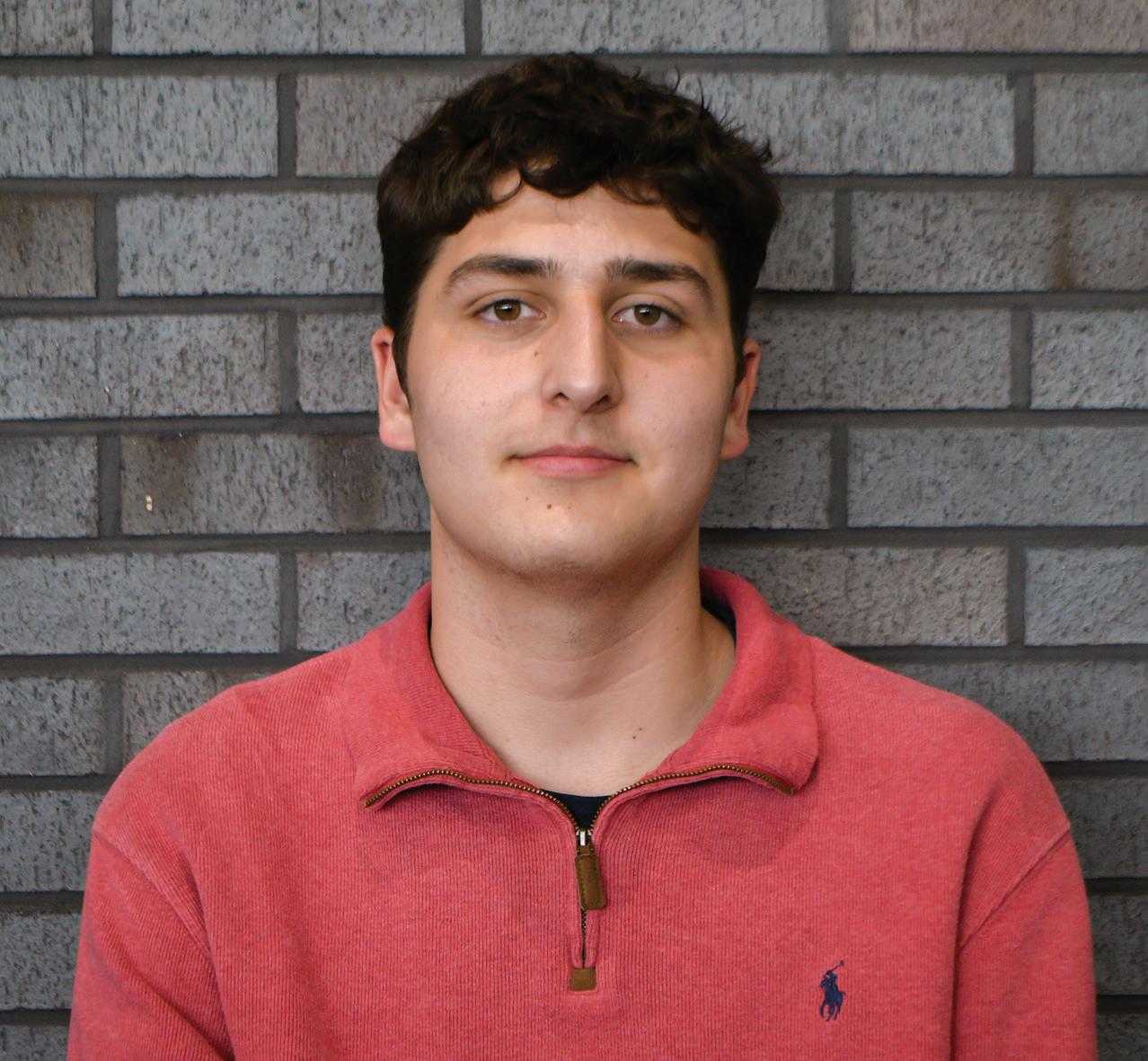
5,356
492,000 grades received in their last school report
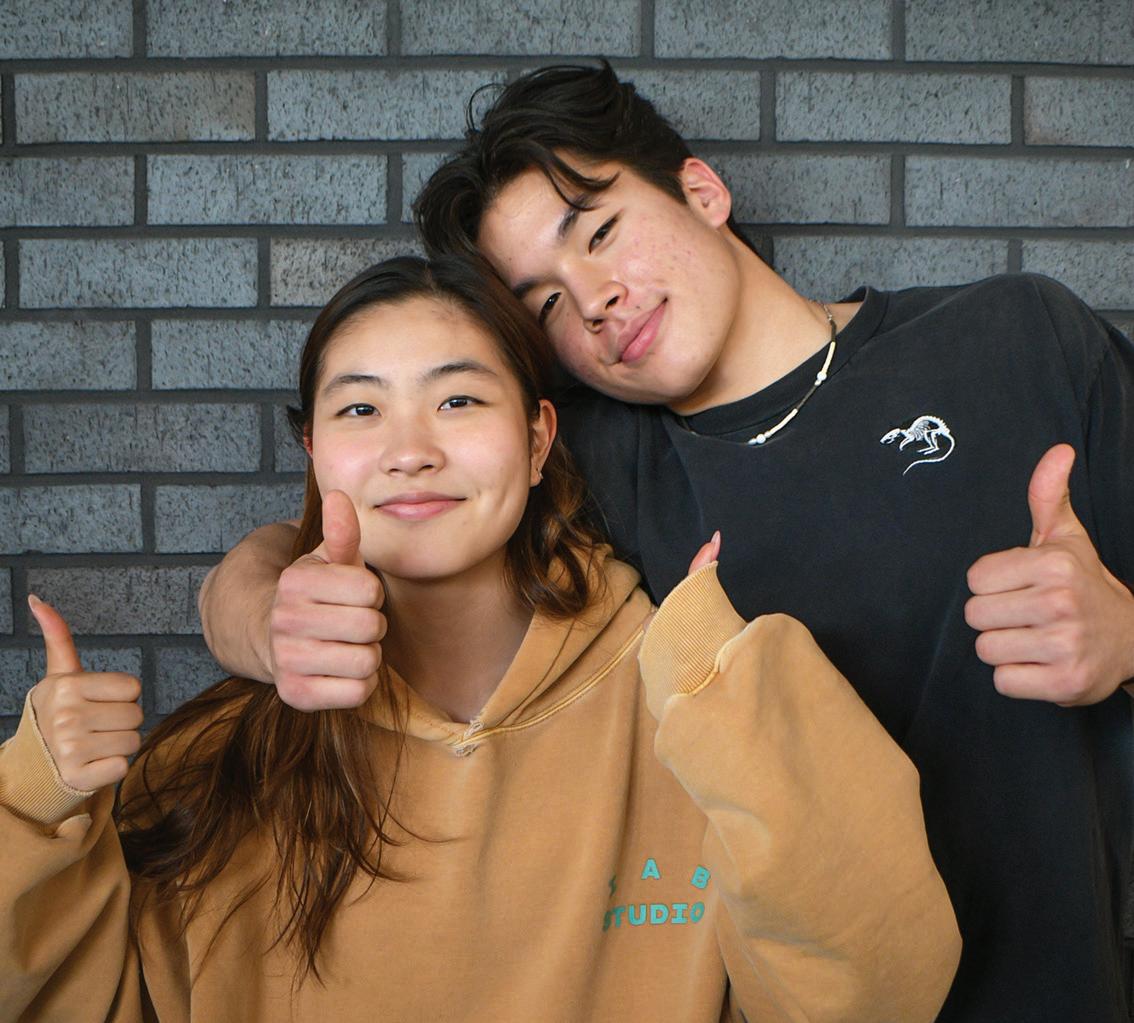
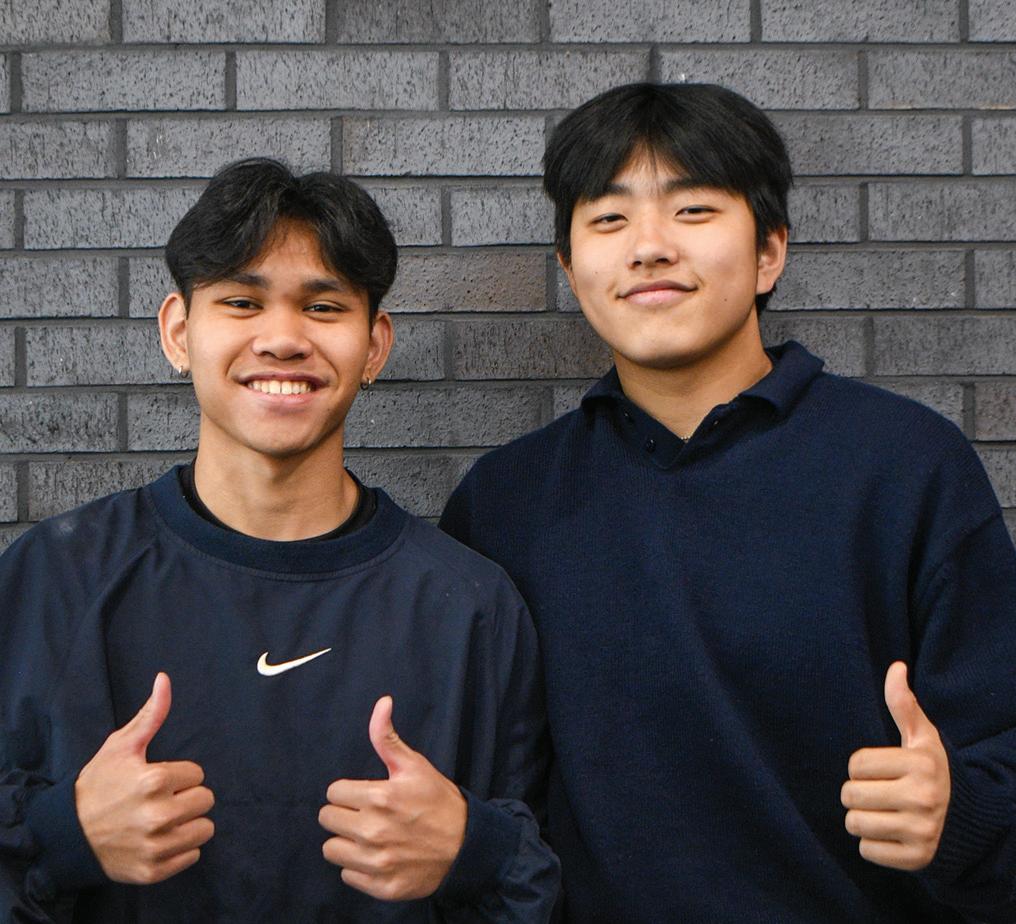
6,189
CAS reflections entered into Managebac
Extended Essay words written
1,500
college applications submitted

The BANNER | Feature
subscribers to Sheena Kim's Youtube channel
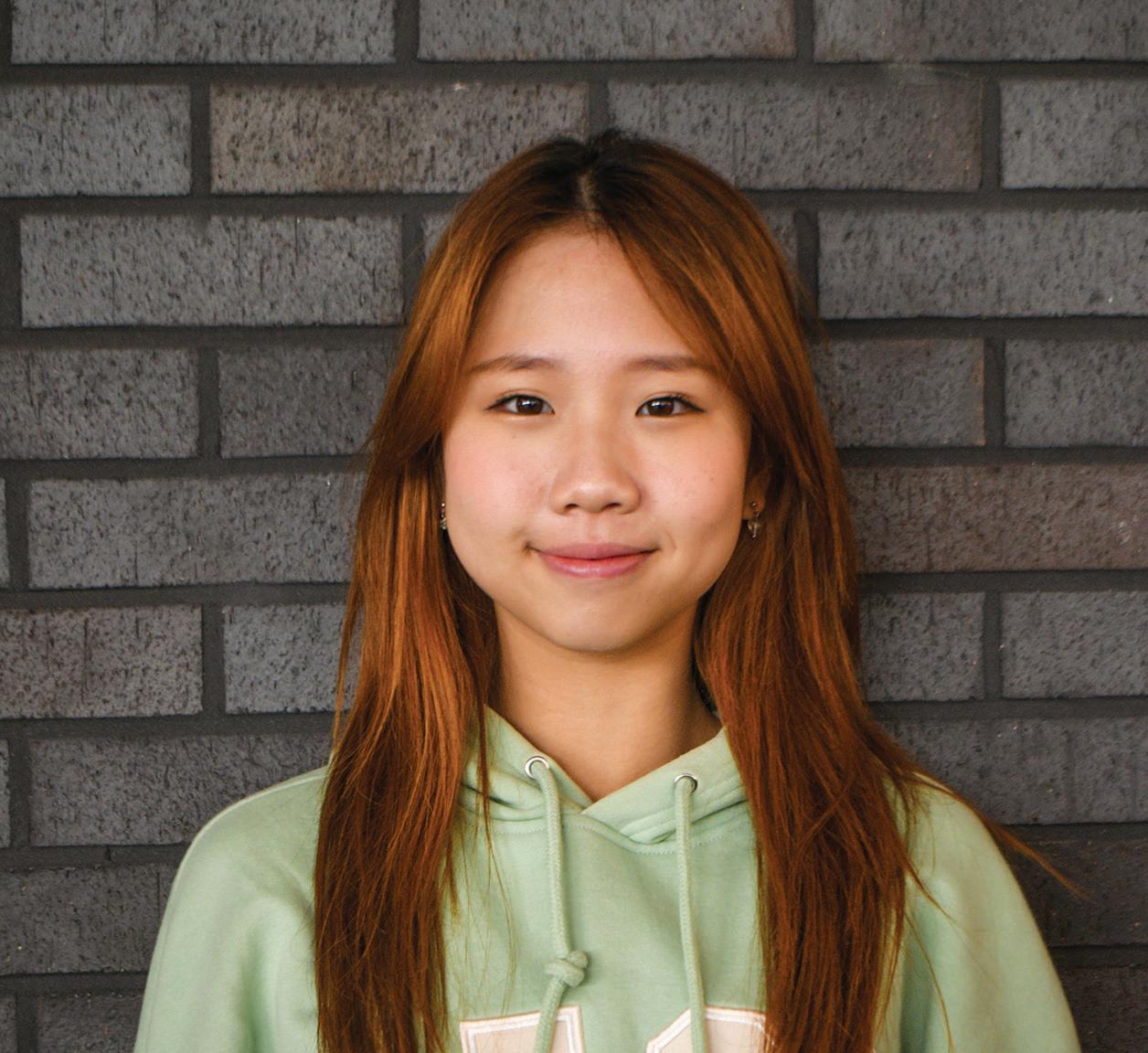
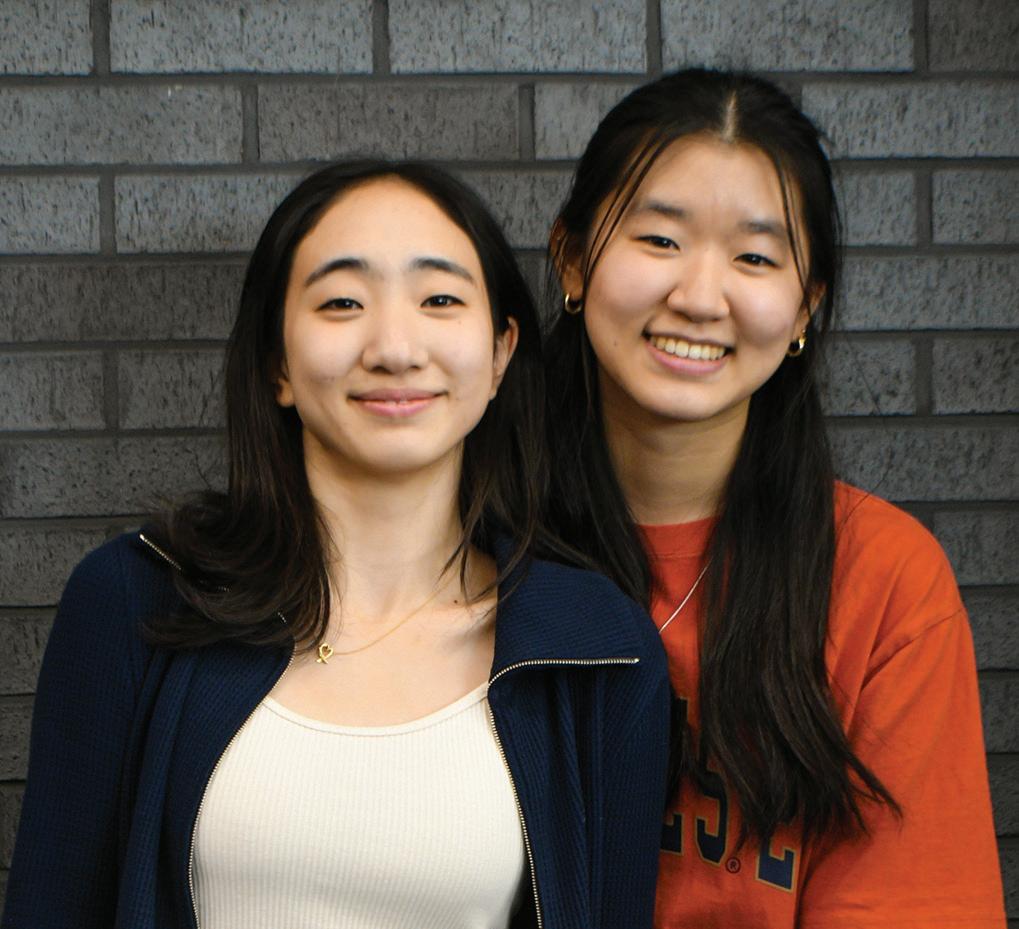

hours spent on average taking DP external exams
42 universities they were accepted to 203
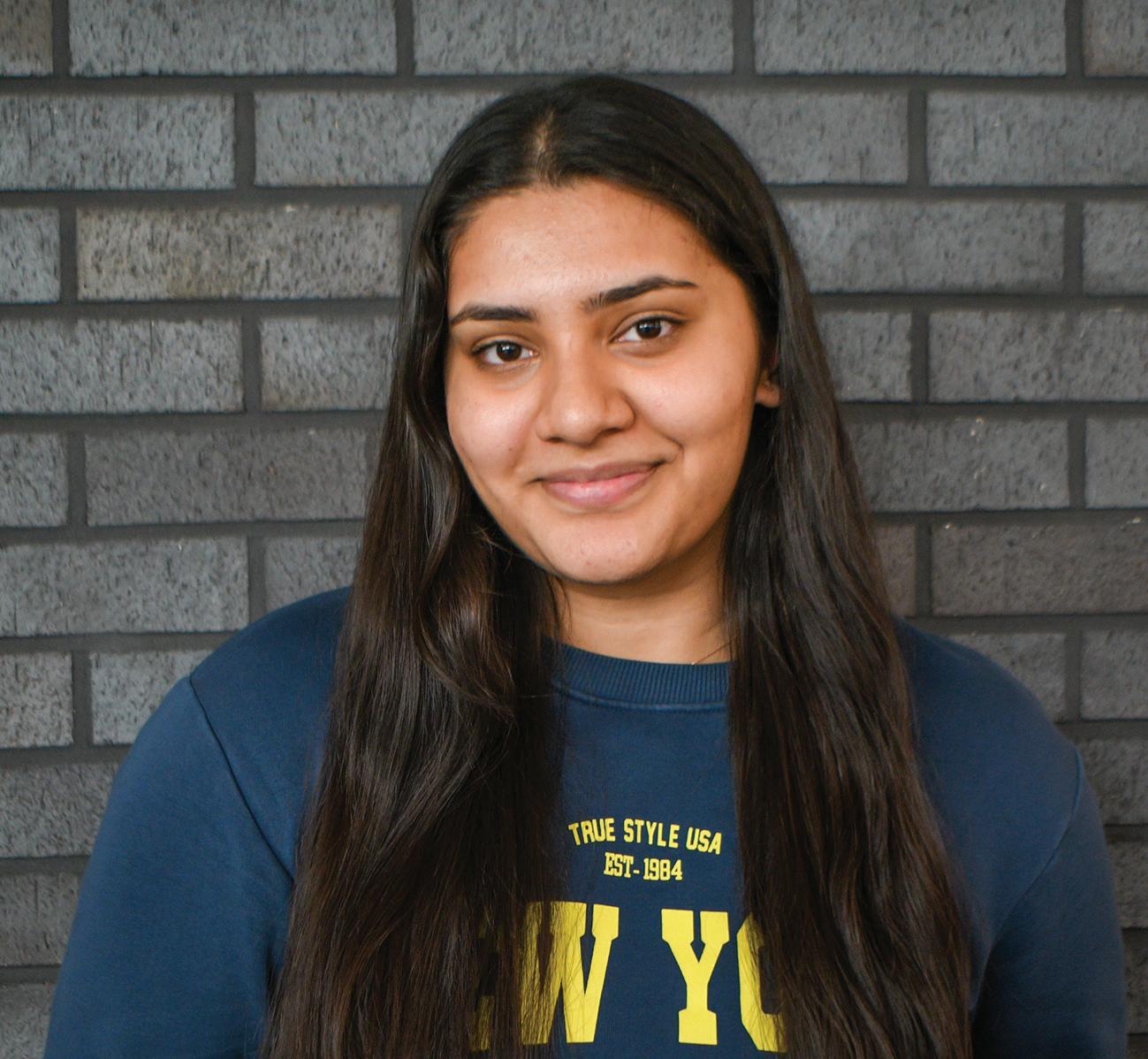
21
nationalities amongst our seniors
20
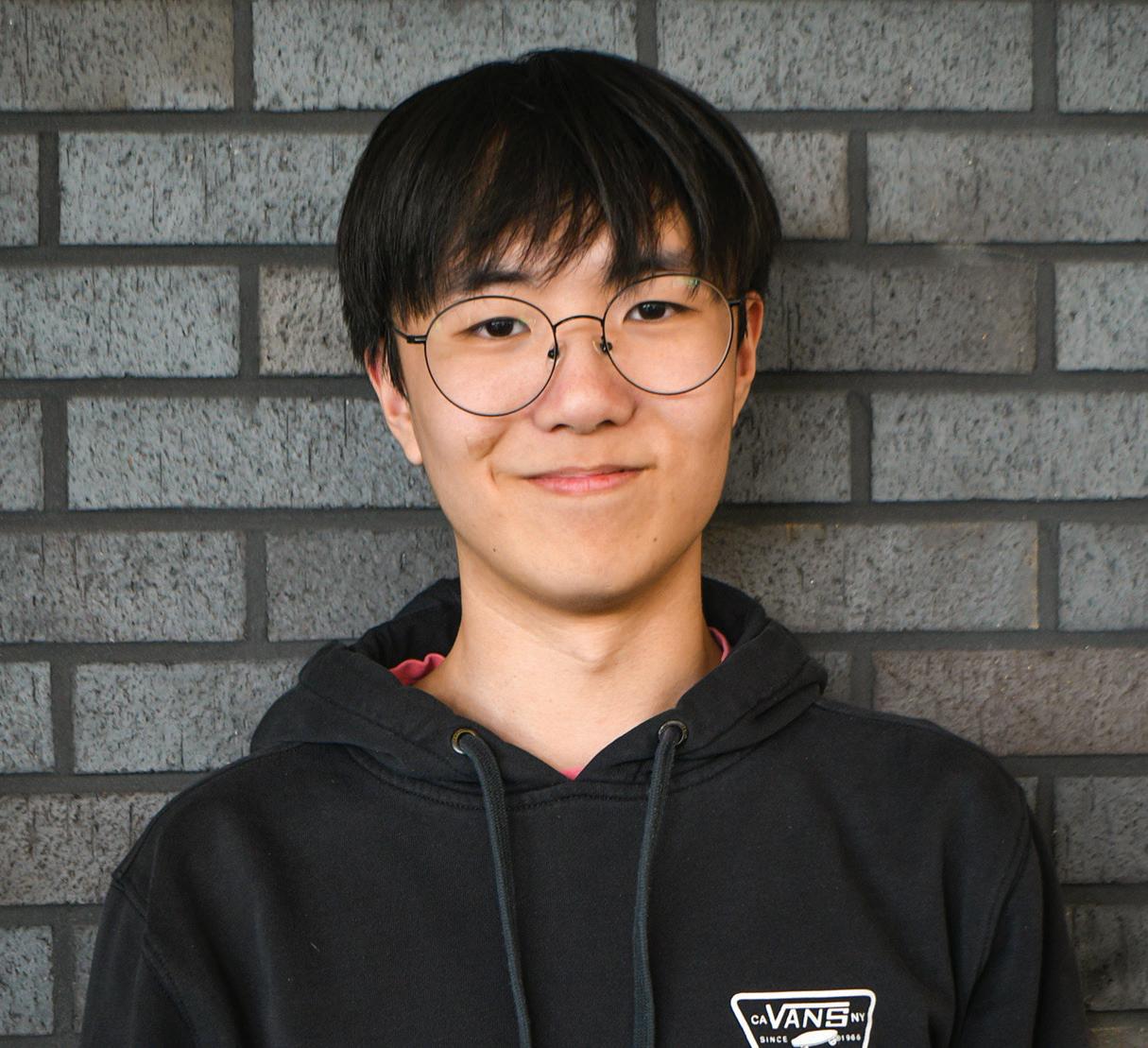
seniors who have attended SFS since PK
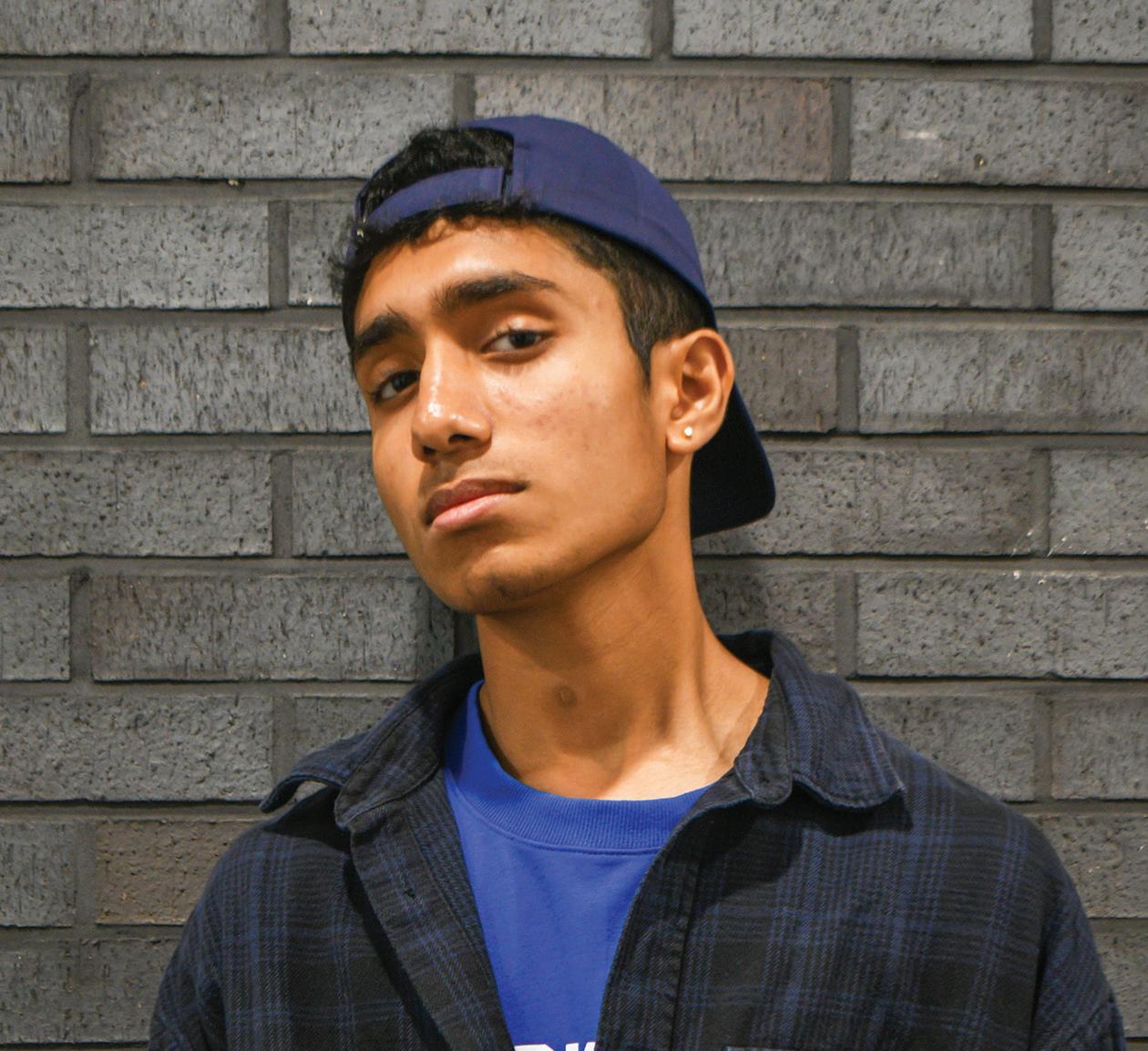
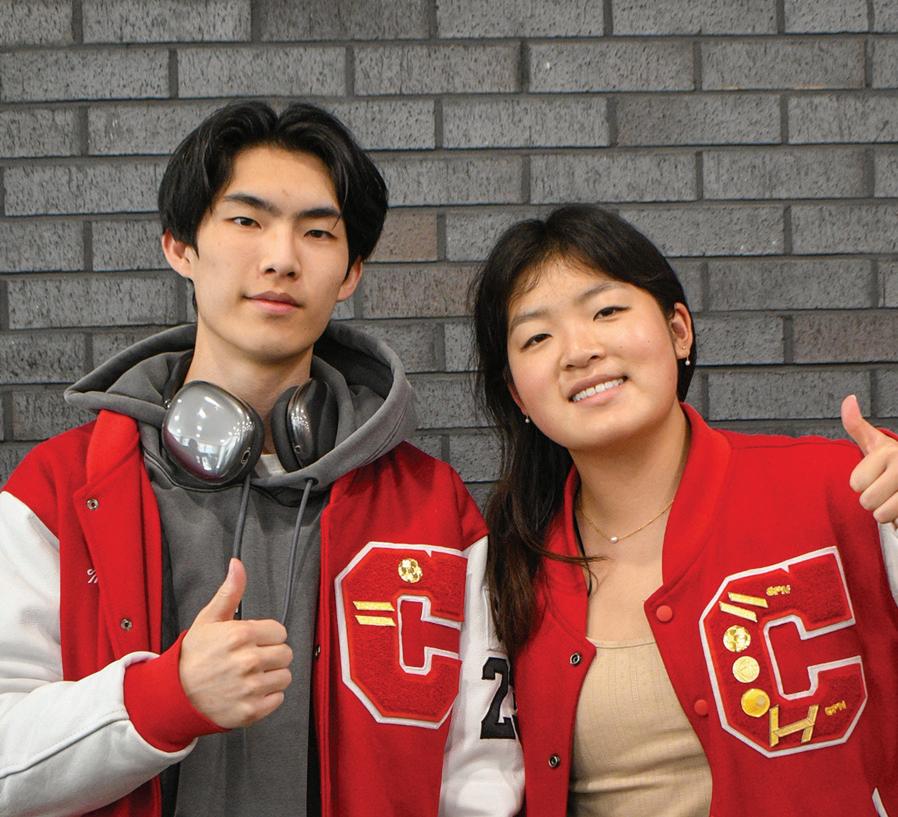
13
336K
Photos by Lauren Song, '32 from PoV
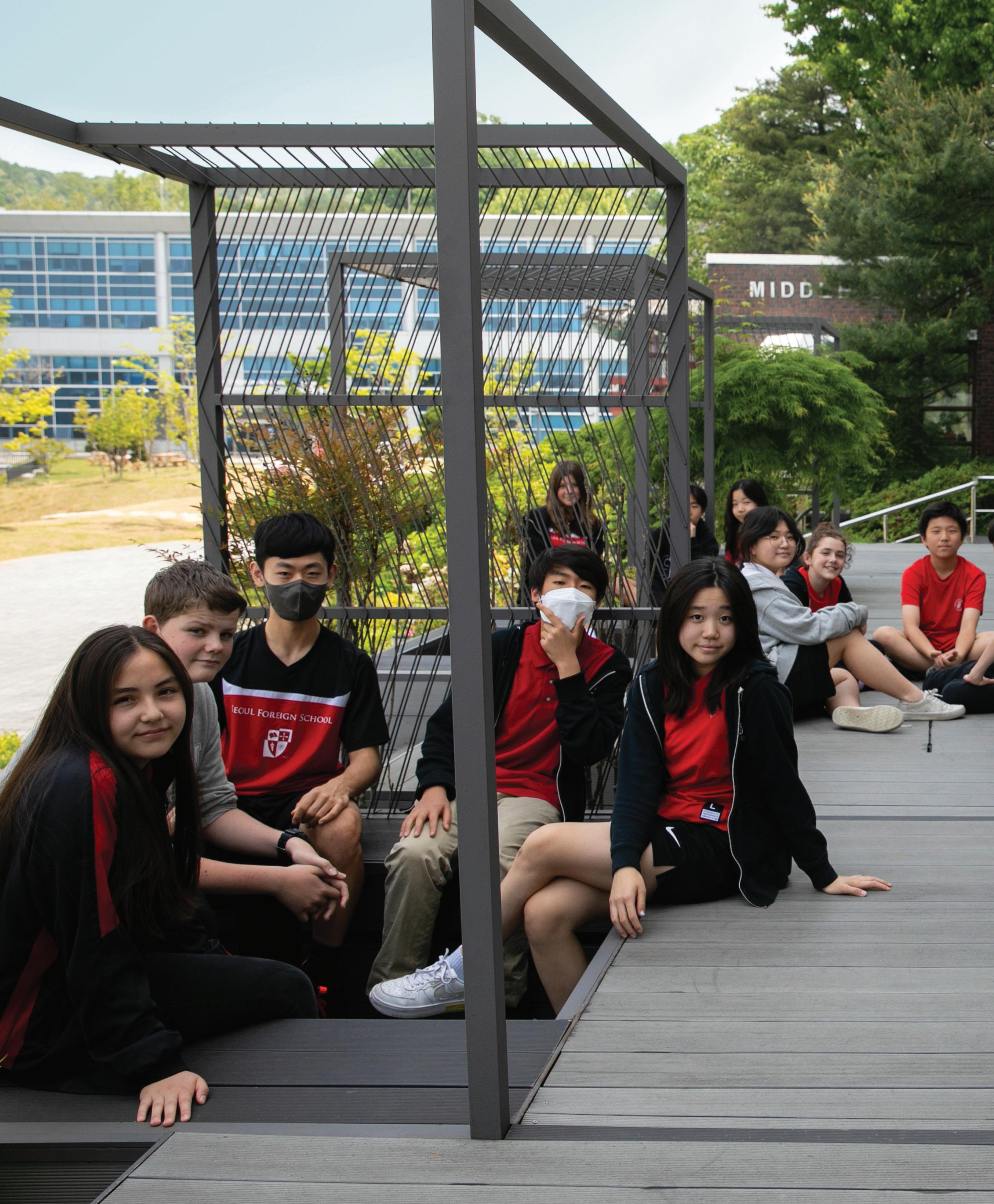
EMBRACING INCLUSIVE VALUES THE NEXT CHAPTER AT SFS
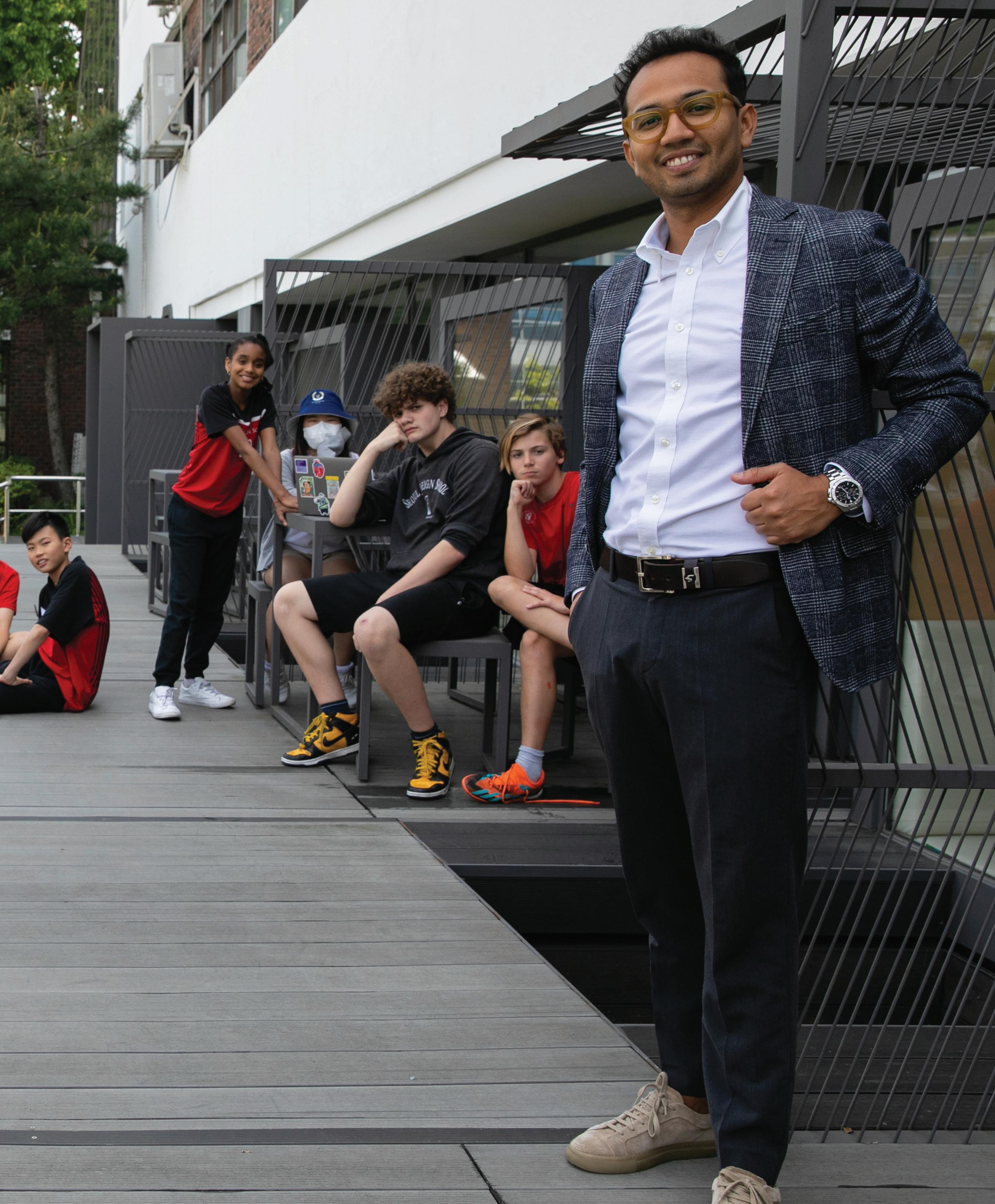 By Rafael Jimenez Learning Support Specialist
By Rafael Jimenez Learning Support Specialist
Inclusion is when in my class, all students feel valued for who they are regardless of how they learn, look, or their personal life choices. Inclusion is when all students feel respected and see the classroom as a place where they can be themselves, try their best without fear of making mistakes, and feel confident that their voices will be heard.
Inclusive communities are continually exposed to challenging conversations, academic excellence, and social-emotional development. Although some may say it’s better to stick with what you have than risk it for something greater, it is undeniable that the next chapter of inclusion at Seoul Foreign School will require us to have difficult conversations we sometimes leave to private settings in fear of being misconceived, revamp some teaching practices to benefit all students, and take action to meet the social-emotional needs the generation faces daily. By doing this, we ensure that SFS continues its journey to become a thriving, inclusive school.
Allow me to take the first risk to tell you what inclusion means to me as an educator; inclusion is when in my class, all students feel valued for who they are regardless of how they learn, look, or their personal life choices. Inclusion is when all students feel respected and see the classroom as a place where they can be themselves, try their best without fear of making mistakes, and feel confident that their voices will be heard. But these beliefs do not mean that in my classroom, we won't have disagreements or that I will always be the superior moral compass for everyone. On the contrary, hopefully, these values help all students find common ground when having different opinions or fundamentally disagreeing with each other's approach to meet a goal.
With this being said, these inclusion values are unattainable without revamping traditional teaching methods that have historically excluded students who learn differently, face social-emotional challenges, or don't fit any definition of what a learner "should look or be like." Although a long list of practices have disadvantaged students in the past, there are also approaches like Universal Design for Learning (UDL) that urge educators to purposely design flexible learning environments that accommodate all students' learning abilities, styles, and backgrounds. This approach encourages all teachers to maximize all students' potential by providing multiple means of engagement (students can engage with the materials in multiple ways), multiple means of representation (introducing information in different ways), and multiple means of action and expression (students can show mastery in numerous ways). In other words, students can be the protagonists of their learning while teachers are the directors who guide this process, or as the leading expert in UDL Katie Novak would say, "firm goals and flexible means."
As a result of challenging and evolving curriculums, a rapidly changing society with high expectations, and being part of a generation with an insatiable appetite for fresh content, our students continue facing challenges that we need to be equipped to support. Therefore, all educators should embrace the lifelong learning values we daily teach all students and get acquainted
16 The BANNER | Feature
with strategies and best approaches to support students with depression, anxiety and stress, cyberbullying, eating and sleeping disorders, and specific learning disorders – issues we are finding to be more prevalent than ever in schools. In conclusion, we need to strive to embody the traits we hope to instill in our students, and start gaining a deeper understanding of our students’ realities and unique experiences, so we can provide them with the tailored support they need to reach their full potential.
Taking all these variables into consideration may sound daunting. However, educators are known to be flexible, caring and tenacious leaders who want what's best for their students. Let us remember that we won't be alone in the next inclusion chapter; our community will guide and support us in this journey. Furthermore, let's continue to embrace the values and challenges that neurodiverse, inclusive schools like SFS will face in the upcoming years, by welcoming those difficult conversations with humility, universally designing our classes, and embarking on a lifelong learning journey to understand all students' social and emotional uniqueness. Finally, I am optimistic that with each person who reads and incorporates these ideas, we can create a ripple effect that inspires small but meaningful changes to our daily practices and mindset. As a result, SFS can hopefully emerge as a shining example of inclusivity and open the way for sustainable growth in a equitable and welcoming community.
References:
• Jung, L. A. (2019). Your students, my students, our students: Rethinking equitable and inclusive classrooms. ASCD.
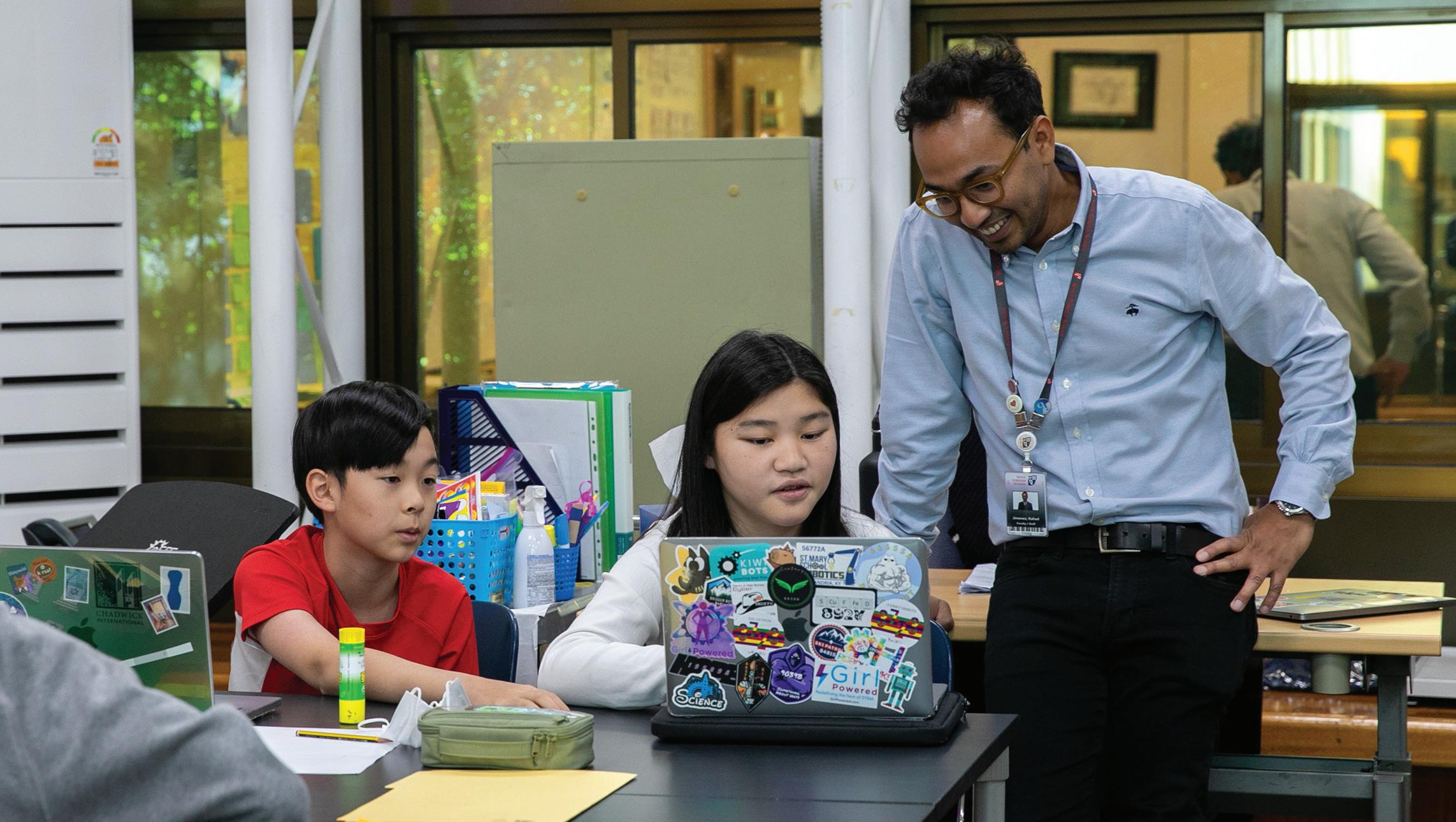
• Novak, K., & Couros, G. (2022). UDL now!: A teacher's guide to applying universal design for learning (3rd ed.). CAST Professional.
• Practical Tools to Help You Implement Universal Design For Learning. (2020). Novakeducation. https://www.novakeducation.com/resources
• The Universal Design for Learning Guidelines. (2008). Cast UDL Guidelines. Retrieved March 18, 2023, from https://udlguidelines.cast.org/
17 Spring 2023 | Feature
19 12
A DIVE INTO INNOVATIVE APPROACHES IN THE ELEMENTARY SCHOOL
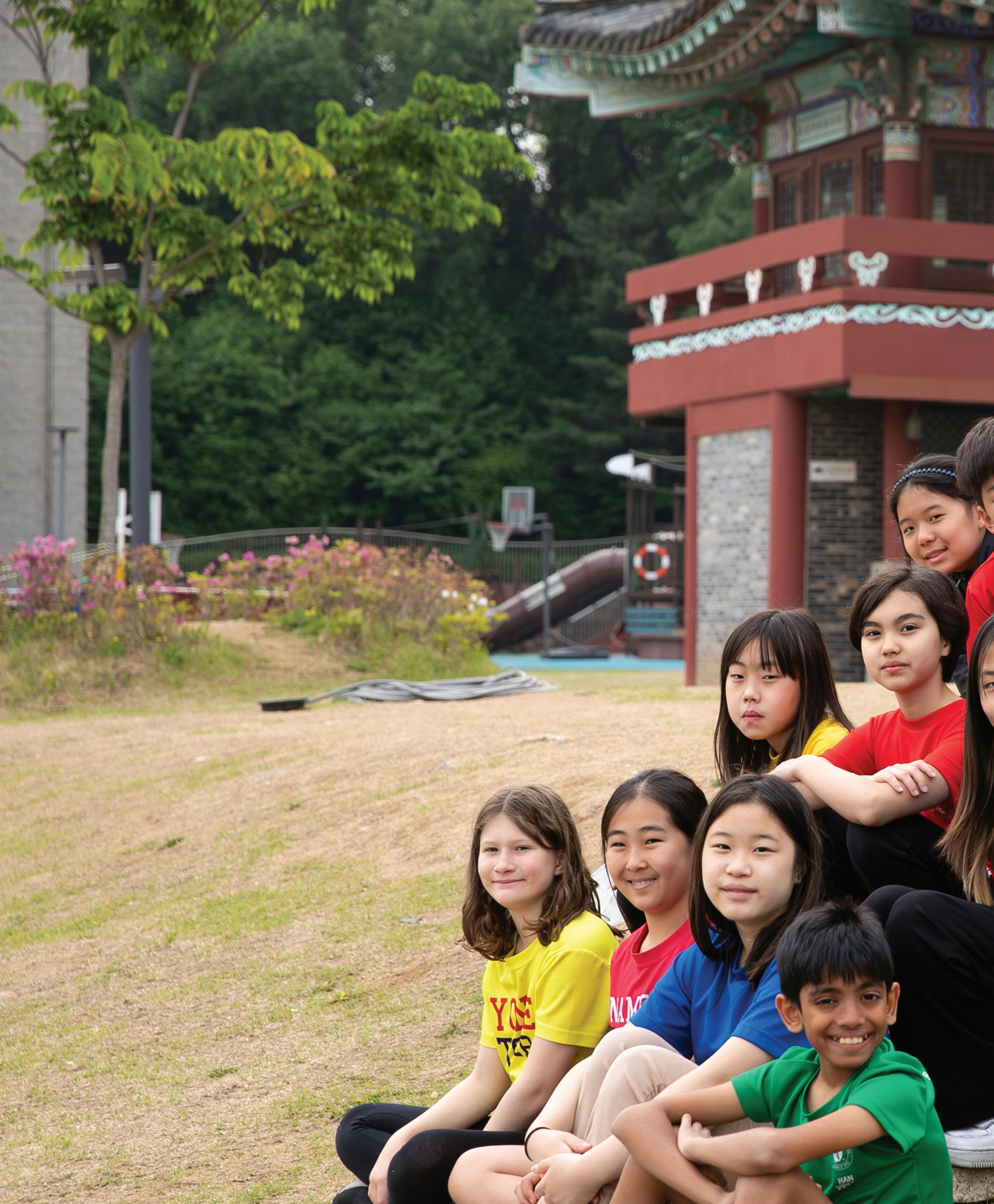

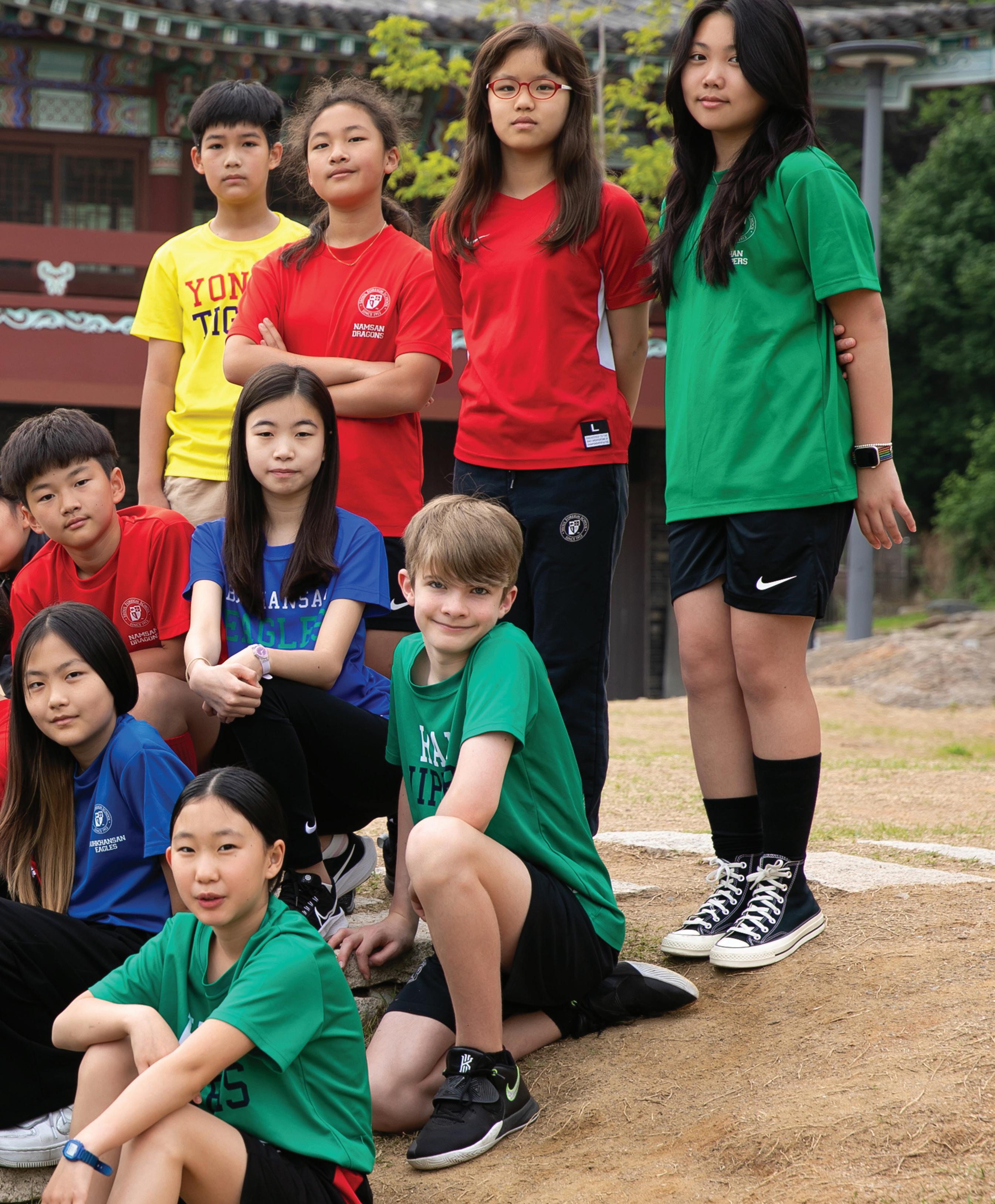 Elementary School House Captains
Elementary School House Captains
Unlocking Math Potential: The Curriculum Review Process in the Elementary School
By Michael Lucchesi PYP Coordinator
Seoul Foreign School is continually striving to ensure students are growing and achieving socially, emotionally and academically. One way the school approaches this is through a curriculum review. In general, the curriculum is composed of a variety of subjects and outlines what and how they will be taught. Together they shape the educational experiences of all students at SFS. More specifically, the curriculum contains a standards-based sequence of planned experiences in each subject and grade level describing what is essential for teaching and learning such as the content and applied learning skills students need to practice with which to achieve proficiency.
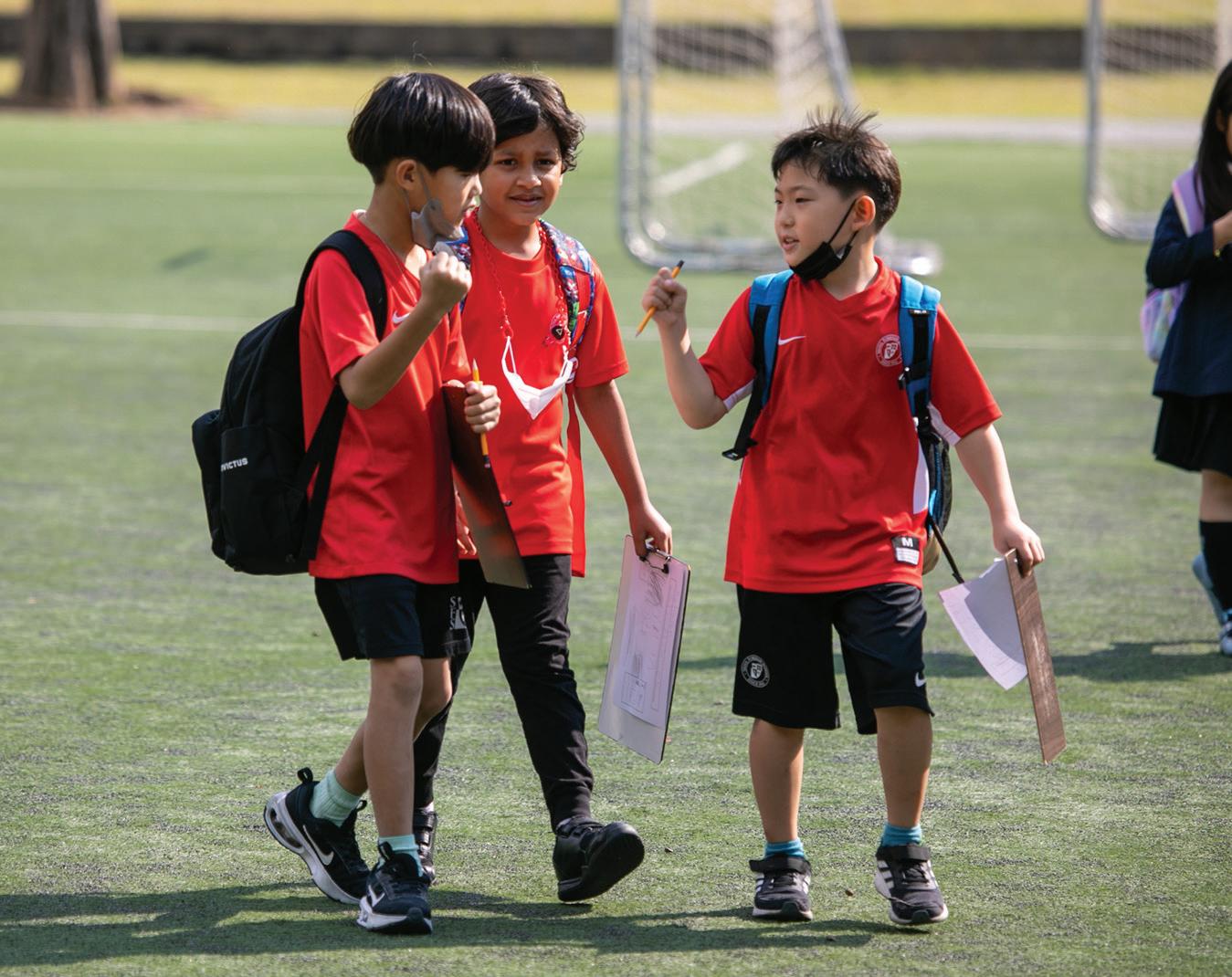
Each curriculum has a natural cycle of existence. This curriculum review and development cycle is a systematic procedure involving the whole school to collect information necessary to make timely, data-based, best practices decisions about curriculum to meet the needs of students.
Schools around the world that set a goal of engaging students with relevant, significant and rigorous learning experiences will have a curriculum review cycle in place as it’s long been considered best practice and vital to a school’s core function of helping students grow and achieve. “I want to be as emphatic as possible,” notes Dr. Michael Schmoker, educational author and consultant, “the impact of the actual, taught curriculum on school quality, on student learning, is indescribably important!”
According to a meta-analysis of factors that affect student achievement, educational researcher Robert Marzano noted in What works in School: Translating Research Into Action, “...the number one factor that impacts student learning is what gets taught and how it gets taught… .”
For the past year, the Elementary School faculty and administrators have been analyzing our current approaches to teaching math as well as our math resources with the focus on positioning our students for math success by supporting their development of proficient number sense, a deep conceptual
understanding of math practices, self-confidence in their math ability, and to enjoy the journey of becoming mathematicians!
To assist us in the review a math consultant was brought on board to lead the discussions, data gathering, faculty and parent interviews/surveys and analysis. Specifically, this process included reviewing a variety of math curricula, resources, and pedagogical approaches and best practice for numeracy teaching and learning.
At the end of our review process, Elementary School staff and administrators consulted a final report to guide our discussions and help us determine the best path forward with math. We are excited to share that we have decided on the following approaches and resources for math instruction with official implementation in August 2023:
• Adoption of ZEARN (further details below) as the core resource for math teaching and learning (this will replace Math in Focus)
• Supplemental resources include: Jo Boaler’s Mindset Mathematics, Sherry Parish’s Number Talks, Math Investigations by SAAVAS and Bridges in Mathematics by The Math Learning Center will be incorporated into our program
• Continued alignment to the Common Core State Standards
We have already started taking steps to ensure our teachers and students will have a smooth transition to Zearn, such as an early adoption of resources and components of the new program and professional development with our consultant to develop consistency in our approach to teaching math (similar to the literacy workshop approach).
Additionally, during our recent evaluation visit, these plans were shared with the WASC and IB visiting teams. They congratulated us on a comprehensive review process and were impressed by teacher enthusiasm for the direction mathematical learning is heading in the Elementary School!
20 The BANNER | Feature
Empowering Young Leaders: The Many Opportunities for Elementary School Students
Damian Prest Elementary School Principal
Leadership in the Elementary School takes many forms. Along with opportunities for teachers to practice their leadership skills as grade-level leaders and committee chairs, students also have opportunities to pursue their curiosity about what it means to be a leader. Overall, there are 31 leadership positions students in grades 4 and 5 can pursue!
At the start of each school year, upper Elementary students can apply to be a member of the Student Ambassadors, Class Representatives, House Leaders or Service Leaders. Once elected/ appointed, the expectation for students sitting on these four teams is to grow their leadership skills as they work together to positively impact the school community. Each team of student leaders are supported by assigned staff members.
The importance of providing students with leadership opportunities is twofold. First, it’s vital for students to exercise their voices to help shape the direction of their school! Second, student leaders gain invaluable experience developing a multitude of skills throughout the school year, such as:
• Practicing leadership skills like communication, teamwork, decision-making, problem-solving and goal-setting
• Building confidence and self-esteem by taking advantage of opportunities to lead and then feeling a sense of accomplishment.
• Fostering responsibility because being a leader requires a certain level of personal accountability
• Creating a sense of community because of the teamwork necessary to achieve a common goal
• Improving communication skills by practicing different the many ways student leaders share information with peers, teachers and other stakeholders
• Developing critical thinking skills by analyzing and evaluating
problems and solutions as well as making decisions that impact many
What leadership roles are available for students? Students have four different opportunities to choose from when considering leadership opportunities. There’s the Student Ambassador Cabinet, which has four positions: President, Vice President, Secretary, Historian. Grade 5 students apply and are interviewed. They then create and record a speech for their grade 5 peers to view just before they cast their votes.
Another opportunity to be part of the Student Ambassador team is to be a Class Representative. One student is chosen by their classroom peers to represent each of the eight grade 4 and 5 homeroom classes. Their main role is to support the Student Ambassador Cabinet with communicating ideas, gathering information and helping to implement initiatives.
House Leaders are the remaining ways students can practice their leadership skills. With each student in a House at SFS, the Elementary School seeks 16 students to work with that year’s House Leader teachers to build up school spirit through activities that promote teamwork, fun and school spirit. Examples include the House Disco dance event and Spirit Week in which students wear different themed outfits or House colors.
Service Leaders are the smallest (a team of three!) yet mightiest of the student leadership groups because they are the official student representatives of the school’s service committee with the purpose working with organizations that all of SFS has partnered with to help in our community.
As educators supporting the growth and development of children, we continuously focus on ensuring that opportunities for students to have an influence and make a difference in the safe setting of the Elementary school will hopefully empower them to become involved as leaders in their other communities now and in the future!
21 Spring 2023 | Feature
yonsei
The four houses: Han Vipers, Namsan Dragons, Yonsei Tigers, and Bukhansan Eagles.
How we approach pastoral care in the Elementary School
By Brian Webb Assistant Principal, Elementary School
When children make poor choices, it’s generally not because they are trying to harm or disrupt the wellbeing of others or because they are “bad kids,” but because they are simply trying to meet a personal need, albeit in a negative way. “Children’s behaviors are determined, for the most part, by how they feel about the current state of their physical and psychosocial needs.” (Haiman, 1998).
Research shows that because children often don’t know how to ask for help or have not developed positive strategies to fulfill their needs, they can turn to negative behaviors. Therefore, along with supporting a child’s academic growth, we aim to educate the whole child by also focusing on helping them grow socially and emotionally. We understand that emotions can be very powerful, and when an upsetting situation occurs, learning is halted until the issue is resolved.
Many incidents of misbehavior are signs of children trying to meet their own needs or trying to attract the attention of an adult. To this end, because we believe school is an environment where it is OK to make mistakes, we aim to equip students with tools to help them manage the intense and challenging experience of making mistakes. The most common? Verbal and/or physical incidents in younger children at recess, which is a time of heightened creativity and energy!
To best support our students, we provide a variety of structures to help them 1) understand and develop positive life habits and 2) recognize how sometimes their choices can negatively affect others.
More specifically, here are some overarching ideals and practices we believe provide our students with opportunities for social and emotional growth and development:
• Connect the SFS Christ-Like Attitudes and the PYP learner profile (aspirational positive characteristics)
• Support and provide a comprehensive and socially responsible curriculum
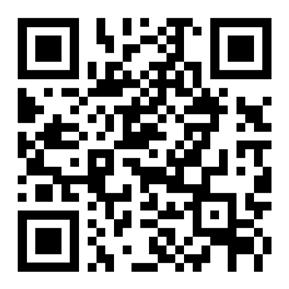
• Model positive behaviors
• Use Restorative practice to support student behavior
• Believe in dialogue to support students in understanding how their actions impact others
• Provide a framework that encourages supportive and healthy relationships with students, teachers and parents.
• Provide flexible structures that are responsive to the needs and well-being of the school community
• Create an environment in which people interact with each other in a manner that recognizes each person's self-worth and promotes a sense of belonging and well-being
• Foster high-quality interpersonal relationships among teachers, parents, students and other members of the school community.
• Work with students, parents and teachers in partnership to resolve conflict situations
• Use natural consequences where appropriate when students are not being responsible, respectful or safe
What we don't do is use a punitive approach.
We recognize some students may need individualized support to assist them in becoming positive members of the class and help them in dealing with individual challenges. This support may need to be ongoing and be designed to meet agreed-upon goals. Here are four structures we have in place to help develop our students’ understanding and practice of being a positive contributor to their school/class community:
Structure #1- Christ-Like Attitudes and the PYP learner profile
Each month, we deepen our understanding of one Christ-Like Attitude by exploring its meaning through reading, discussion, curricular connections and a monthly Chapel (assembly) led by a grade level.
Additionally, the PYP learner profile is applied throughout the school in Pre-K 2 to Grade 5 homerooms and specialist classrooms. We continually create a bridge
between the Christ-Like Attitudes, the PYP learner profile and how we apply ourselves as positive contributors to our community (home, school, sport, arts, etc.)
Structure #2- The 3 Bs
The Elementary School has guidelines in place for student behavior expectations in and around the school. The poster at right is visible using the QR code on the right.
22 The BANNER | Feature
Structure #3- Social-emotional Learning (SEL) curriculum
Along with supporting students with academic context and expectations for developing skills and understanding, it is vital that students also develop the skills they need to thrive in school and in life. Studies show social-emotional skills can help improve academic performance, reduce negative social behaviors, such as bullying, and create more positive classroom and school climates. Through SEL, students can build their competence and confidence to take on learning challenges, make good decisions, manage strong emotions, and get along with others.
The Elementary School counselors deliver a social-emotional learning curriculum to students in Kindergarten through Grade 5 called Second Step. The program includes four units with five lessons per unit, for a total of 20 lessons per grade. The unit themes are consistent across all grades and the content evolves to align with students’ developmental stages.
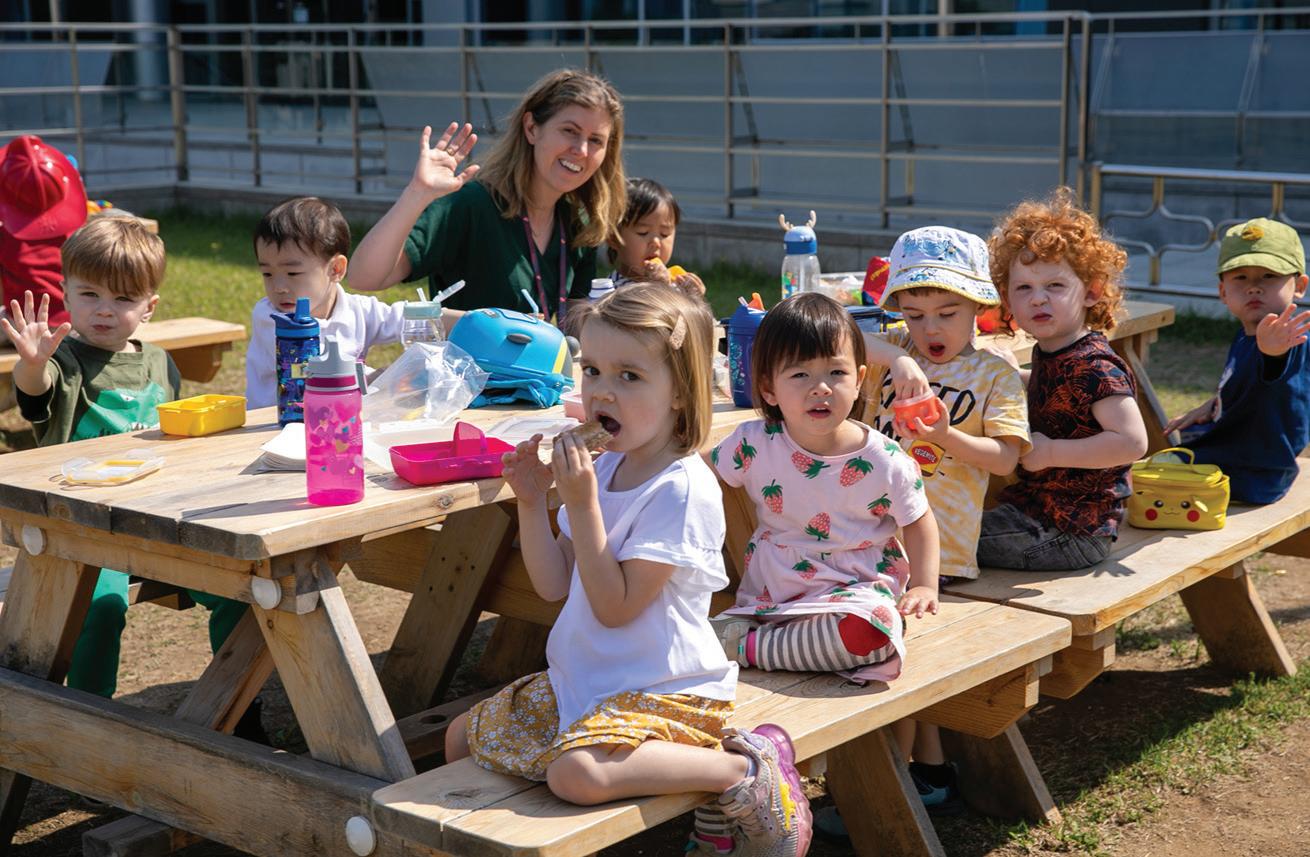
• Unit 1: Growth Mindset & Goal-Setting
• Unit 2: Emotion Management
• Unit 3: Empathy & Kindness
• Unit 4: Problem-Solving
• The K-5 scope and sequence can be reviewed using the QR code on the right.
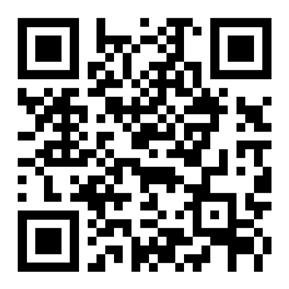
Structure #4- Restorative practice approach
It is important to understand conflict is an inevitable part of life. How we work to resolve conflict impacts a school’s climate and culture and ultimately students’ social and academic outcomes. Schools need to be safe places where young people can learn and thrive in a supportive, enriching environment.
Restorative practice is a teaching and learning approach that promotes self-regulation and encourages behavior that is supportive and respectful. It puts the onus on individuals to be truly accountable for their behavior and to repair any harm caused to others as a result of their actions. The process involves thoughtful listening by all involved along with a series of thoughtprovoking questions by adults.
It’s more than a series of questions, though. It is a nonpunitive approach that accepts that we all make mistakes and have the ability to ‘fix’ the problem together and learn from our experiences. Restorative practice is inclusive and concerned with maintaining and building connectedness between students, parents, teachers and the community. It is an essential component of well-being.
When schools are restorative they:
• Value quality relationships
• Model empathy and respectful relationships
• Value student voice and utilize collaborative problem-solving
• View inappropriate behaviors as opportunities for learning
• Apply procedural fairness
• Recognize the importance of repairing damaged relationships
• Separate the ‘deed’ from the ‘doer’
• Use active listening and positive language and tone
• Avoid scolding, judging, lecturing or blaming
• Foster self-awareness in the student
• Implement consequences that are proportional and fair
• Remain future-focused
While upholding participants’ dignity and addressing human needs, the restorative practice process encourages and empowers participants to discuss their experiences openly and honestly and to collaboratively determine what needs to be repaired. The principles of restorative practice are:
• Respect- shared/given to all participants involved in a restorative practice process
• Inclusiveness- consensus and full participation of those affected by the incident
• Cooperation- working together towards a common goal/ resolution
• Responsibility- the person responsible for the harm takes responsibility for his/her behavior
Restorative practice, with an emphasis on respect and relationships, can help young people learn positive strategies for dealing with conflict while understanding and taking responsibility for the impact their negative behaviors have had on those around them. 19 12
23 Spring 2023 | Feature
PreK-2 students enjoying their snack outdoors.
MYP & DP DESIGN THEN AND NOW!
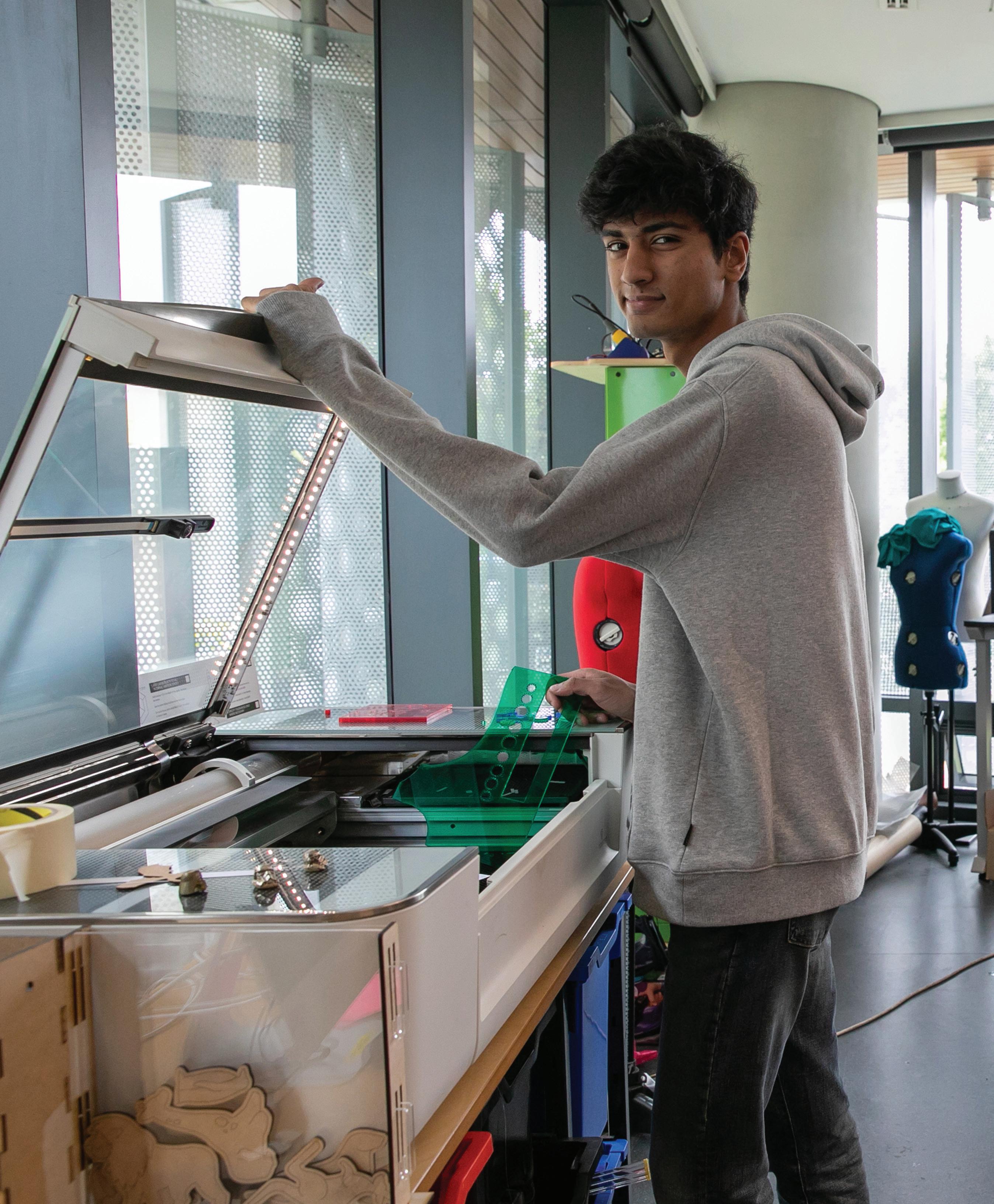 By Brigitte Parr Head of Design
By Brigitte Parr Head of Design

DP Year 1 students in the High School Design Lab.
While this approach provided a diverse and enriching experience for students, the addition of these specialist design teachers marks an exciting time for the design program, as it will allow for an even more focused and comprehensive instruction for students.
Design has evolved significantly at SFS since its inception with the IB Middle Years Programme. As one of the eight subject groups offered by the IB MYP, design is an integral part of the curriculum.
Initially, the ‘Little Theatre’ in the Middle School on the ground floor was transformed into a single large design space. However, it has now been divided into three separate design spaces, all located in the same area. Within these spaces, students have the opportunity to work with various materials, including textiles, wood, and food, to create tangible products and solutions that address specific needs and problems. These product design courses utilize the design cycle to solve problems through the use of tools, materials, and systems.
In grade 6, students engage in teacher-led design challenges, where the problems and needs are contrived. However, by grade 10, they independently explore complex real-life problems, which are mostly based on the United Nations' sustainable development goals.
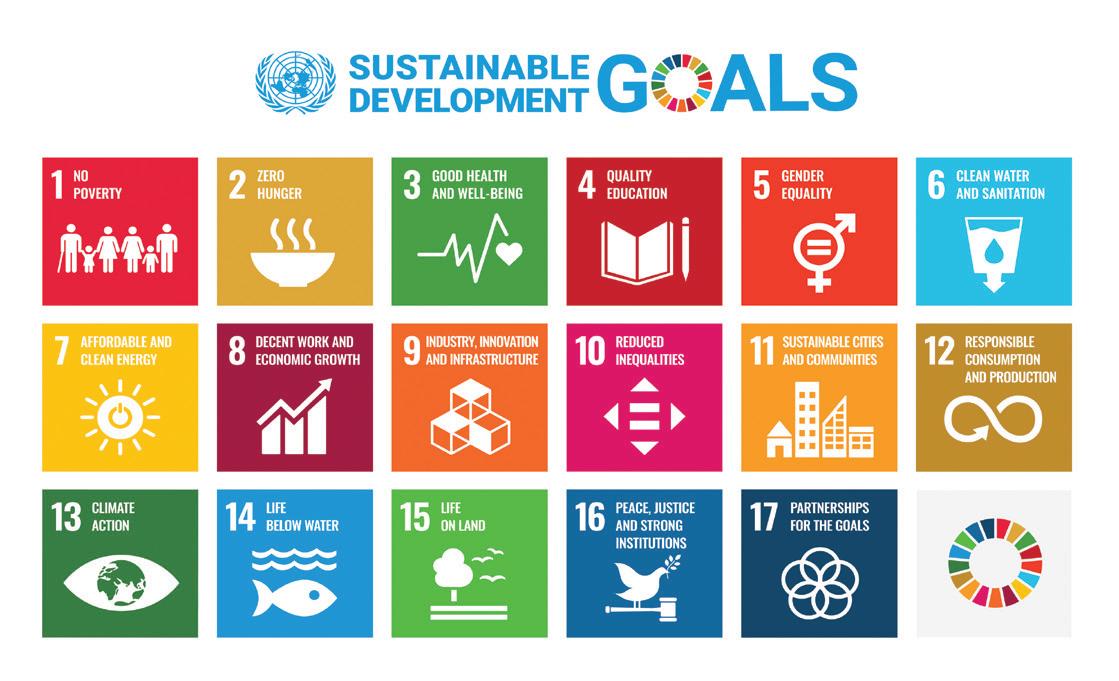
Combined digital and product design courses are also offered where knowledge, skills, techniques, and materials of both digital and product design are used to develop products and solutions.
The High School also has three design spaces, two product design and one digital design spaces. Recently, DP Design and Technology was introduced, which has been highly successful and provides a direct pathway for students who wish to pursue DP Design and Technology.
For the upcoming academic year, the school has hired three Middle School design specialist teachers, it is therefore timely to express great appreciation to the Middle School teachers for their tireless dedication and perseverance in teaching design. Until now, all Middle School teachers were responsible for teaching design. While this approach provided a diverse and enriching experience for students, the addition of these specialist design teachers marks an exciting time for the design program, as it will allow for an even more focused and comprehensive instruction for students. This change will further enhance the quality of education and experience that students receive in design.
The school looks forward to continuing to expand and enhance the design programs to foster student creativity, innovation, and problem-solving skills.
19 12
26 The BANNER | Feature
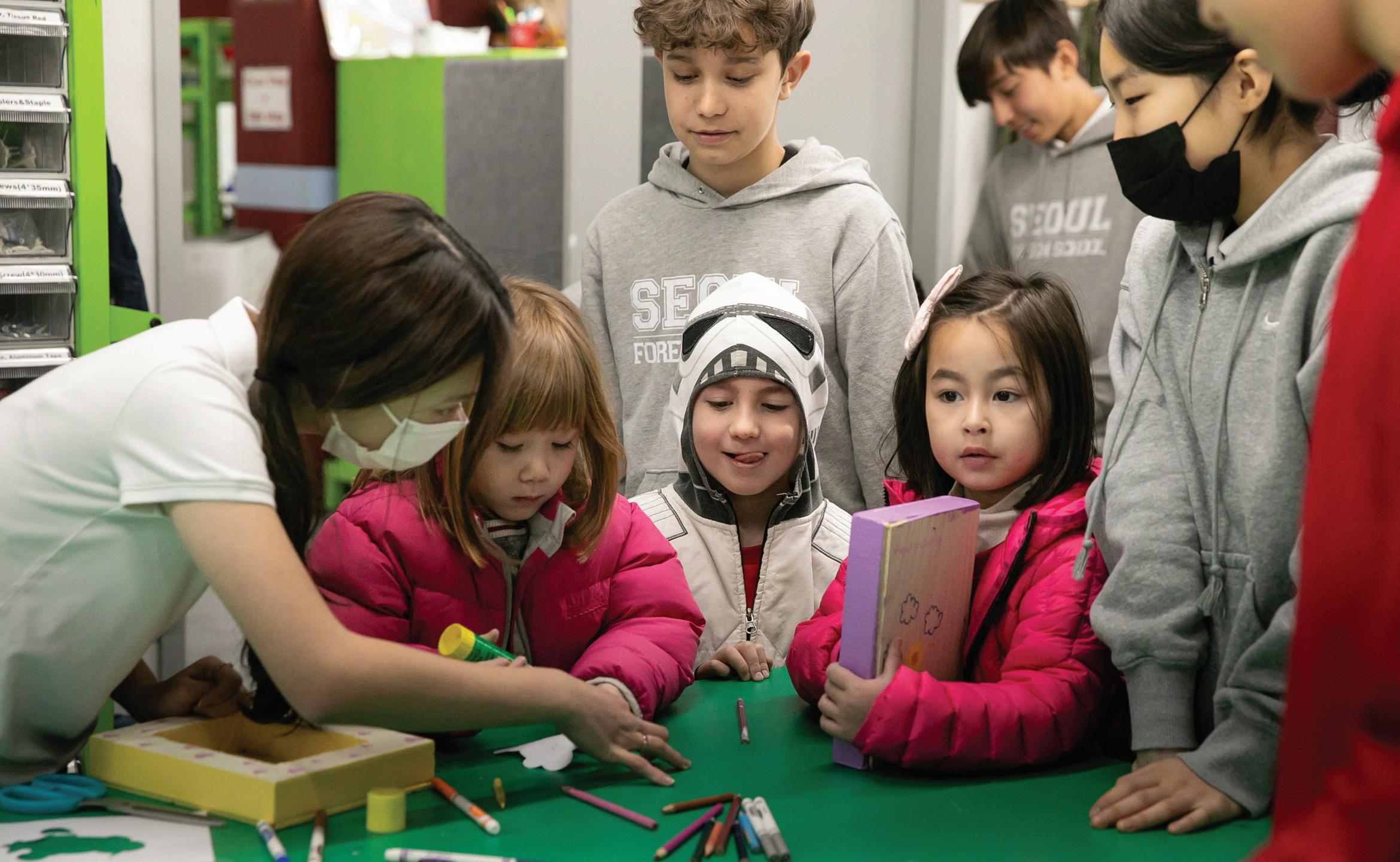
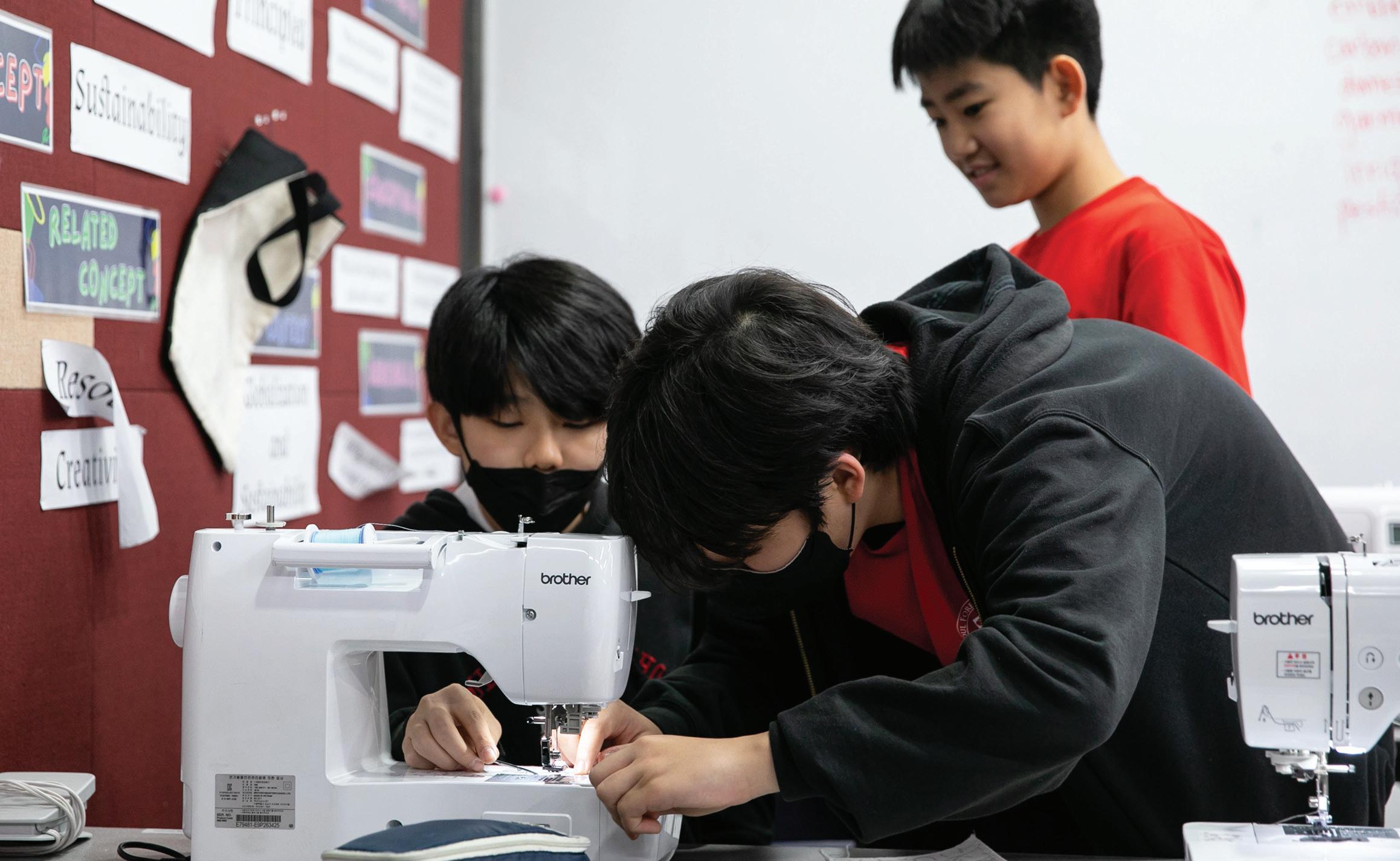
27 Spring 2023 | Feature
(Above) Grade 7 students collaborating with PreK-4 students in the Middle Years Design Lab.
(Below) Grade 8 students learning to make zippered pouches.
THE NEXT CHAPTER IN THE BRITISH SCHOOL: COLLABORATION, SUCCCESS

& BELONGING
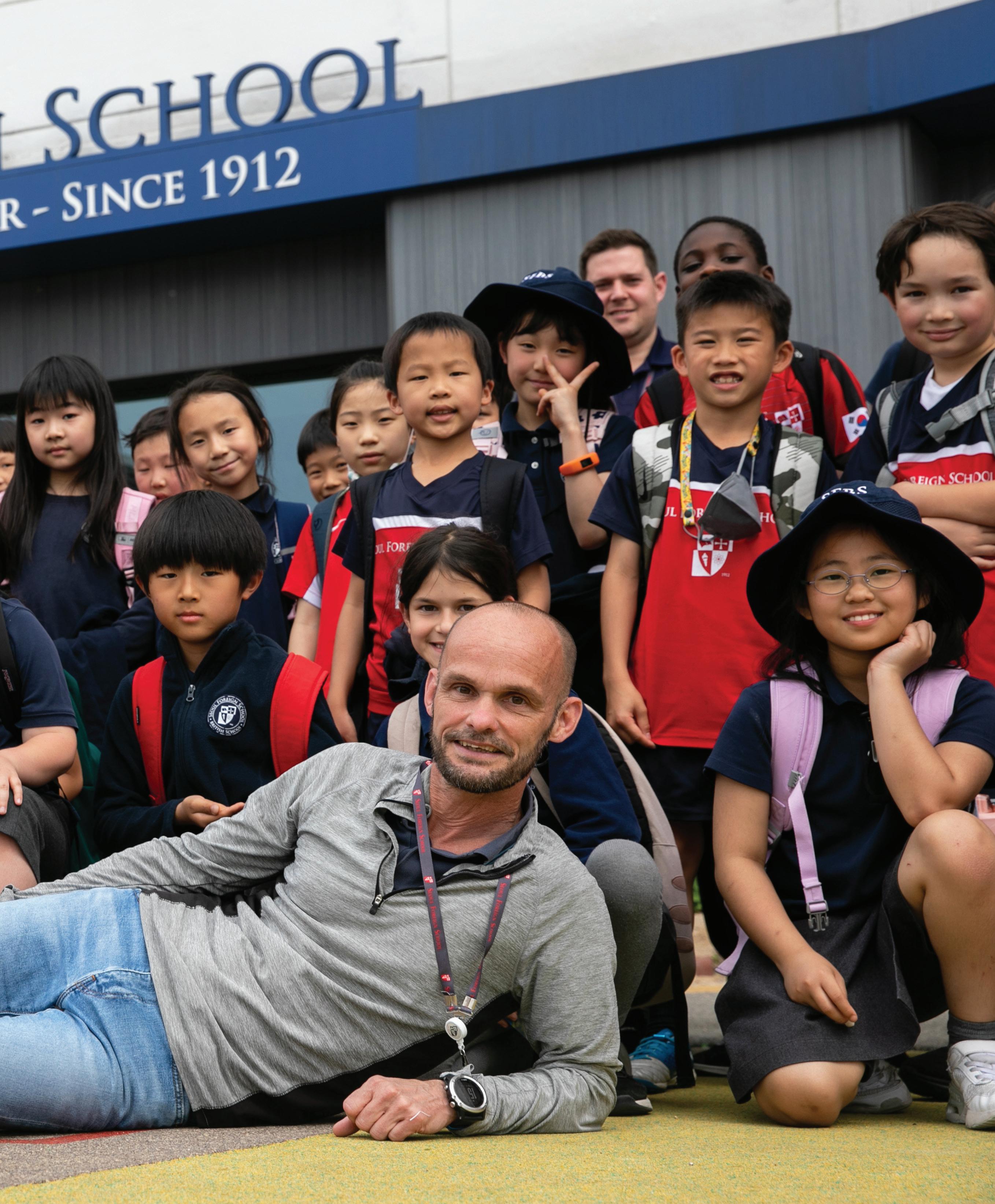
Seeking Success and Finding Belonging
By Andy Freeman British School Principal
In my last article I talked about the word community and what it meant for us at the British School, and what it meant to have it back. With a community returned for almost a year now, Mr. Kett and I have already started looking at what The Next Chapter looks like for us based on what we experienced this past year, what we think is important for our community in the future (wherever they go) and what we need to start planning now to support them.
What I noticed most with the return of our community is that each member has experienced it differently. This is because we are individuals who are looking for our place in it, be it as a teacher, a Foundation student, a Teaching Assistant, a Year 9 student, a parent, an administrator, a leader or a Parent Association representative. Some of the experiences of each of our members has been positive and others a challenge; that’s community.
I have also seen that each of these individuals are seeking success in some form. The success they seek is unique to them, their personality, their interests, their previous life experiences and their external influences(ers). Some [parents, staff and children] want to be successful in making new friends in new situations. Others want to be successful in making a difference to new communities. There are some who are seeking success by making a difference to themselves. And there are those who may not yet know what success they seek.
Regardless of who the individual is or what success they seek,
it is our job as a school to do two things. The first is to inspire each to their own success. Help each person find what it means to ‘be their own successful’. This could be a parent connecting with an organisation beyond the school campus to find a role they can play in Seoul. It could be a child in Year 1 participating in and enjoying a playdate for the first time now that they are able to speak English. Success can mean so many different things.
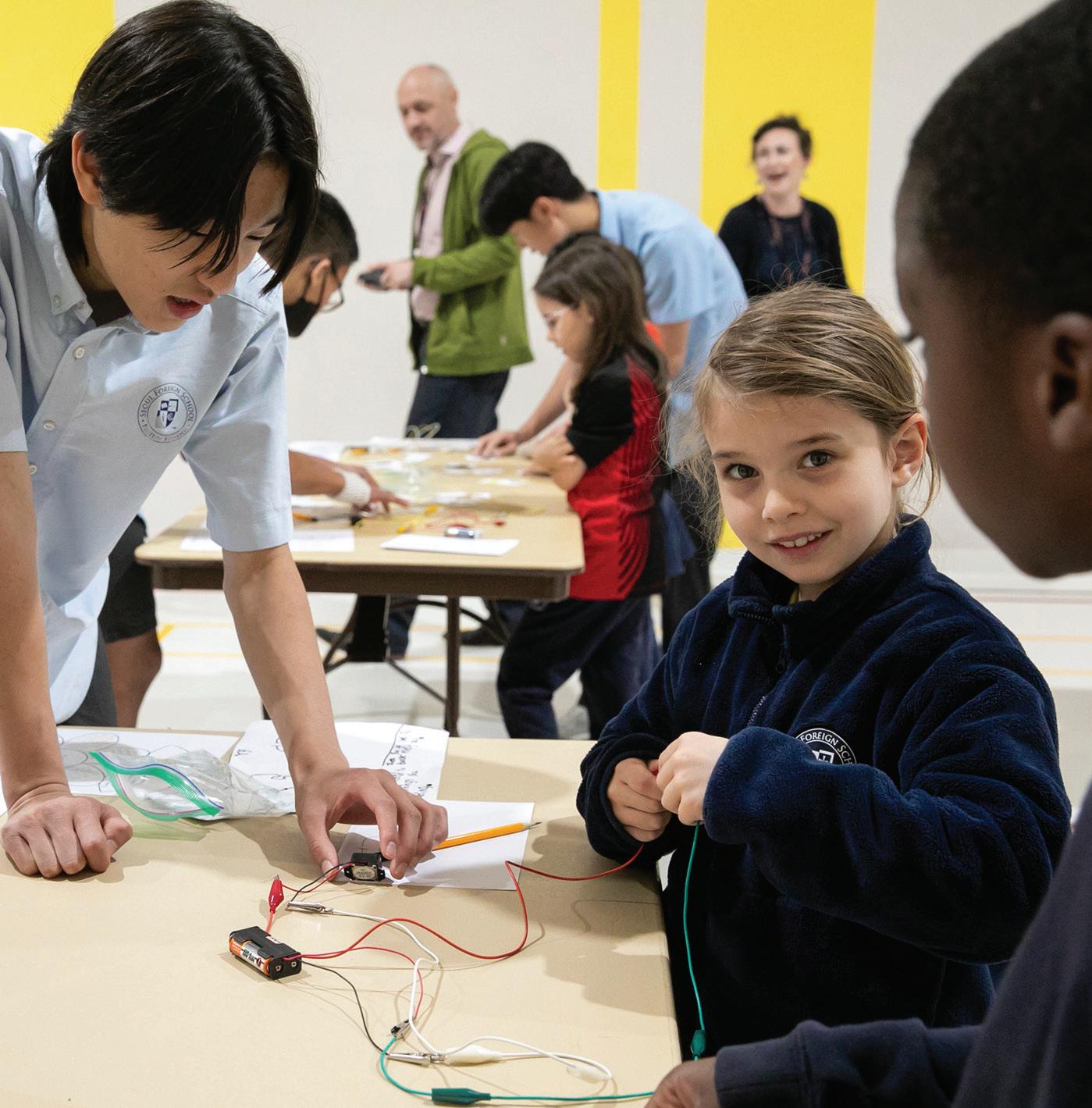
Our second job as a school is to nurture a community where each individual feels belonging. This is a challenge in an international setting, more so when people come from different experiences as a result of the pandemic. However, I truly feel our core values help. They provide a shared belief that we can each draw on to create and nurture a culture of belonging for each person we meet, each day. Allowing each person to be their true, authentic self, and allowing us to accept each other for who they are and what they do.
Writing The Next Chapter, as you can see, is not easy. It is complex. It is a chapter with over 300 characters, 100s of locations, and tens of thousands of plots. What is at the centre of it though is that we have inspiring [individual] success and feeling [individual] belonging at the centre of all decisions we make going forward from this point. It is the core of our design blueprint for sure and we are starting to author with this in mind. Ghost writers are welcome too… apply here with your script ideas: andrew.freeman@seoulforeign.org
30 The BANNER | Feature
Belonging: true self. Authentic: you, we, me, us. Nurture. Belong. Be.
(Andrew Freeman: March 2023)
Pinpoint:
Is the focus simple and to the point?
Not too big and not too small?
Thinking outside the box: Provocative Pokes
By John Kett Assistant Principal, British School
Others:
What impact (positive or otherwise) might this poke have on others? The team? The students?
The parents? Leadership? Does the planning template capture these benefits/ challenges?
Keep the end in mind:
Is the intended outcome clear? When might it come to an ‘end’?
What evidence/measures will I have?
provocative adjective causing an angry reaction, usually intentionally
Evidence:
How will I know what the impact has been?
Ilove the Provocative Poke structure we have developed at the British School. Its roots lie in what the staff said they love most about the British School and the core values of the British School are woven into the template that teachers use to structure their Pokes.
That said, there is one value above all others that I particularly attribute the current successes of Provocative Pokes tocollaboration.
When I reflect on why other change initiatives may not have had the desired impact in the past I recognise it is due, in some part, to a lack of opportunities to collaborate on ideas and goals over the long term. Schools are sociable places and professional discussion provides one of the richest opportunities for teachers to reflect, refine and develop their ‘Pokes’ - approaches and strategies to develop their teaching practices to best support all learners in their classes.
Dedicating regular time to Provocative Pokes in our British School and departmental meetings has certainly helped maintain the momentum of this approach to professional learning. For me, this is one way in which we build the culture of the schooldedicating time to value the things that matter most.
Without a doubt, the best thing about Provocative Pokes is the collaborative conversations I have seen teachers having these not just with teachers who teach the same age group or subject discipline but across Key Stages. For me, this is at the heart of The Next Chapter - collaboration that builds mutual respect, collective responsibility and enables staff to take courageous steps to develop elements of their practice for the benefit of our students.
Andy Freeman and I had the privilege of presenting about Provocative Pokes at a Fobisia EJAWs event on 10th March. If you’d like to hear more about it, please contact us, or speak to a teacher at the British School.
31 Spring 2023 | Feature
19 12 (Opposite) Year 2
Year 9
students collaborating with
students for their Unit It's Shocking.
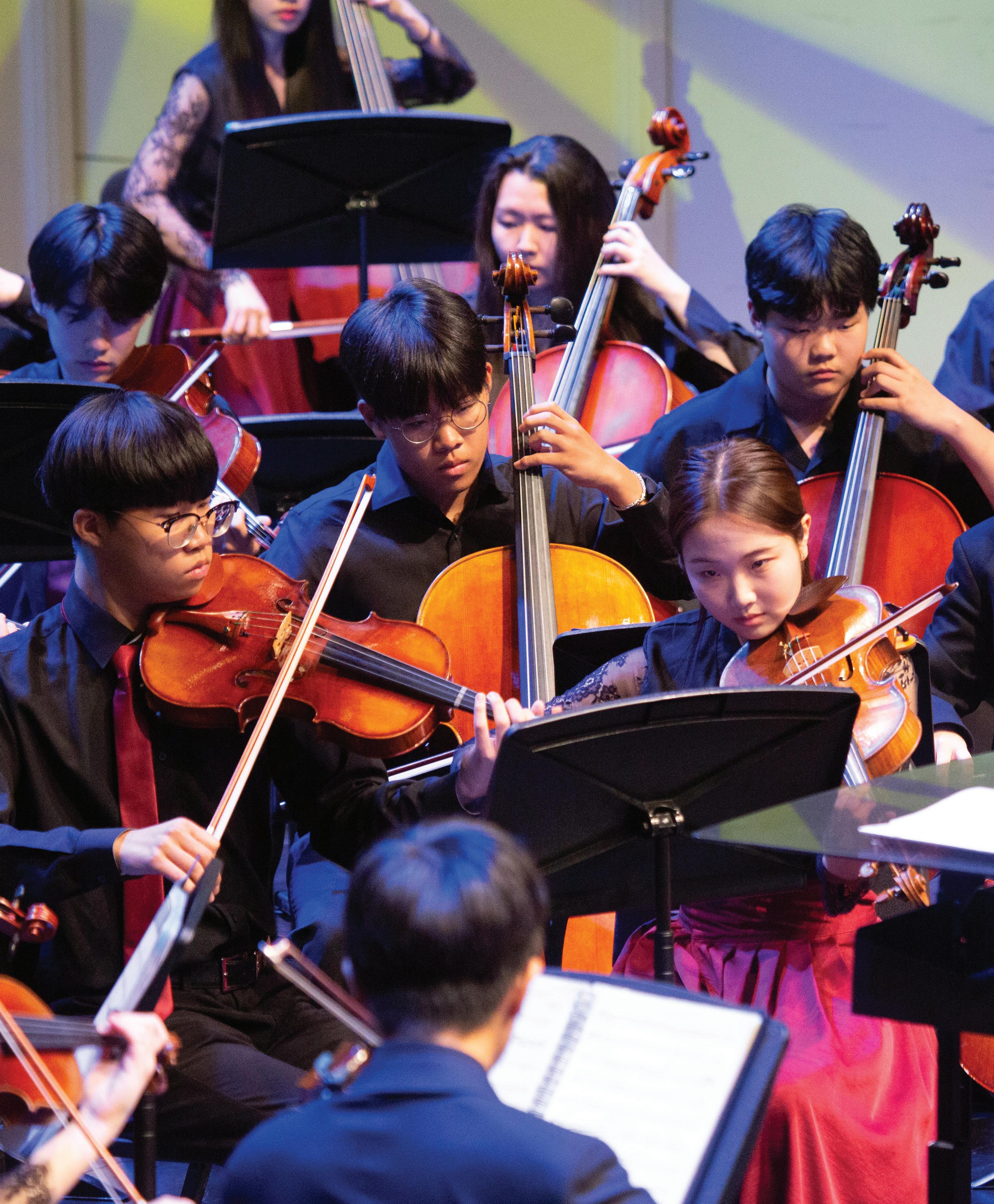
High School String & Choir Concert
Tri-M SFS: Celebrating Our High School Musicians Post-Covid
By Emmalee Johnson
IB Music and High School Orchestra Teacher
Thelove for music is a common thread among generations of students who have come and gone through the SFS timeline. For many years, The Tri-M Music Honor Society has helped create a diverse community of talented young musicians of all backgrounds and genres in the high school. Tri-M is a program founded by the National Association for Music Education (NAfME). As an honors club, Tri-M recognizes students for their exceptional capabilities in both academics and music. Tri-M SFS is among the 2,100 Tri-M chapters dispersed worldwide. Through performance and community service, Tri-M SFS provides exciting opportunities for high school musicians to share their passion for music.
This year specifically, Tri-M SFS hosted a live winter recital and a virtual Valentines-themed concert, involving over 20 performances combined. It also conducted a service project titled “Tutorials by Tri-M” where members created informational videos about various topics surrounding music, such as “Tips on Improving Sight Reading for Singers” and “How to Hold the Violin”. These videos were shared with the SFS music department to help elementary and middle school music students improve their craft.
Despite a successful season thus far, Tri-M has faced extreme challenges in previous years as a result of the Covid pandemic. As a club that relies heavily on the opportunity to perform, members were hit hard with conditions that prohibited any form of live recitals and even in-person meetings.
Jiah Choe (‘21), former secretary of Tri-M, was faced with the challenge of modifying Tri-M events to fit the Covid protocols during her two years as a senior officer of the club. The pandemic happened in the middle of her junior year, which especially impacted Tri-M as they were starting to expand and reach broader audiences. Plans to collaborate with local hospitals, nongovernmental organizations, Tri-M chapters at other international schools, and other SFS school divisions were put on hold. “It was definitely disappointing at first and a huge adjustment, as we had to figure out how to ensure that this engagement and enthusiasm persisted while continuing to provide opportunities for our members to serve through music,” she says.
Jiah recalls her best memories of being a part of Tri-M were “being able to perform in varying ensembles while serving the community through music”, but Covid had set a limitation to this. However, rather than focusing on the pandemic’s restrictions, she saw it as an opportunity to “[share] hope during challenging times through music.” Taking advantage of the “new normal”, the Tri-M team was able to provide virtual concerts through social media platforms, which made student performances more accessible to a broader audience. “It was really great to see so many students not only performing but also supporting other students through this online platform,” she mentions. She was also able to observe that the increased interest and support from the SFS community “incentivized and encouraged more of our members to submit recordings and participate in our virtual concerts.” Through her efforts, she was able to set new traditions while further emphasizing the universality and connection of music in Tri-M.
Although Tri-M had many setbacks due to COVID restrictions, executive teams quickly adapted to each year’s specific circumstances. Because most service projects were cut off as physical contact and communication were limited, we turned them into virtual projects. During the 2020-2021 school year, Tri-M SFS collaborated with YISS to create a performance video to send to nursing homes. Although we couldn’t organize as many service projects as before, we strived to keep in contact with the community. Additionally, most of the concerts were changed into virtual concerts. Although we could not see the members perform live, we could watch different people show different talents through the screen. Since we had limits on the number of people being in one place, we presented the videos in the morning announcements or Seoul Foreign School newsletters. Fortunately, most tri-m members felt that there was less pressure and anxiety, as performances were virtual as opposed to live, so more members were inspired to participate. Also, we garnered a larger audience, as with the video format, there weren’t obligations or time constraints. Overall, Covid did present difficulties, but we were able to pull it through.
With less covid restrictions moving forward, now is the
33 Spring 2023 | Arts
Arts
time for Tri-M members to blossom and take advantage of the exciting opportunities that a passion for music can bring. The club is thrilled about the prospect of connecting with the local community outside of Seoul Foreign School to provide contributions to those in need. For instance, we are about to launch an instrument drive where high school students can donate unused/outgrown instruments for children in orphanages to use. We are also planning to host performances for nursing homes or care centers in the next school year. Most importantly, we cannot wait to open up our concerts to the entire Seoul Foreign School community to allow more students, faculty, and parents to hear our amazing musicians. Overall, enduring Covid-19 has made our club all the more thankful for the creative freedom we now have to celebrate music.
To learn more about what Tri-M does for the Seoul Foreign School community, visit our instagram @trimsfs or view our website @bitly/trimsfs.
Elin Chun Grade 11
What I like about Tri-m are the opportunities for students to share their musical talents with the SFS community through events like busking or homecoming. Tri-m is a close-knitted club that creates a comfortable and open-minded environment, supporting and encouraging all members to challenge themselves and their abilities. With Tri-m, the SFS community can enjoy the beautiful sounds of music and inspire a desire in others to become musically inclined as well.
Seungha Lee Grade 12
I’ve been involved in making music as a part of singing groups for as long as I can remember: choirs, chorales, and even a cappella groups. What I love most about participating in these ensembles is that we’re able to create an aural masterpiece using nothing but our voices. I find music to be the quintessential reflection of the wonderful diversity of humanity. By combining our unique abilities through music, we’re able to create something magical. It is an environment where our differences expand our capacity.
Zoe Sung Grade 10
The project that I enjoyed most so far was the Tri-M Christmas concert that was performed prior to winter break. In the concert, I performed a Christmas song with a trio of two other members. I enjoyed the process of picking out the song and practicing with my friends as it was satisfying to have a successful performance in the end. We learned a lot about harmonizing and listening to each other when playing especially as it was a trio of three very contrasting instruments.
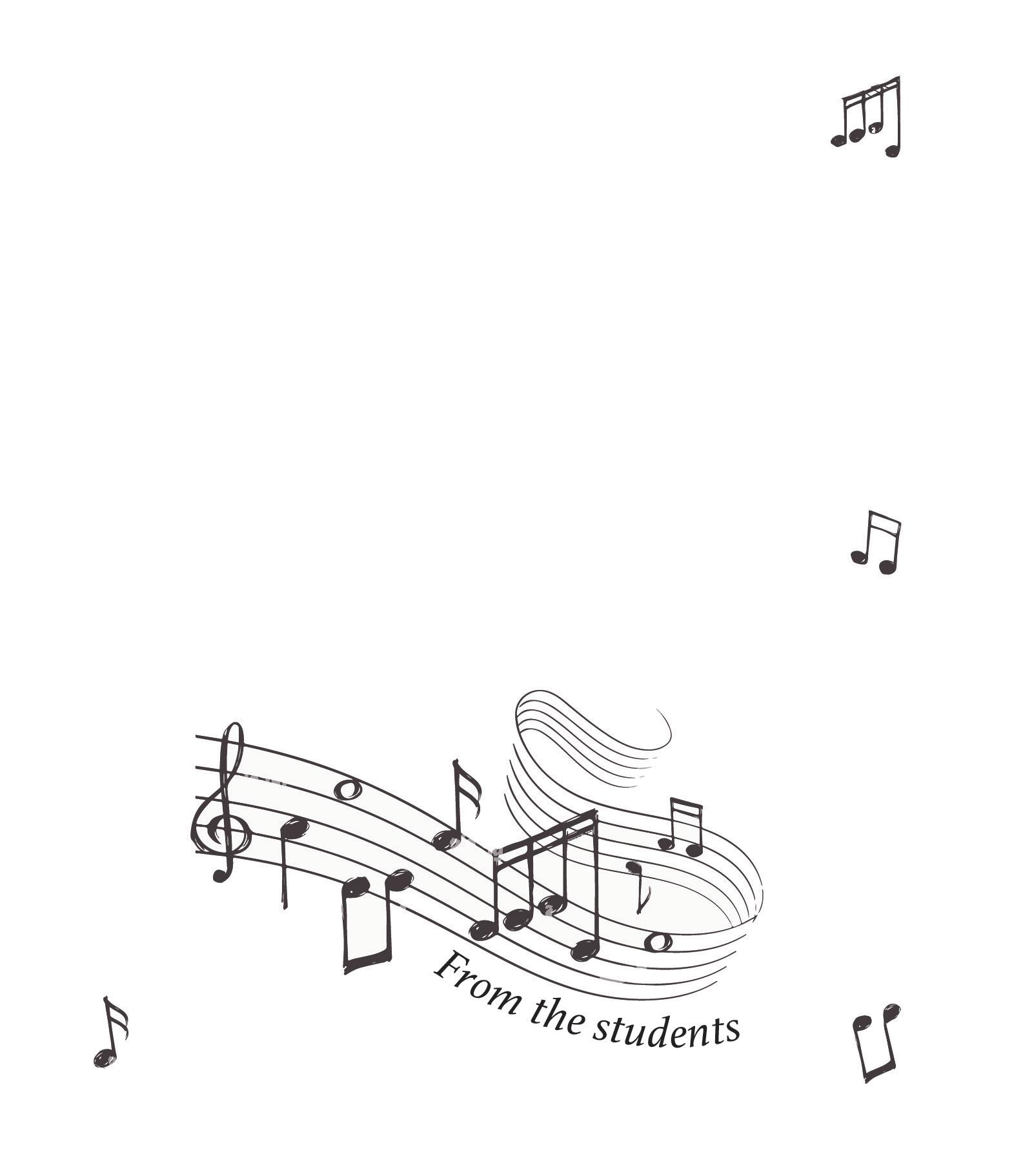
Ian Kim Grade 10
Prior to joining Tri-M, I have seldom performed in front of others, so little to nobody knew about my love for playing the piano and the oboe. However, Tri-M has given me opportunities to not only get over my anxiety of performing in public spaces but to share my incredible passion for music with the school community. I hope that in the future I can continue to be a positive influence and inspire others like me to share their passion for music as well.
34 The BANNER | Arts
Arts
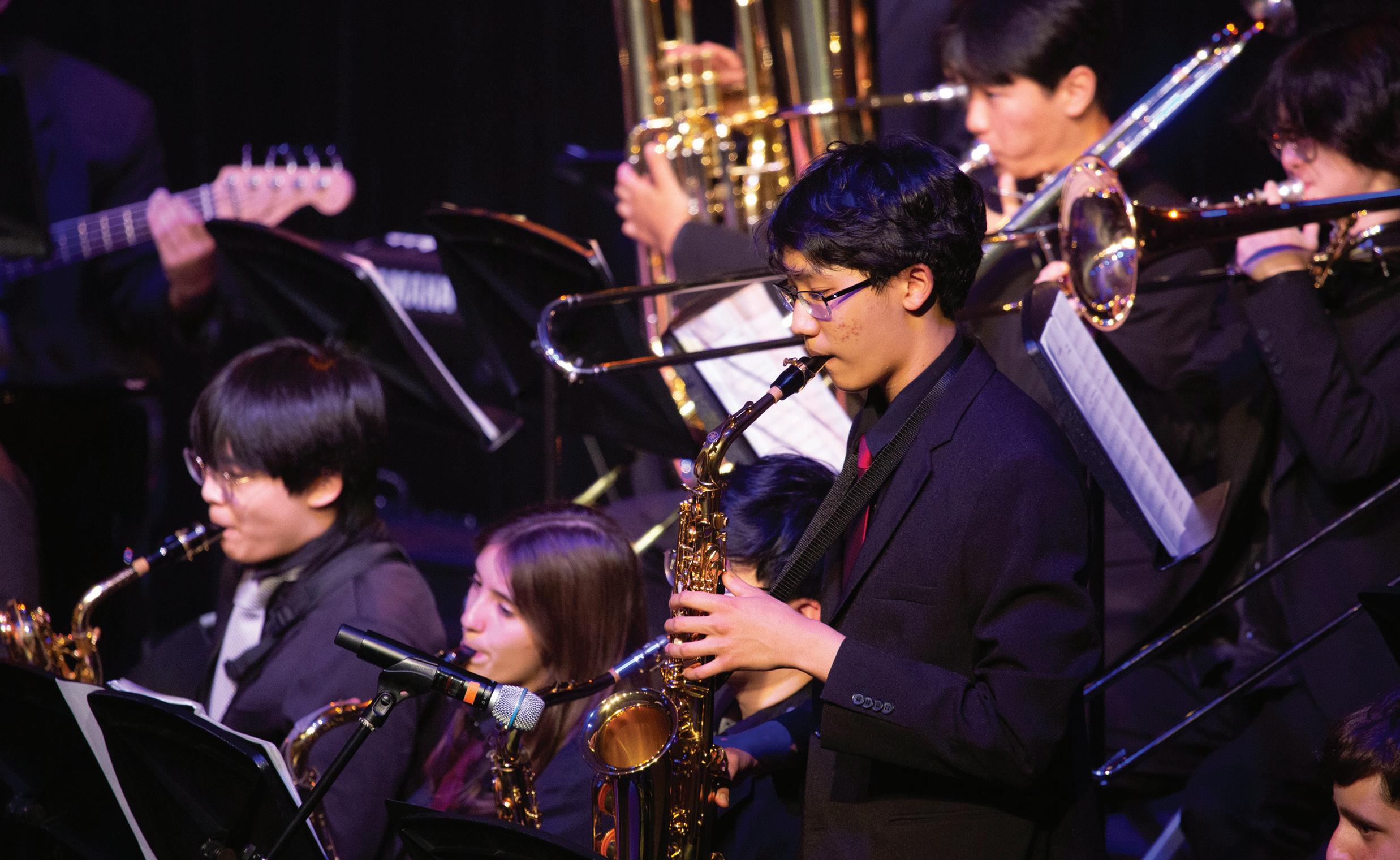
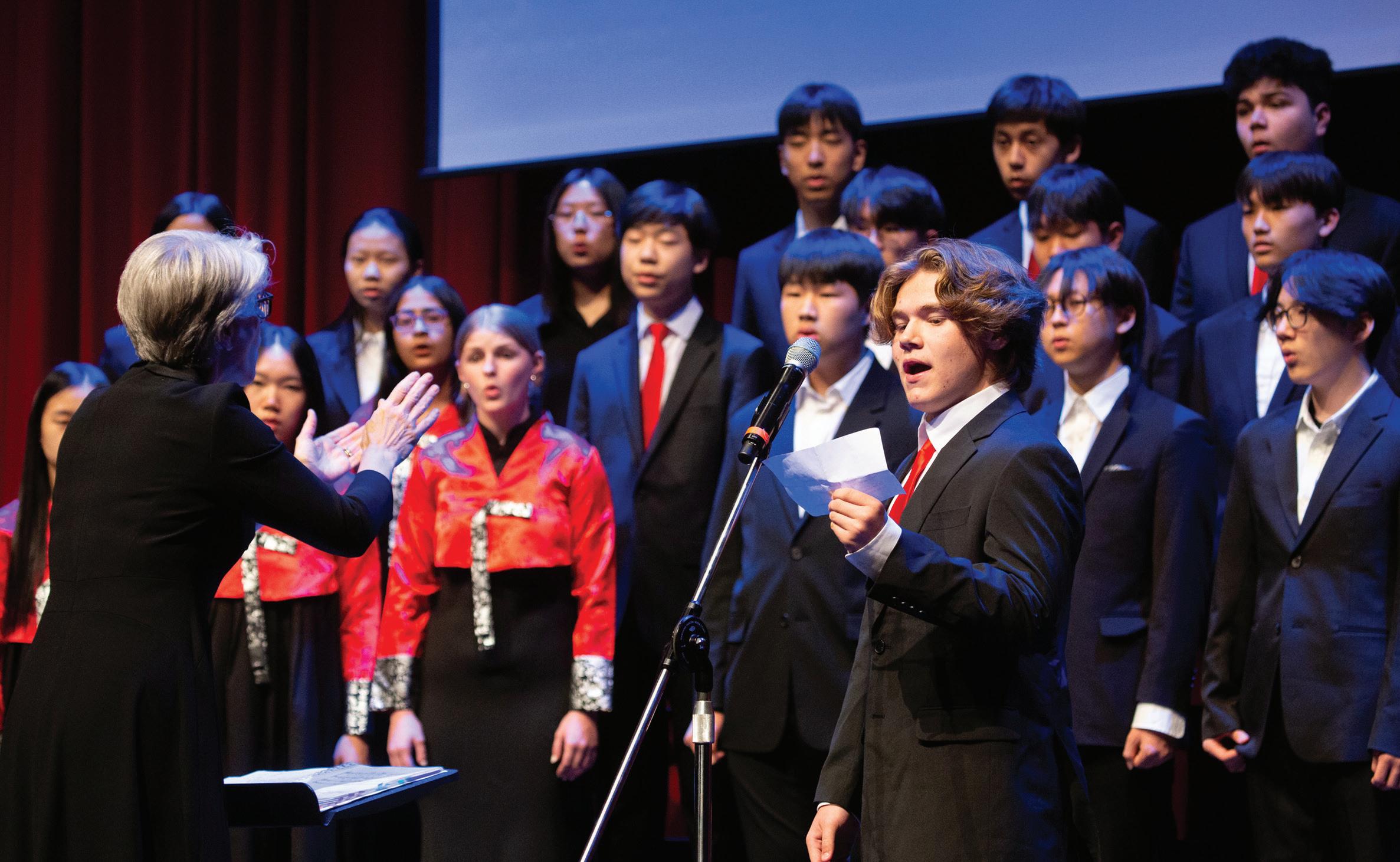
35 Spring 2023 | Arts
(Above) Vertical Jazz Concert.
(Below) High School String & Choir Concert.
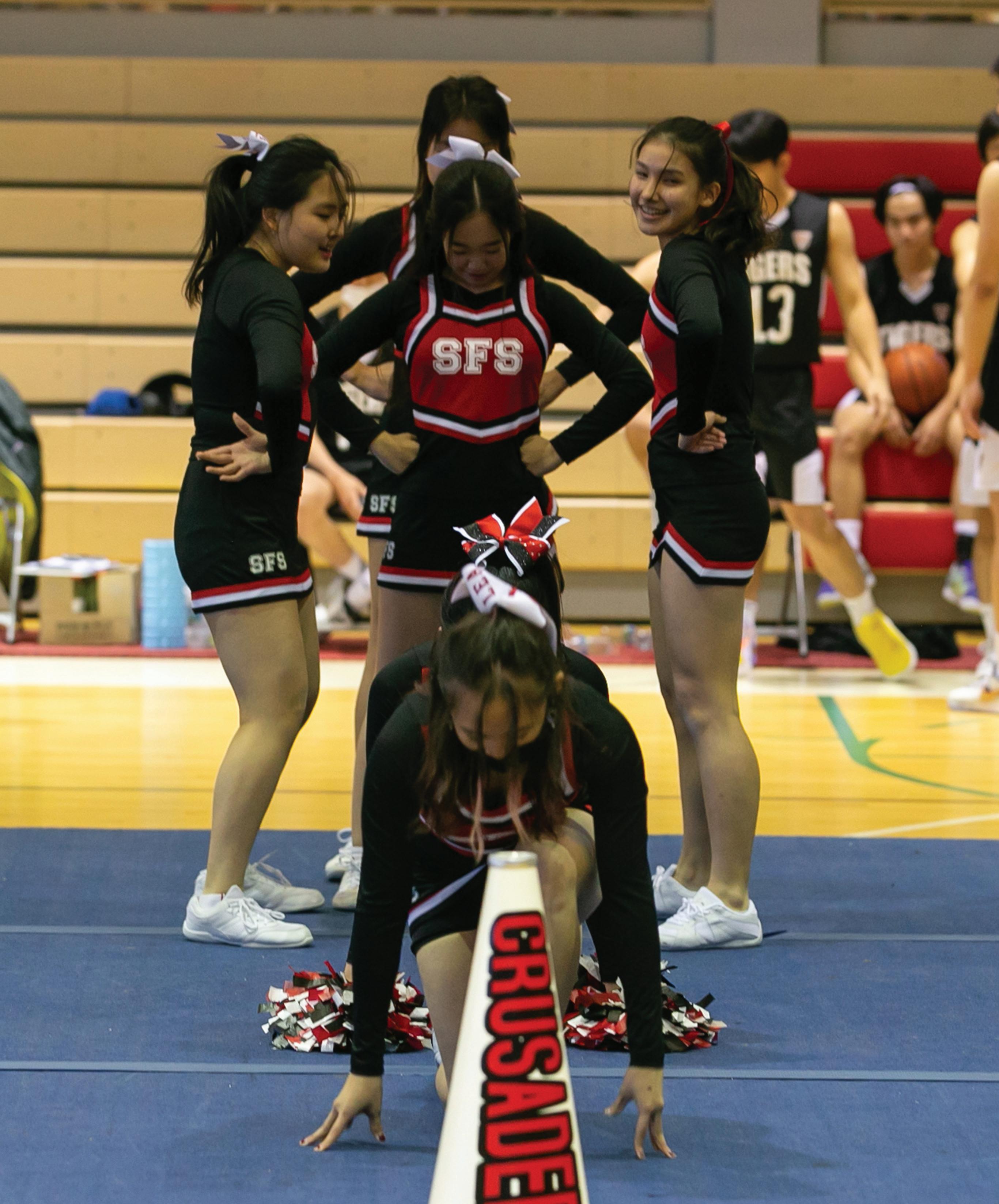 (Above) High School varsity cheerleading team during Homecoming performance.
(Above) High School varsity cheerleading team during Homecoming performance.
How Cheerleading taught me resilience
By Sydney Sohn Grade 10 student
Bothmentally and physically, Cheerleading was able to teach me resilience. Many may think of Cheerleading as a sport that just requires a group of people to smile and verbally cheer at basketball games. However, it is really much more than that. Cheerleaders go through several mental and physical challenges that people do not know about.
Especially when the KAIAC competition is around the corner, Cheerleaders go through a handful of challenges. No matter how big or small the challenge was, my teammates and I learned and developed resilience. With having to learn new and difficult stunts, several members get injured. Flyers fall from high above the ground, the Bases and Backspots get stepped, fallen on, and much more. But we all need each other. The Flyer can’t do the stunt while missing a Base, and a Base/Backspot can’t carry a flyer alone. With Cheerleading being a sport that requires constant physical teamwork, no matter how big/small an injury can be, a strong level of determination is found between the athletes to help themselves and each other recover fast. The team would fall apart with just one member missing. We quickly learned to push through the pain.
In Cheerleading, there is something called “marking”, where the athletes just mark their places in the routine instead of actually performing all of the stunts, jumps, and tumbling. Normally, we would mark our routine if someone is absent that day, or someone is sitting out due to an injury. This year, (not only due to absences or injuries), we spent a lot of time working on individual stunts without trying to put the entire routine together. We practiced section by section but didn’t run through the entire routine including all jumps and stunts as often. A couple of days before our KAIAC competition, we tried putting everything together, and it was quite the experience. Certain parts of the routine didn’t look as clean as we wanted it to, people lost energy halfway through the routine as we never tried everything together
before, and even major parts of the routine, such as the pyramid, were risky. We were faced with many challenges both physically and mentally, due to a time crunch. I remember the day right before KAIAC. We had around 2 hours of practice after school, and we just couldn’t get it. We couldn’t get passed the entire routine smoothly. Not even once. I could tell that we all started to worry about whether we could pull this routine off the next day or not. It was our last practice before KAIAC, and we didn’t have a single successful full out of the routine. However, this is when I really came to a realization that pouring discouraging thoughts or energy can really impact the team's results. I was able to quickly snap out of the discouraged and worried feeling, and just gave it 110%. I could tell that everyone was giving their all into this last practice, and that also motivated me to work even harder. Having resilience does pay off. At the KAIAC competition, we got 10-15 minutes to practice on the big mat. Our team couldn’t do a smooth full out, and we still stumbled here and there with many unstable parts in the routine. However, we all encouraged each other, snapped out of the negative thoughts, and really gave it our all in our last chance. Funny and surprisingly enough, the one successful full-out we did, was the actual competition performance. All of us being able to overcome our difficult physical and mental challenges paid off in the end with a successful KAIAC competition performance.
Hence, during this season, Cheerleading was able to teach me resilience in both mental and physical ways. The experiences and lessons learned throughout this season not only helped bring a successful competition performance but also taught me the importance of having resilience in everyday activities. Sitting and worrying is much worse than thinking of ways and strategies to quickly recover and withstand any forms of difficulties that come along the way.
37 Spring 2023 | Sports
Sports
Reasons to be cheerful
By Chris Dale British School Computer Science Teacher
Take a group of children and expose them to negative news and social media content every day for a week. Bombard them with stories of natural disasters, political turmoil, and economic recession. Show them images of violence, suffering, and despair. Encourage them to read about environmental catastrophes and looming threats of global conflict.
After a week of this exposure, ask the children how they feel. It is likely that they will report feeling anxious, stressed, and hopeless. They may struggle to sleep at night and find it difficult to concentrate in school. Their mood and energy levels may be low, and they may be more prone to negative thinking.

This little thought experiment highlights how badly children can be affected by the constant stream of negativity from the news cycle and social media (and also how obvious it is that they are being negatively affected). Children are not equipped to process
and contextualize this information in the same way that adults are. They are more vulnerable to the emotional impact of negative news and can easily become overwhelmed and despondent. It is no surprise that we are in the midst of a mental health crisis, confirmed by Jonathan Haidt’s most recent substack article.
A recent study published in the Journal of Happiness Studies has found that optimism can be cultivated and that it is linked to better mental and physical health outcomes; according to their meta-analysis of 83 studies with over 200,000 participants. The study underscores the importance of encouraging optimism in the classroom and providing students with the tools to develop a positive outlook on life.
However, in order to encourage optimism, we must also address the pervasive negativity that students are exposed to through the news cycle and social media. When children are
38 The BANNER | Academics
Acad emics British School Foundation class enjoying outdoor play.
exposed to negative news and social media content, they can become overwhelmed and despondent. This can trigger a downward spiral of negative thoughts and emotions, leading to mental health issues.
As educators and caregivers, it is our responsibility to give children the tools to process their exposure to negative news and social media content. We must take the time to encourage positivity for the planet, for human ingenuity and most importantly- for their lives and opportunities ahead, so that children can thrive and develop a positive outlook on life. By encouraging optimism in the classroom we can help to mitigate the negative impact of the news cycle and social media on their mental health.
In my humble opinion, we spend too much time downstream of the main issues, instead, we should concentrate on identifying
and addressing the root causes of distress. Dr. Willem Kuyken, Head of Psychiatry at the University of Oxford, suggests in his recent study- "Maybe what we need to be doing is not looking at the kids’ resilience, but the causes of the kids’ distress in the first place.” One crucial approach is fostering optimism in the classroom. By giving children reasons to be positive and optimistic, avoiding the overload of negative news and social media content, nurturing a positive outlook, and teaching emotional management, we can help students thrive in a complicated world. Taking these measures will pave the way for a more promising and hopeful future for our children.
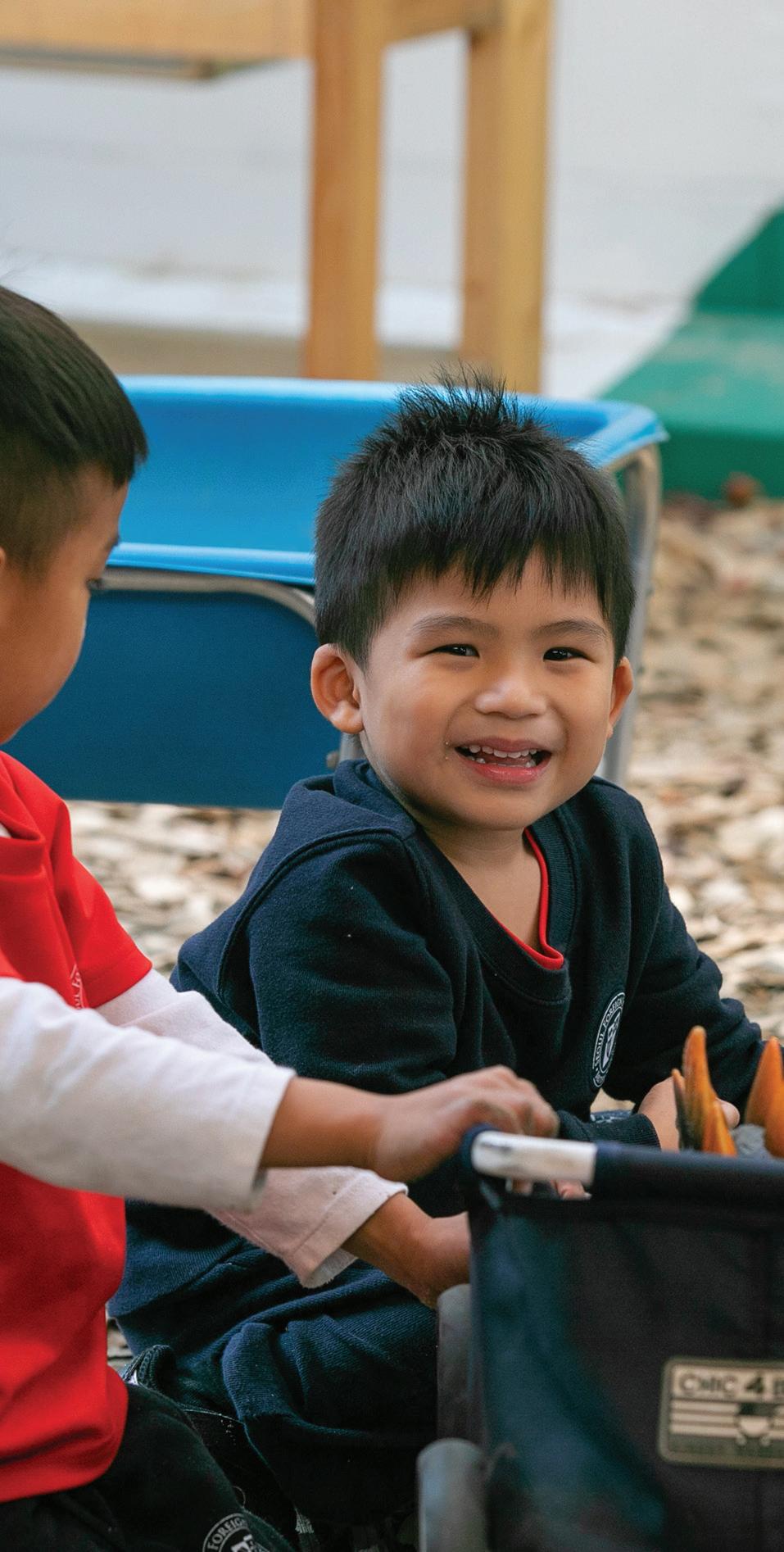
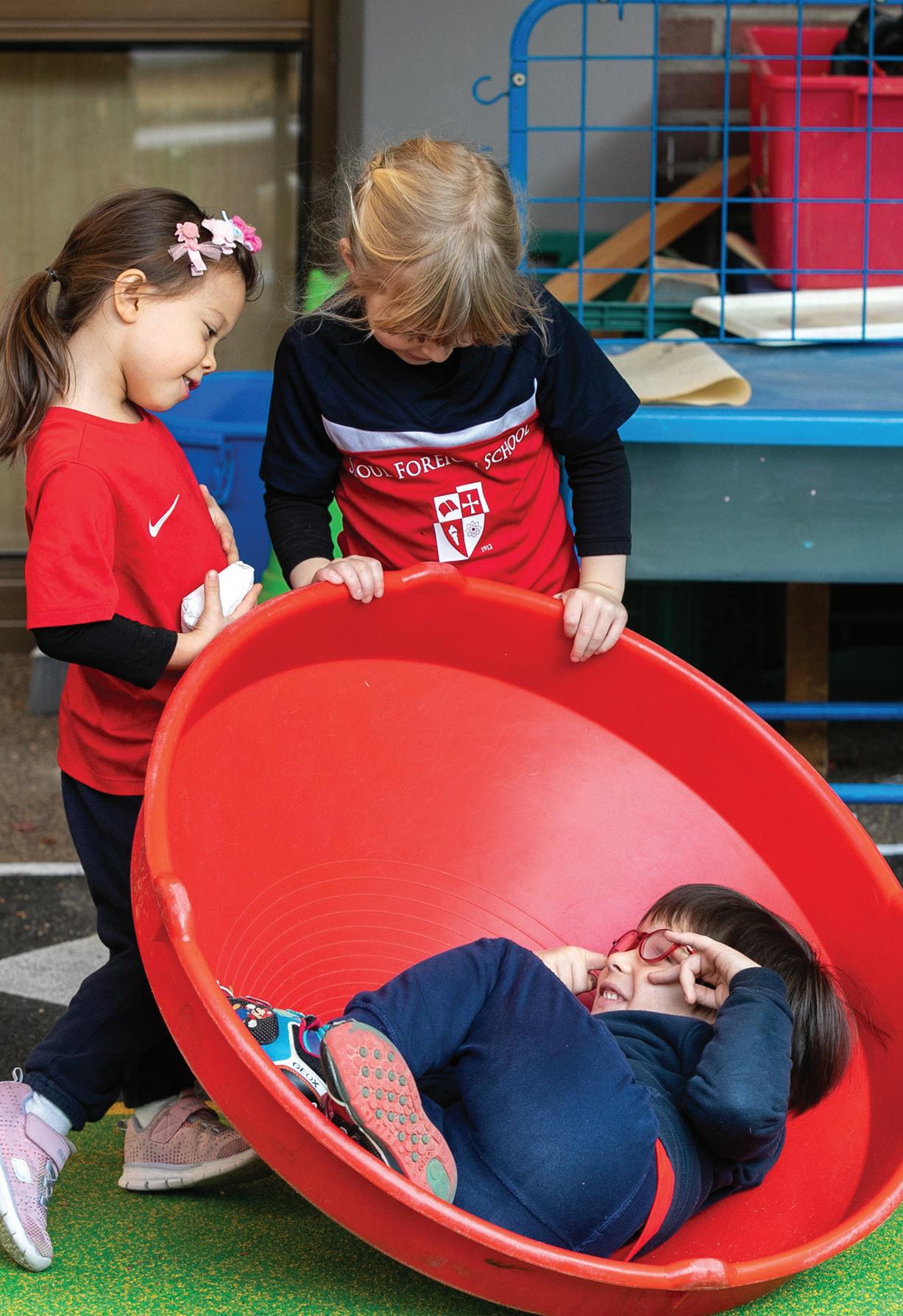

39 Spring 2023 | Academics
Empowering Students to Advocate: A Service as Action Unit
By Heather Adkins High School English Teacher
The MYP framework gives us the opportunity to expose the students to authentic situations and learning experiences. By using the Global Context of Orientation in Space and Time, specifically looking at the “interconnectedness of individuals” and the Key Concept of Communication, our Grade 10 students were given an opportunity to explore how different text types can impact audiences to advocate for a people or a cause.
This was a specially designed Service as Action unit built on previous units where we studied the art of a personal essay and a novel that chronicles the plight of North Korean defectors. Both of these units are focused on using text to tell the stories of individuals through a variety of tools and perspectives. As students end their study of a unit where we explored the stories of the North Korean defectors by reading a novel written by an American journalist, there is a natural way to connect to authentic learning outcomes using text types to engage in the world. Students have spent time researching and gathering information about other people groups that are in crisis in our current global
community. They have then used that information to build a collection of texts that advocate for current humanitarian crises while demonstrating their understanding of how different mediums of communication can impact an audience.
The students were grouped by country or people group of interest and then had a choice of three different text types: Editorial Cartoon, Magazine Cover, or Poster Campaign. They independently learned about these text types and disenfranchised people groups with lessons designed to provide a self-study experience,with the expectation that they would design a product at the end of their study. Then groups were asked to design an exhibition tri-fold and prepare to share their research, new text type expertise, and ultimately, advocate for the people they had been researching.
Students demonstrated a passion for learning along with care for their fellow human beings. We hope to inspire them and others to serve our community on a local and global level through the power of advocacy and modern mediums.
40 The BANNER | Academics Acad emics
(Opposite) High School Grade 10
for Service Exhibition.
Advocacy

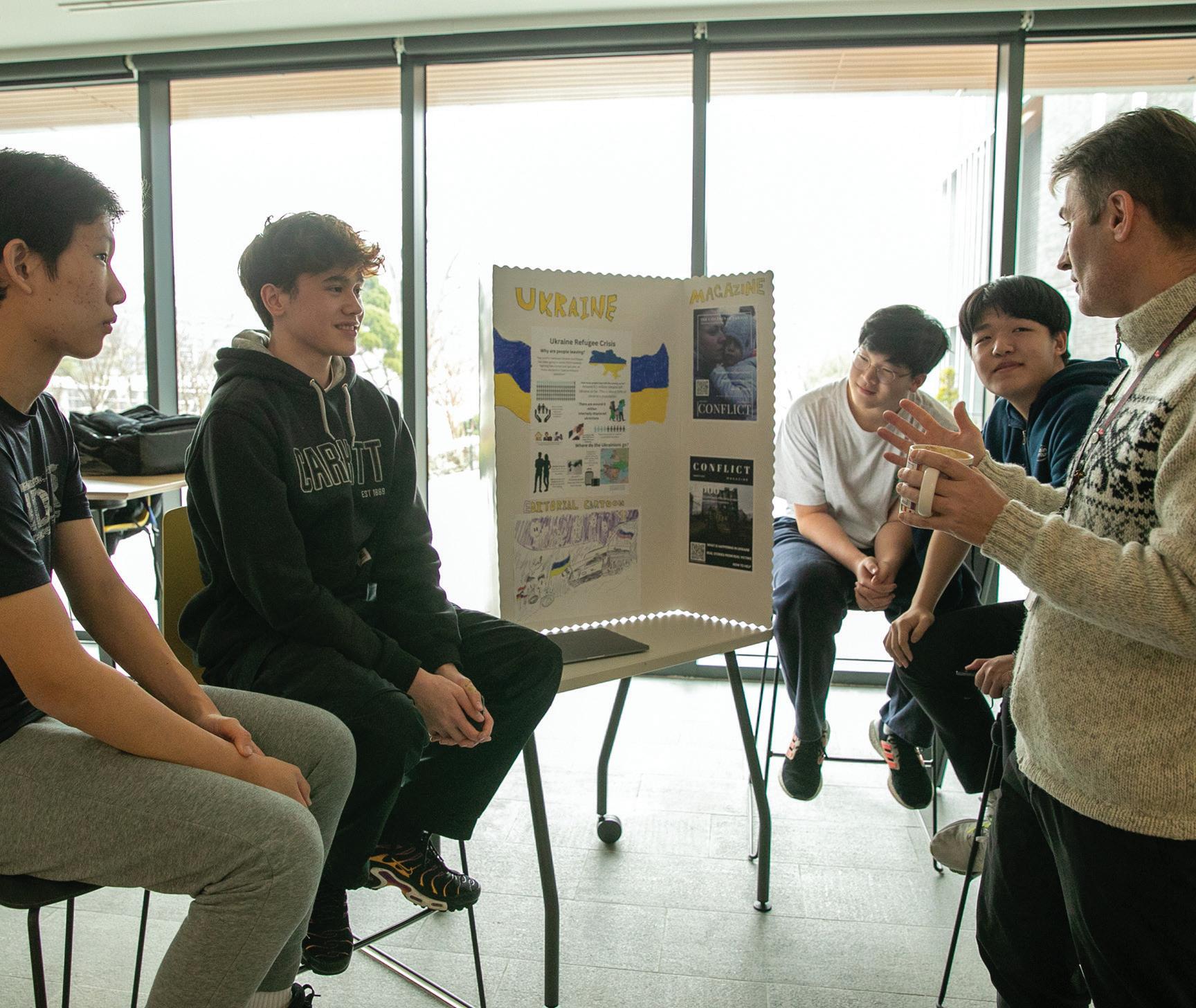
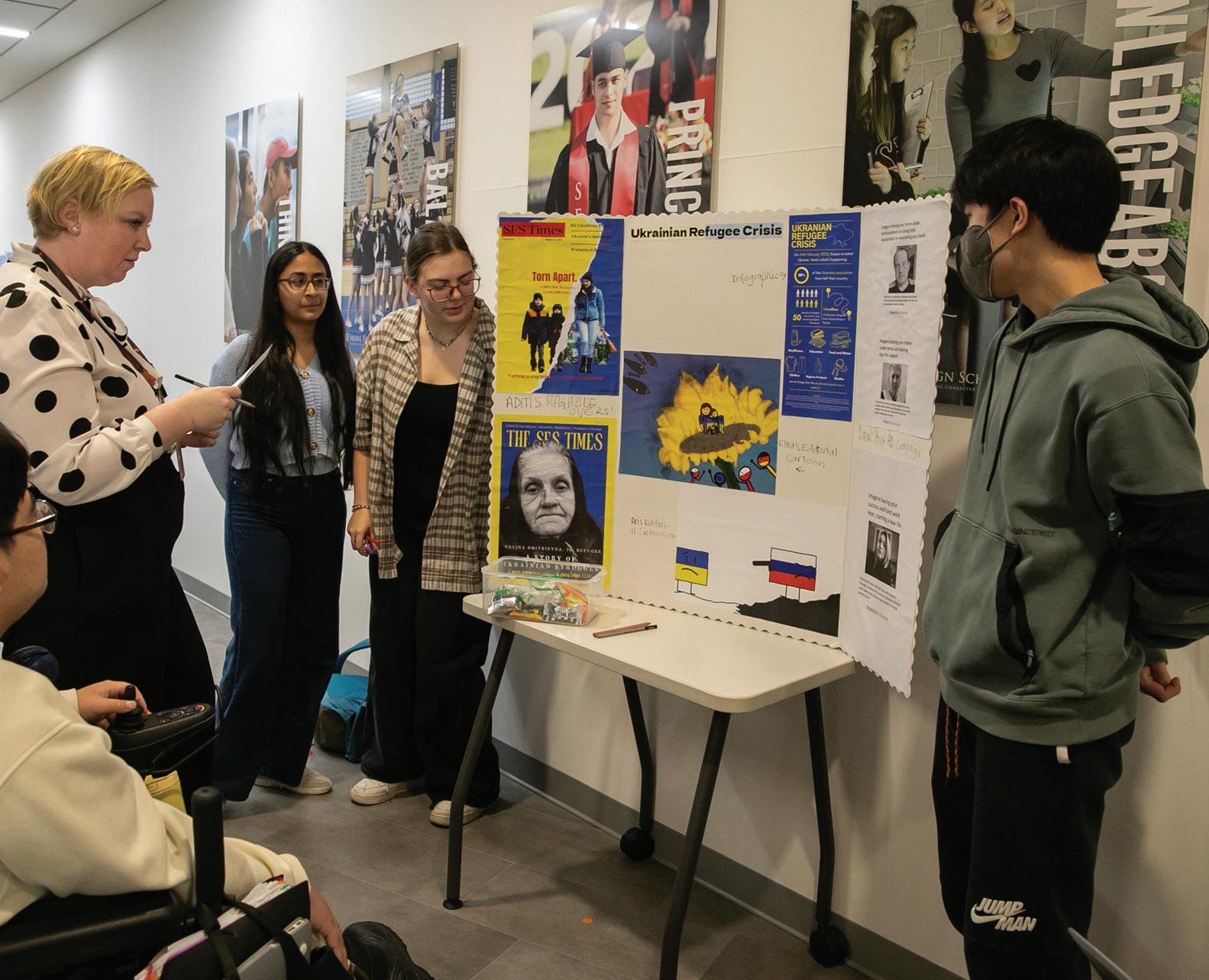
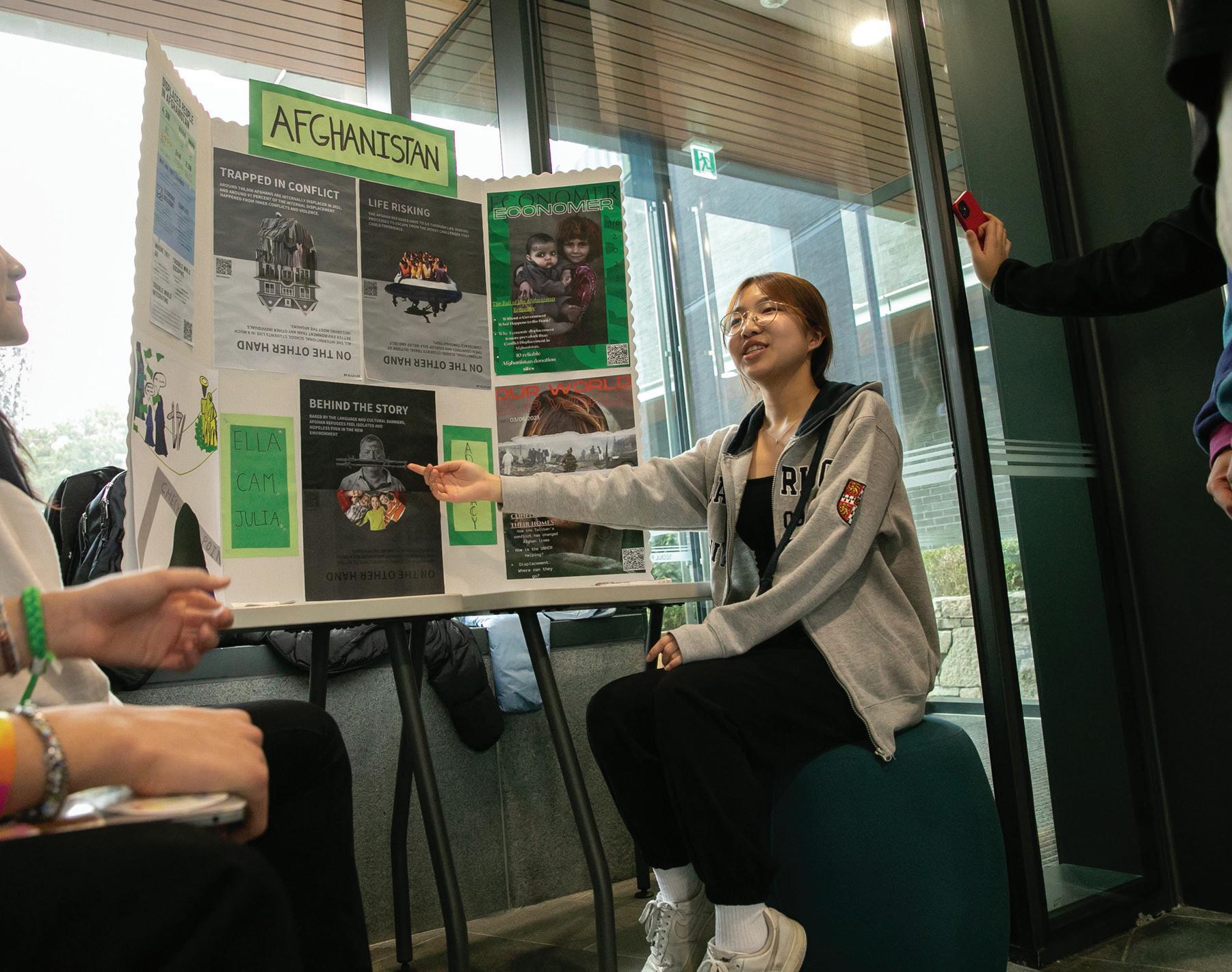
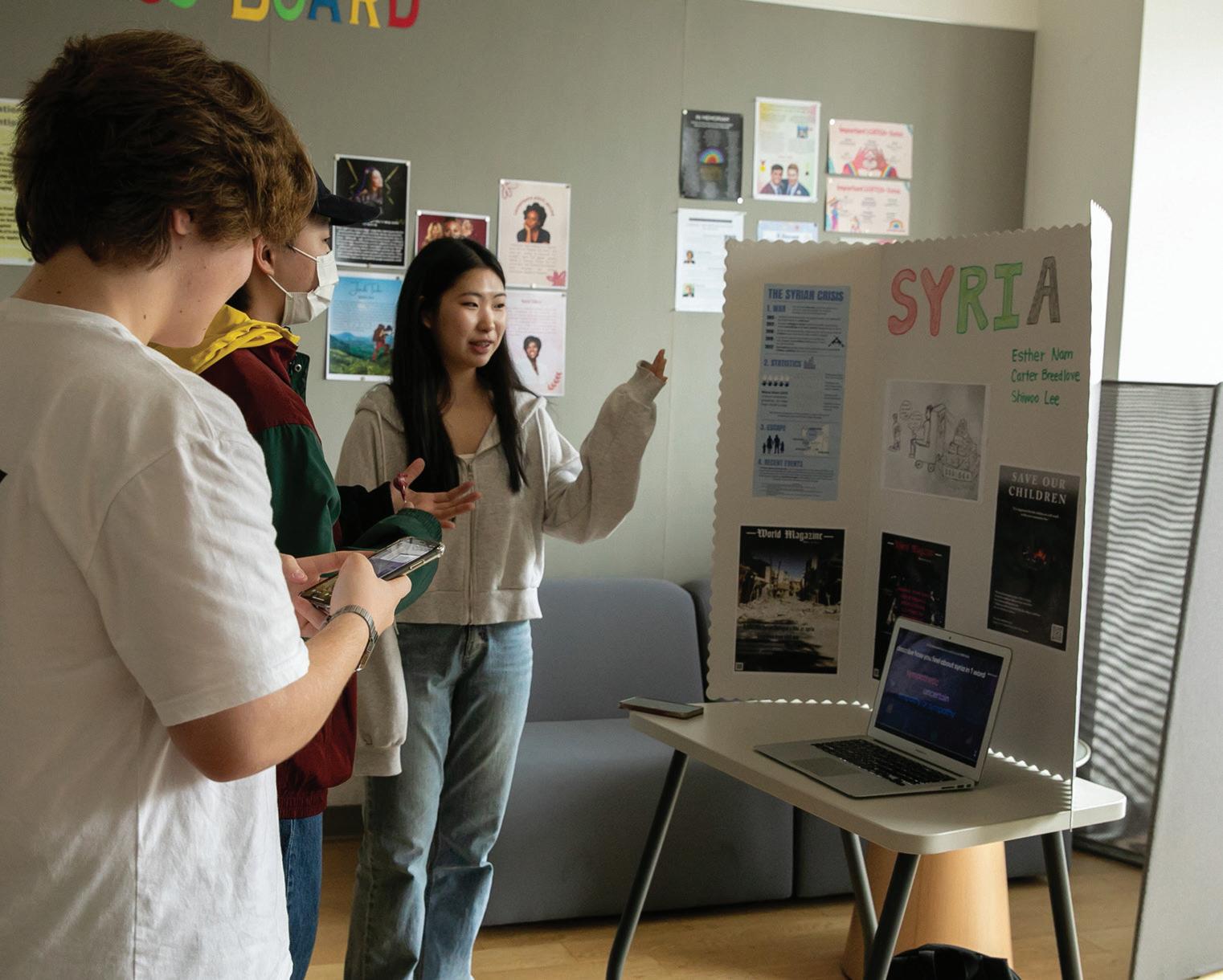
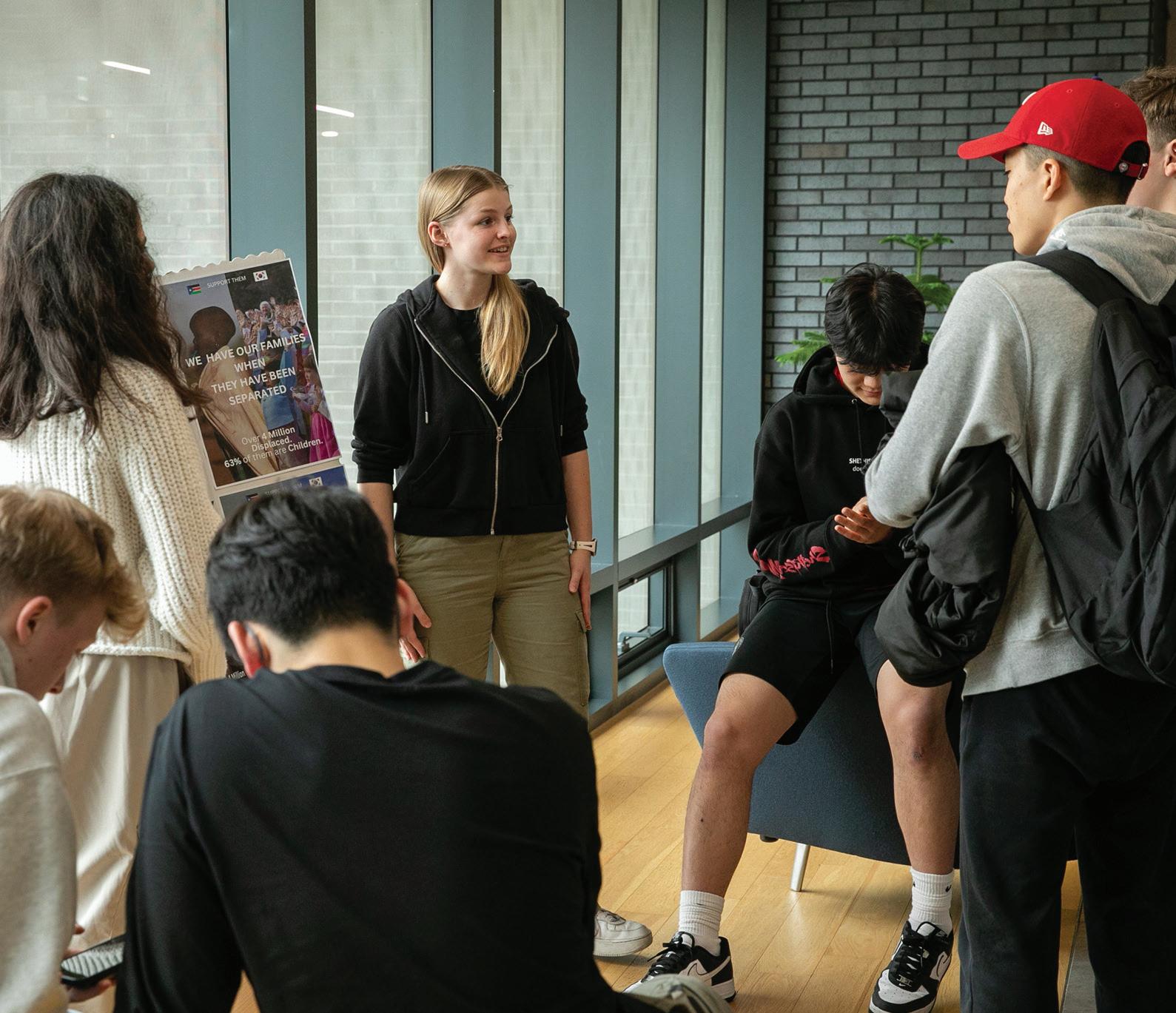
Spring 2023
Philosophy, Science, and Faith: Exploring the Interconnectedness of Ideas
By Penny Lamb Elementary School Grade 3 Teacher
The poet E.E. Cummings wrote, "Always the beautiful answer who asks a more beautiful question." As a teacher, I have the privilege of hearing beautiful questions from students. Recently, I was asked questions by Awana students that illuminated an issue close to my heart. As a passionate writer, it inspired me to begin writing a children's book in the early morning hours. It has a long way to go, and I am so grateful for the inspiration and the journey.
How can we nurture open-minded curiosity? Absolutes (yes or no, for or against, this or that, us or them, patterns of thinking) can be dangerously divisive and limiting. Intellectual humility allows us to inquire, learn and perspective-take. John Dewey wrote: "Mankind likes to think in terms of extreme opposites. It is given to formulating its beliefs in terms of Either Ors, between which it recognizes no intermediate possibilities." One such belief is that we can either be rational, educated, scientific thinkers or faith-based believers. The picture book I am writing challenges this belief and explores several usual points of contention.
How can we encourage children to ask the kind of questions that lead to more questions? Let's nurture philosophy, oracy, rigorous research, critical thinking and precise language use to develop reasoning and inquiry. Erin Kent urged us to have children "level up their talk" and "relish debate." After all, isn't it the world's mysteries that make children curious and eager to read and research? Job challenges us as life-long learners, "Can you fathom the mysteries of God? Can you probe the limits of the Almighty? They are higher than the heavens above—what can you do? They are deeper than the depths below—what can you know?"
(Job 11:7-12)
How can we be sure of our facts? Now, more than ever, we
need to challenge our thinking and confirmation bias, with AI populating our social media feeds with more of the same. Similarly, with Chat GTP adding to the information glut, our research must be more rigorous than ever. We have to examine the validity of the information we glean. Who funded the study? What do they have to gain by us believing it? By way of example, our daughter challenged my husband and me to question our dietary choices, which resulted in a life change; however, we did as she urged us - researched to discover the truth and affirm our decision. We were shocked to learn about misinformation funded by businesses and upheld by trusted institutions. We learned to critique information sources. A lot of information is promoted as 'scientific', so the onus is on the reader to do the fact-checking.
How can we be sure of our faith? A quote from Einstein resonates with me, "This firm belief, a belief bound up with deep feeling, in a superior mind that reveals itself in the world of experience represents my conception of God." I continue to be in awe of the intricacies and mysteries of life on our planet and the unfathomable universe above us. I am fascinated by all I discover in the field of science, which paradoxically affirms my faith. Juxtaposed to science, I have seen miracles captured in x-rays and medical reports, which science cannot explain. I have experienced God's loving Spirit flooding my soul, and have witnessed instantaneous changes in people who took the leap of faith to believe in Jesus. My faith remains rock-solid.
In closing, are science and faith not inextricably woven together, as both originate from God? I leave you to ponder the words of Einstein, "Science without religion is lame, religion without science is blind."
42 The BANNER | Academics Acad emics
(Opposite) AWANA students, teachers and volunteers
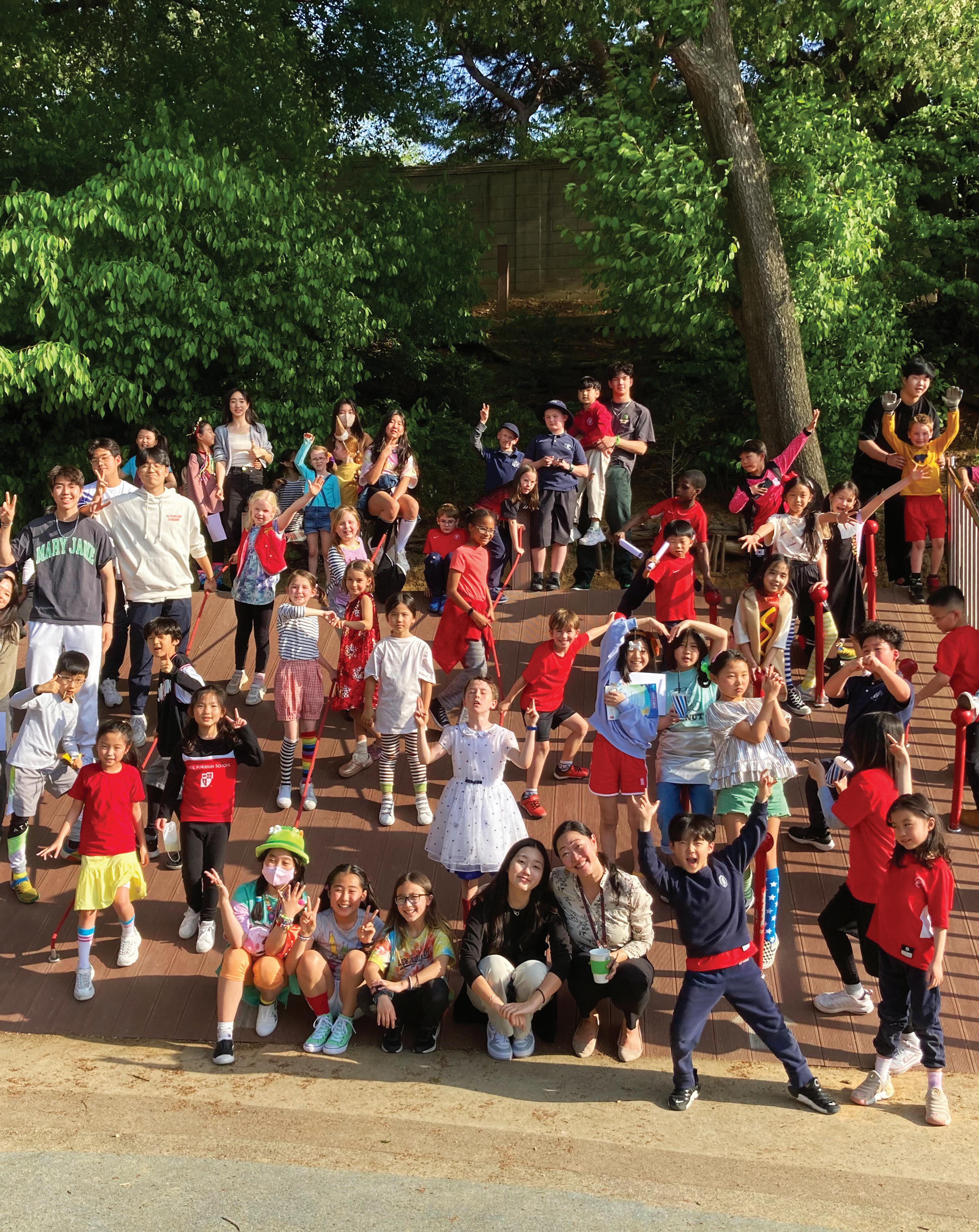
43 Spring 2023 | Academics
Crafting Signature Drinks for a Cause: A Student's IB Personal Project
By Abe Ryu Director of Crave
ForSFS sophomore Irina Kim, spending summers in France introduced her to Parisian cafe culture and sparked her interest in coffee and beverages. When it came time to select an area of interest for her IB Personal Project, she knew this was what she wanted to explore.
The IB Personal Project is a student-driven research project that is a requirement for the International Baccalaureate (IB) Middle Years Programme (MYP). It allows students to explore a topic of their choice and develop skills in areas such as research, critical thinking, communication, and self-management. The project culminates in a final product or outcome, such as a written report, an artifact, or a performance, that demonstrates the student's learning and achievement.
Upon entering the main doors of the high school building, there are panoramic views of the Yeonhui cityscape to the left, and a bustling cafe to the right. Cafes have always been a hub for the exchange of information and ideas, and in today’s increasingly virtual world, the HS cafe is a place where students, faculty, parents, and alumni can gather, develop in person connections and build a stronger community. For Personal Project Coordinator Nathan Walker, this was the ideal starting point for Irina’s journey and he arranged for a close collaboration. The
key element of the IB Personal Project is to create a product or outcome, and Irina’s goal was clear from the outset - a signature drink, all her own, that can be shared and served to the SFS community.
Irina’s first step would be to learn the basics - pulling espresso shots, steaming microfoam, and understanding the science that makes an outstanding cup of coffee possible. During her free time, she would stop by the HS cafe, learning and practicing with the baristas. After establishing a solid foundation, Irina had an opportunity to meet with BK Kim, CEO and co-founder of Fritz Coffee Company.
Fritz is known within the coffee community in Korea as the “Avengers of Coffee” as they were founded by a team of coffee professionals with a wide range of skill sets. Co-founder Geunha Park won the 2014 Korean National Barista Championship and he focuses more on operations while BK Kim is passionate about sourcing. BK travels the world, meeting independent specialty coffee farmers and seeking out the highest quality Direct Trade beans that are sustainably and ethically grown. The cafe is a collaboration between Fritz and Crave Catering, the catering company that operates the cafe and cafeteria at the high school. Fritz was the obvious partner for us. The quality of their product
44 The BANNER | Academics
Acad
emics
With a huge Thank You to Crave Catering, Fritz Coffee Company, Monin Korea
Try Irina’s Signature Recipes
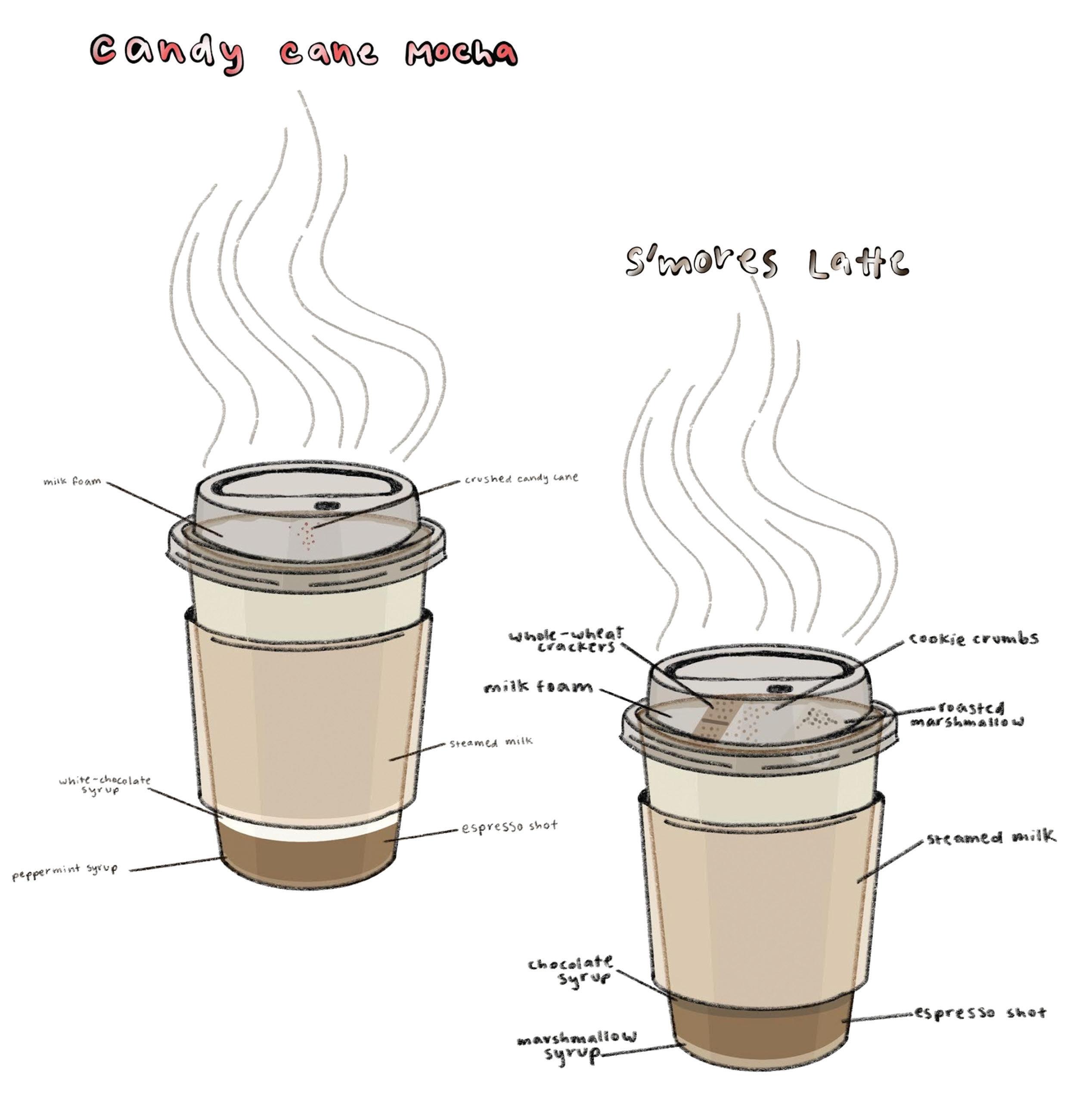
45 Spring 2023 | Academics
combined with their commitment to values were a perfect match with everything that SFS represents - inspiring excellence, building character.
Located in an alleyway tucked behind Gongdeok Station, amidst a backdrop of towering office buildings, lies a traditional hanok building, transformed into one of Seoul’s most iconic cafes. In this setting, Irina had an opportunity to speak with BK and hear about his journey from a human rights activist in college, to a part-time barista, and eventually, the CEO of a successful coffee company built from scratch. Irina also had an opportunity to sit down with the menu development team at Fritz to learn about their process for creating new drinks. She bounced off some ideas for her signature drink and received valuable feedback from experienced industry experts.
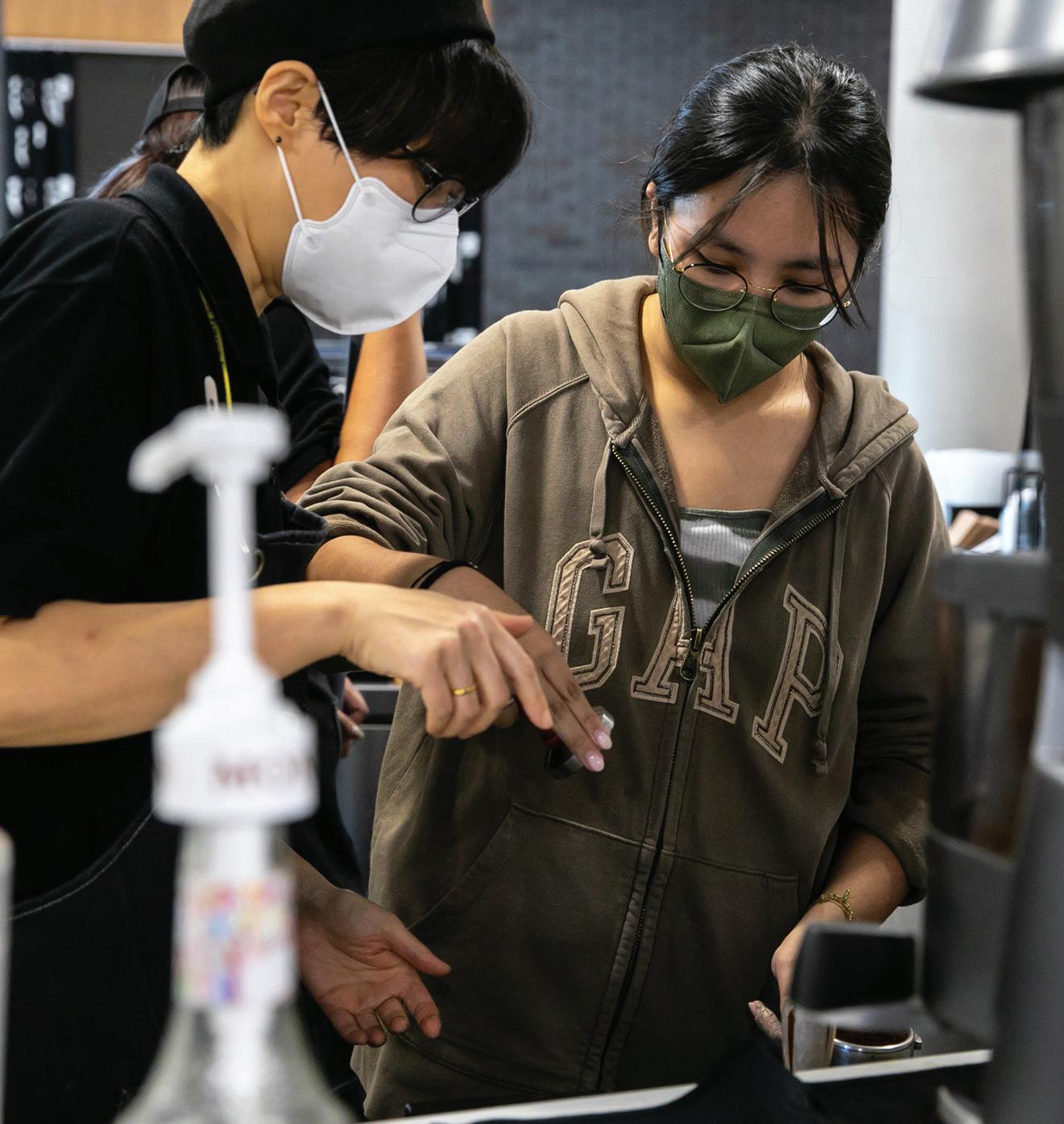
Irina’s approach to developing her signature drink started with a blank canvas and her fresh perspective enabled her to explore a variety of unique ingredients and flavors that may not be considered by experienced veterans that have already formed strong opinions. With the support of SFS’s extensive alumni network, Irina was able to schedule a meeting at Monin Studio to explore hundreds of different varieties of syrups, concentrates and mixes.
Andrew Chun attended SFS before finishing his studies in the US. Andrew and his wife Yilin Wang (SFS class of ‘03) own and operate Monin Korea. Monin is a leading syrup brand that uses natural ingredients of the highest quality and Monin Korea has a studio that showcases their entire product line. Irina was able to have a one on one meeting with Monin’s head mixologist who creates proprietary beverage and cocktail recipes for cafes, restaurants and bars. Together, they sampled different syrups and various combinations to learn how different flavors interact and complement each other.
After months of research and development, and a number of trials and tasting sessions, Irina decided on two signature drinks as her final product - a S'mores Latte and a Candy Cane Mocha Latte.
Shortly before Christmas, Irina’s signature drinks were unveiled at the HS cafe and served to the SFS community. Irina’s drinks generated 585,000 KRW of revenue and all proceeds were donated by Crave to support Nanumi’s mission to feed the homeless. With SFS parents and students volunteering their time and serving, hundreds of people were able to enjoy a hot meal at Nanumi’s soup kitchen near Seoul Station.
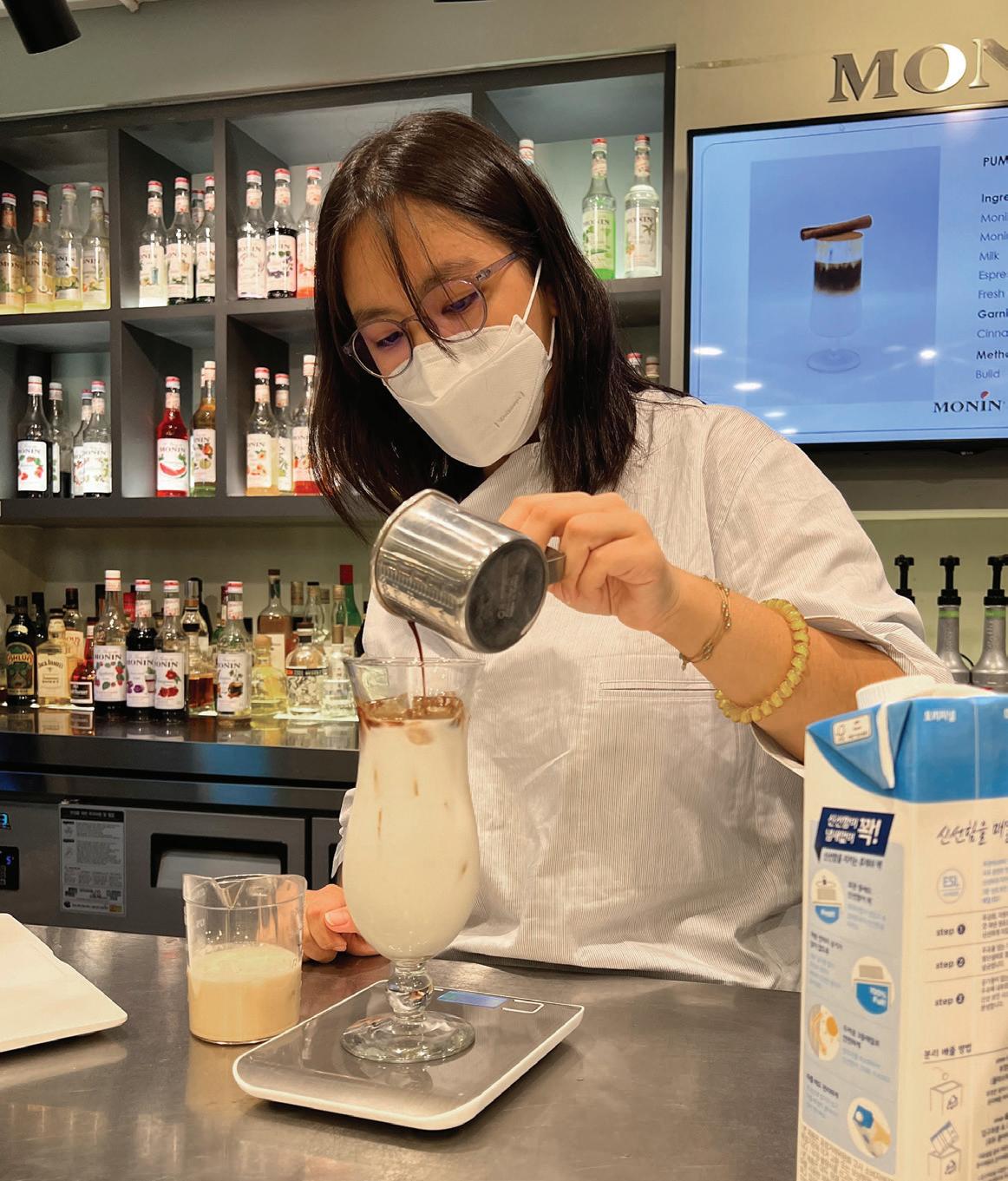
46 The BANNER | Academics
Irina learning to make coffee and drinks at Crave (left) and Monin Workshop (right).
2012-2022: New Foundations for the Future
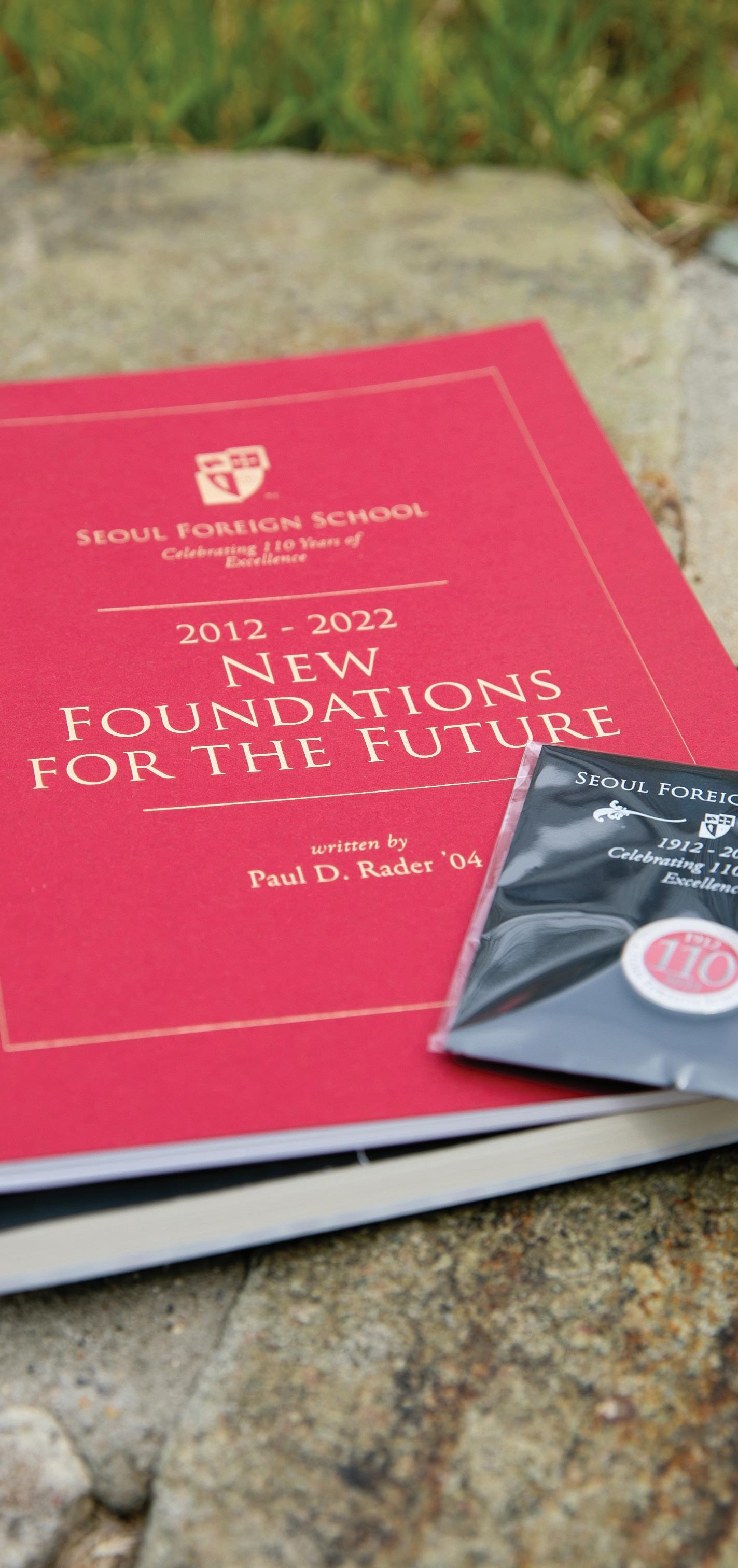
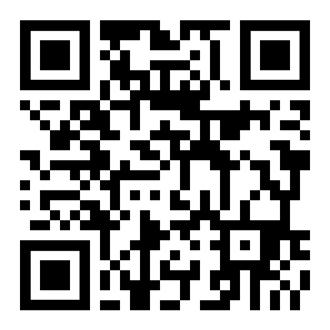 By Paul D. Rader '04 Director of Sports
By Paul D. Rader '04 Director of Sports
SFS is a special place with a unique mission, and we are blessed to be celebrating 110+ years of history. When I volunteered to write the 2012-2022 chapter of the history book, I don't think I realized how hard it would be to capture the decade. A lot happens at SFS in a single year, let alone a decade. Sometimes a single year here feels like a decade!
My family has a special relationship to the school going back to the 1960s, and through the years there have been Raders (Moons, Purvis, Erny, Fullers) at SFS either as students or faculty. SFS is a touchstone in our lives, and we all love this school and community deeply. SFS and this community has given us more than we could ever give back. Spending time writing this chapter has been really enjoyable, and I hope that you enjoy reading it!
If you wish to receive a copy of the SFS History Book (1912-2022), please send a request to communications@seoulforeign.org.
Comm unities 47 Spring 2023 | Communities
Read the chapter via the QR-code on the right:
Letter from Edie Moon

Dear SFS,
I first met you when I was a kindergarten student. Driving to Yeonhui Dong from Cheong Dong seemed like a long journey to the country. You were a school on a hill surrounded by rice paddies and very few buildings propped up on what used to be a grave site near a mountain called Ansan by most and called Saddleback by some.
The irony was my English was not good enough for your standards as I had spent the past two years in the Korean alleyways around the kimchi pots of my neighbors who only spoke Korean. I was sent back home to practice English. I remember those early years of education growing up with other missionary kids many of whom graduated with me. We had drop drills and practices for evacuating to Gimpo Airport if there was ever an attack from North Korea. My classmates and I were family. We called each other’s parents “aunt” and “uncle” and still do to this day.
I remember loving high school, playing sports, performing in the school plays, participating as a leader in student government, going to youth group, singing in a rock band and yes, having classes on tatami mats which replaced our desks on the SFS floor for a short time. Oh and yes, I remember hanging out with boys. I was oblivious to what was happening in the streets of Seoul and around Korea as this country fought for democracy. I lived under a military governed regime where we had curfews every night and listened to patriotic music being played from city hall every morning. I was here for the assassinations of presidents and the toppling of governments. SFS, you pressed on.
When I left at 18, I did not expect to return to Korea but I was called back by Mr. Underwood and yes, I believe by God, to come and teach in the high school as a 22 year old. The trees had grown and the buildings added to by then. In 1981, Korea was beginning to thrive after years of grappling with post war poverty and destruction. There was another new government and right before I returned still many had died for democracy in Gwangju. Protests were a way of life as people grappled with issues of independence and freedom of thought and life. I
learned how to teach and direct at SFS as this was modeled by my colleagues who were truly inspired teachers. I watched and learned from them as they came and went from year to year. I met my husband, Jack Moon then, (another inspired teacher), and we had two beautiful girls a few years later, Melissa and Kayla. SFS then became their home and their community. The “campus kids” were all of our children in a way as they flitted back and forth between apartments and around the nooks and crannies of the campus.
After repatriating to the US for 3 years in the early 2000s, we were called back to SFS by Dr. Lyso, the headmaster. I was asked to develop a schoolwide theatre program and Jack was to oversee all campus extracurricular activities. We returned to an SFS of stunning theaters, a swimming pool, a new middle school, new teacher housing, a new chapel and cafeteria. The student body was transformed as well. Numbers had grown and diversity had come in the most beautiful way!
For the past 17 years, we have watched SFS burgeon alongside Korea. Spectacularly, Korea hosted the Olympics and World Cup football. Most recently, it has burst onto the worldwide stage with award winning movies, books written by Korean authors and translated into English and the ever growing popularity of K Dramas and K Pop music. Korean fashion and makeup have taken the online world by storm. Technology, architecture, art, literature, design have catapulted Korea onto the world stage. SFS, you have kept up! The development of schoolwide IB programs, fine arts programs, an ever expanding sports program, design classes, robotics and so much more. You have excelled as one of the premier international schools in the Asia-Pacific region.
Dear SFS. Thank you.
For being home to us over all these years.
For the gracious service and support of the best GA staff that any school could ask for.
For the safety and support of our caring guards.
For the delicious food, Korean and Western, cooked by the cafeterias.
48 The BANNER | Academics
Comm unities
For teachers, counselors, administrators and students who have taught me how to teach.
For spiritual life coordinators and mentors who have shown me how to disciple with empathy and acceptance. For leadership who have afforded me the space to create both in theatre and in the classroom.
For the students who have always challenged me, always surprised me, and always inspired me.
For the little children on the SFS campus who have shown love and more love every single day.
For the nurses who worked tirelessly to keep us healthy during the pandemic.

For the alums who have returned to teach here because of their love for the school.
For the parents who have given above - beyond- and built the school programs through their own efforts. Thank you to so many who have become my friends.
SFS, Thank you for surviving 111 years through wars, destruction, protests, revolutions, financial crises and gains, low student enrollment times, a myriad of curriculum approaches, a vast array of faculty groups and student groups. We know at the core, it wasn’t just your money or buildings or even your vision. It was all of that, of course, but mostly it was being Centered in Christ, built on Love, and a dedication to the acceptance of All. In spite of mistakes we made along the way, we have tried to honor the mission of our school and encourage others to embrace it.
Goodbye SFS.
Once a Crusader, Always a Crusader. We take you with us in our hearts.
Edie Moon
Class of 77
Teacher and Director from 1983-2023. (with the exception of sabbatical years). Student from 1965 to 1977 (with the exception of furlough years).
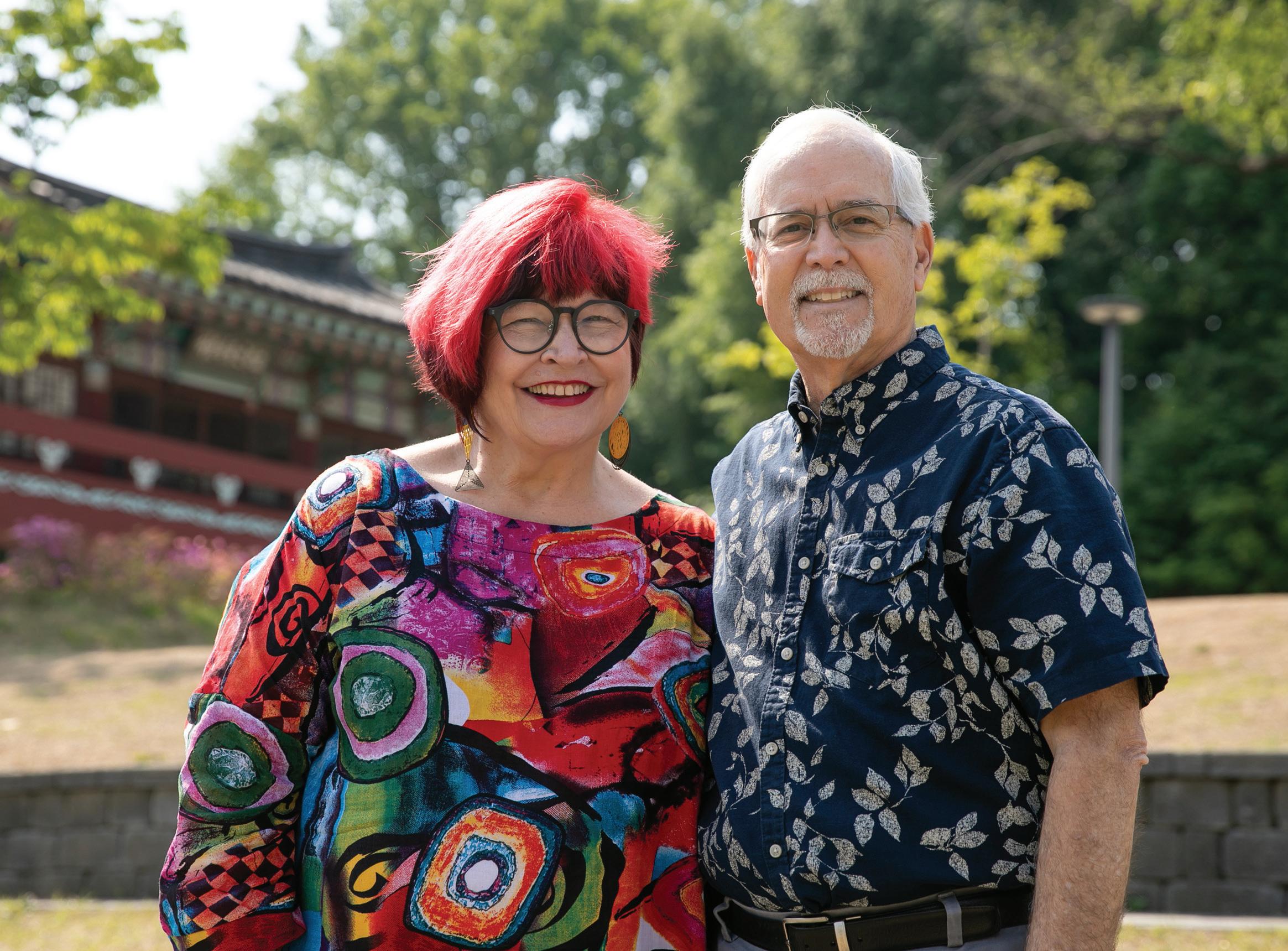
49 Spring 2023 | Communities
Comm unities
Inspired by my iconic, generous, beautiful sister, Edie Moon and my outstanding, kind, faithful brother in law, Jack Moon who was “Mr. Moon” (teacher, coach, Sunday School teacher, basically everything) long before he was my brother in law, “Jack”. My heart is heavy but full with the gratitude of thousands you have fully seen these many years. You taught them with love and to love.
Poem for the Moons Red Moon
By Jennie Purvis '83 High School Counselor
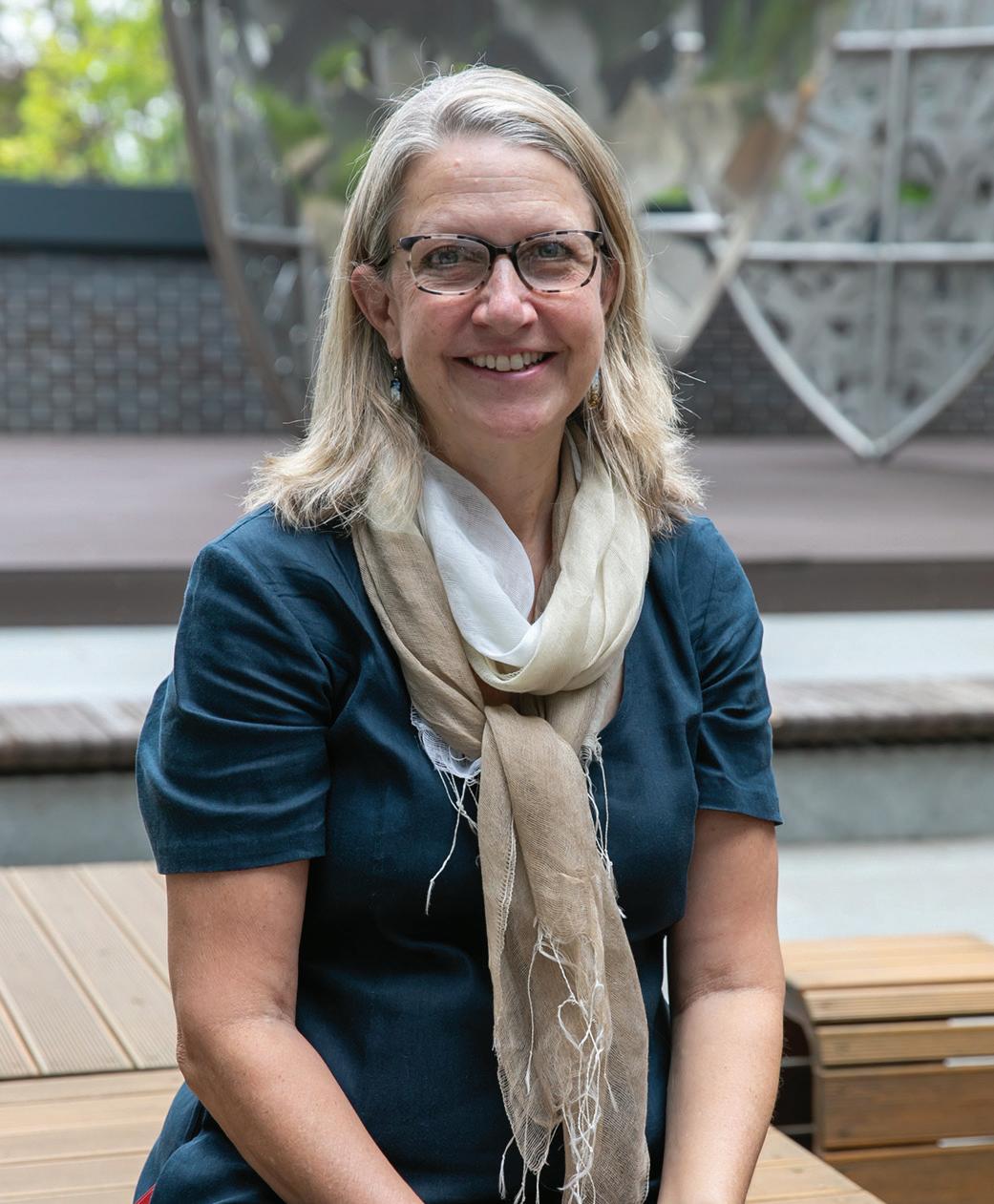
Burning through the early morning haze
The full moon startled me
As if waiting.
Suspended between night and day
I knew it would disappear
So I stood and welcomed the surprise the joy of witness to its full color winter’s last yeonton glowing in a cool spring sky. A red rose or spotlight on the stage. We held each others’ gaze. A warm eye teaching me to be all of me and more.
Some say, “Don’t be like the sun
Be like the moon, calm and cool.” Wisdom comes in darkness and in light The moon moves us when cicadas sing in summer heat and snow falls on black crow wings. Full and empty, seen and unseen Brother. Sister.
Shine bright on your journey around this small globe
Return and return, faithful and true
We hold all your gifts as close as these moments that astound, inspire, ignite and endure
Creation’s sermon on the fullness of time. A story I tell because you taught me how

50 The BANNER | Academics
From the beginning…
In July of 1988, Hye Sun Woo sat down for the first time in what has become her familiar perch peering toward the stairs and out into the Atrium. It was the first year for the middle school and SFS was proud to open a brand new building. Mrs. Woo was the first Administrative Assistant hired for the new building, working with the first middle school Principal, Jonathan Borden.
35 years have passed since that July, approximately 3,000 students have passed through the middle school, hundreds of faculty members have worked in the building and four different administrators have guided the school, yet one constant has remained. Since the building’s opening in 1988, Mrs. Woo has been inseparably linked to the middle school. Sadly it is now time for us to say goodbye to her after three plus decades of service to our students and faculty as Mrs. Woo will retire at the end of the school year.
Having worked with Mrs. Woo for the past nine years, I have seen the impact she’s had on our middle school community and the relationships she has formed with so many students. While I am never surprised by the numerous visits she receives from past students, I am always touched by students’ fond memories of Mrs. Woo. She rarely forgets
Letter to Mrs. Woo
 By Justin Smith Middle School Principal
By Justin Smith Middle School Principal
a name or face, even if it has been many years since she’s seen a former middle schooler. In the past several years, she has started to welcome the children of former SFS middle schoolers. It is amazing to see parents who were former students reminiscing with her about the time they spent in middle school and how she touched their journey.
What’s most special about Mrs. Woo is her ability to be just what everyone needs. Students lean on her like a mother, seeking her assistance and advice. Her kindness, contrasted with her high expectations, resonates with students and helps them grow as adolescents. Faculty lean on her as a trusted colleague who is always willing to lend a helping hand to ensure they have the support they need to be successful. Parents lean on her for her wisdom and seek her advice on parenting and school issues that arise. I lean on her as my right hand as we share the type of bond that develops over many years. She anticipates what’s needed before I even raise it with her.
Mrs. Woo's service to our community reminds me of Proverbs 31 and as it says in verse 31 let us ‘honor her for all that her hands have done’. On behalf of the thousands of people she has served over the years, thank you for making the middle school a special place and for your dedication to Seoul Foreign School.
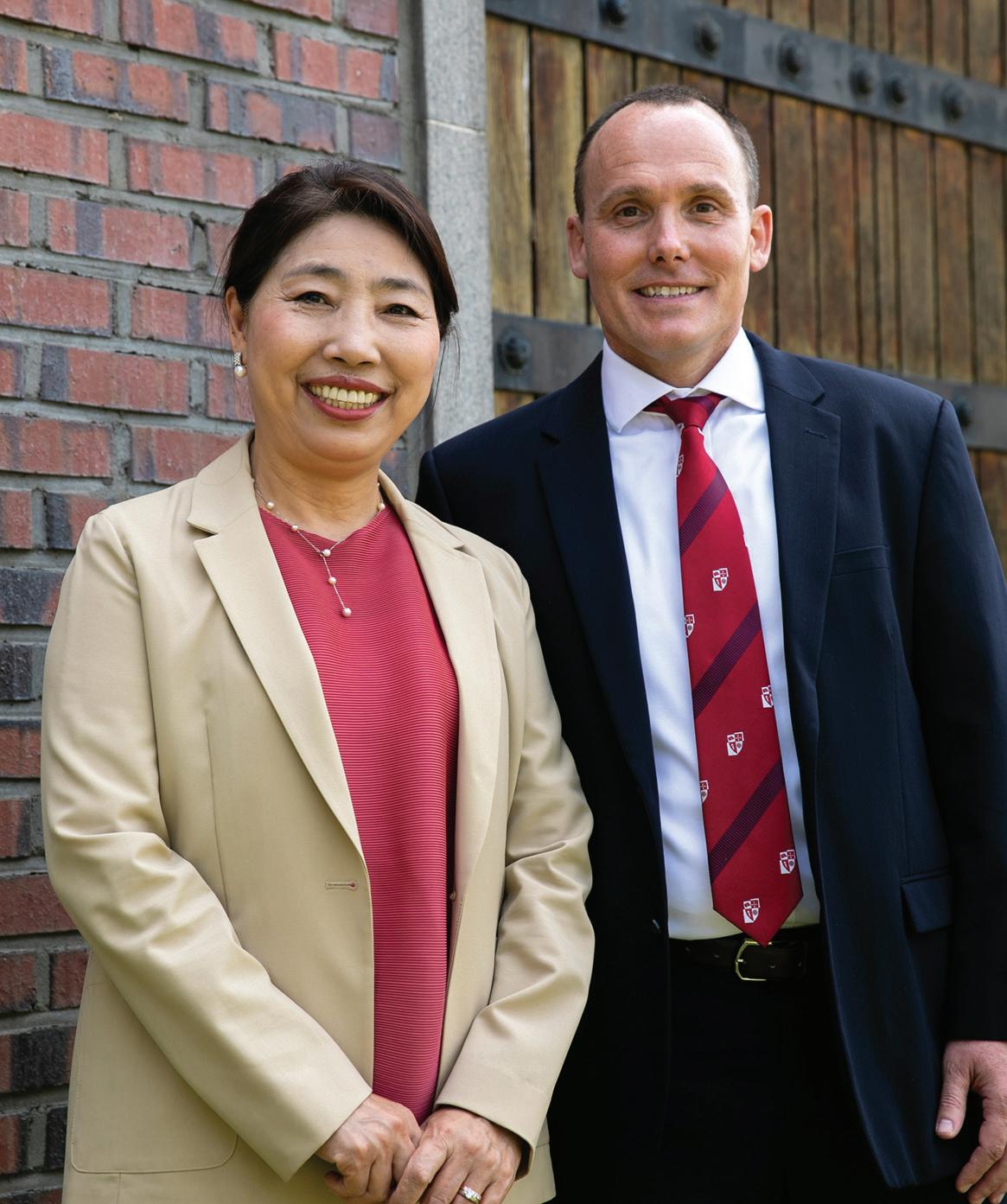
51 Spring 2023 | Communities
Finding Everything: Anatomy of an SFS Teaching Team
By Timothy Fuller Bazin High School Economics Teacher
WhenI found out that I’d have the opportunity to write something for The Banner, I took some time to reflect on what I value most from my first year working at Seoul Foreign School (SFS). This was no easy task, but my mind settled on the thankfulness felt for the time spent working, laughing, and learning with colleagues. God blesses me every day with the opportunity and privilege to work at SFS alongside such a friendly and professional learning community. Much of the collaboration between teachers is invisible to the broader community, so I hope to give the dear reader an insight into the anatomy of my Grade 9 MYP Individuals & Societies teaching team.
The names on our roster include Ms. Martin, Ms. Chung, Mr. Kosh, Ms. Plakmeyer, and Mr. Bazin. Everyone has a role to play. And, as with all great teams, our strengths complement each other.
■ Ms. Martin is the team’s learning support specialist. She is patient, kind, and empathetic towards our students who may need a little extra support. She’s the master at making tasks accessible to everyone.
■ Ms. Chung is the mama that maintains balance on our team. She keeps us on mission and ensures that we are making important links between Korea’s history and the MYP’s globally-minded concept-based model. She also makes it her mission to make sure everyone on our team is being heard.
■ Mr. Kosh is our leader. He provides organizational clarity and initiates the thrust that always helps carry us over the finish line.
■ Ms. Plakmeyer is our doer. She is always first to build new material and pacing guides. Ms. Plakmeyer is also in her first year at SFS.
■ Mr. Bazin, your narrator, is a lowly tinkerer. I try out new methods and techniques. Or perhaps it’s a different perspective that I share. At any rate, my team helps keep my feet on the ground.
Learning is always front and center with this group. We consistently share materials, best practices, and reflect on the teaching and learning process in our classrooms. What might
52 The BANNER | Academics
Comm
unities
most set our team apart from others is that we all enjoy coming to work with each other, and it shows in the way we teach. Our students can feel the positive energy that the team brings to the classroom, and it makes for an exceptional learning experience.
Non-teachers would probably like to know more about our curriculum planning meetings. We meet every Day 5 during Block 1 for about an hour. Our meetings consist of a check-in and then we conduct the business of the day, week, or unit. We also make room for standardization, which is the process by which we share our expectations and understanding of common criteria, and moderation, the process where we review a sample of teacherassessed work in order to establish whether the marking is appropriate. We also set forth our pacing for evidence of learning during this time. We don’t argue. We never finish a meeting early or late, and we always end with a clear plan for the future.
It’s no secret that SFS hires remarkable teachers and spares no expense when it comes to the professional development of those teachers. Less known is probably the extra effort that administrators, like our MYP Coordinator Chris Horan and
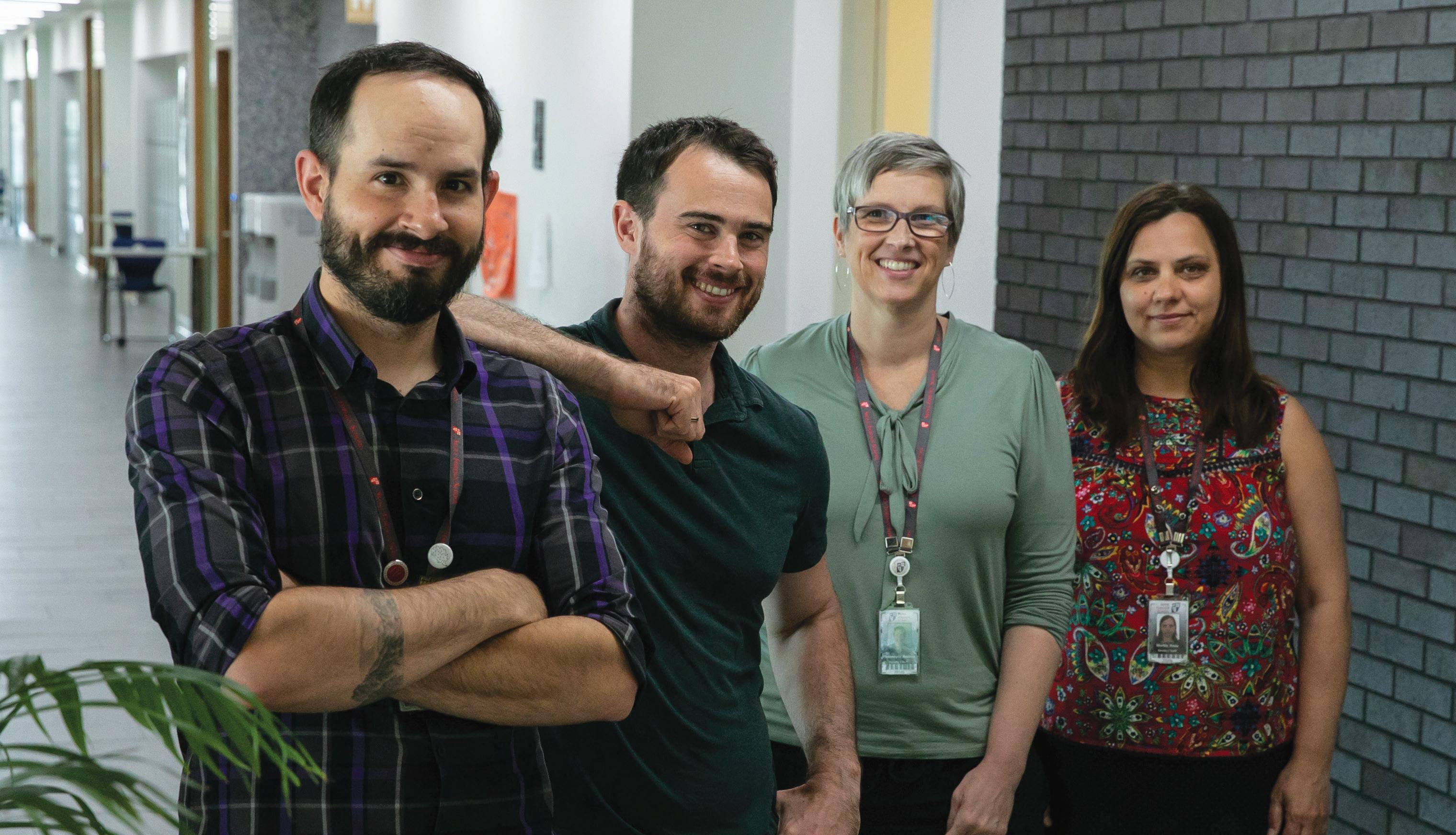
our HS Principal Nancy LeNezet, make to hire and coach for collaboration. Even lesser known to the greater community are the principles that guide our collaboration. These include:
• Our mission guides our actions at all times.
• Every voice matters and every ear listens.
• We assume best intentions and we respect opinions with kindness.
• We agree to value our time.
• We set clear goals and timelines and we are accountable to each other.
There’s really no magic ingredient to making a great teacher team. The simplest answer is that it takes everything: great vision, qualified personnel, supportive leadership, student-centered focus, and compatible personalities. Take it from someone who's been around, SFS is a special place where the teacher community truly is greater than the sum of its parts.
53 Spring 2023 | Communities
Grade 9 MYP Individuals & Societies teaching team: (from left to right) Mr. Kosh, Mr. Bazin, Ms. Plakmeyer, and Ms. Martin (missing Ms. Chung.)
A Fable for Korea
By Jennifer Gray High School Drama Teacher
Onceupon a time there was a woman old enough to have a credit card and young enough to be careless. She’d had a credit card for many years and, on two occasions, it had been stolen; once at an international airport and once on the street in Maputo. In both instances, she’d canceled the card.
This year, a week before Christmas, the woman was in the Seattle Airport, on her way home from Seoul. She ordered a drink between flights, and when she went to pay for it, she couldn’t find her Visa card. After emptying her purse and pockets, she informed the waitress, who graciously insisted the woman consider the drink a Christmas gift. Whatever else went through the woman’s mind, she never once considered canceling her card, for she knew one thing for certain: the card had not been stolen. Most likely it was lost somewhere in Seoul, and if found, she was confident no one would use it. That’s the comfort of Korea. The woman had never been concerned, for example, that her purse might disappear from her office or her home. If inadvertently left on the subway, she was confident it would be turned over, intact, to the proper authority.
During her holiday, the woman continued to monitor her credit card activity but, as anticipated, there was none. When she
returned to Seoul in January, she expected to find the card on the floor in her house and, when she did not, she decided to check the few stores she’d visited prior to winter break. At Saruga, they searched the tills and asked her name and number, should the card turned up. At the bottom of the hill leading strenuously to school, there’s a stationery shop she’d visited for Christmas paper, and when she’d offered her Visa card, they’d asked for cash.
She thought it a long shot, but popped in, just in case. The cashier spoke some English, but the woman was unable to make herself understood. She showed the cashier her Korean bankcard with her name imprinted, but the cashier was unsure what the woman wanted her to do with it. A customer volunteered to translate and the woman explained the situation, though not well enough, as he too was confused. After a few minutes of unproductive banter, something tweaked, and the cashier grabbed something on the shelf behind her. Then she turned and handed the woman her Visa card.
Message:
In the Land of the Morning Calm, your credit card is safe from harm.

54 The BANNER | Academics
Comm unities
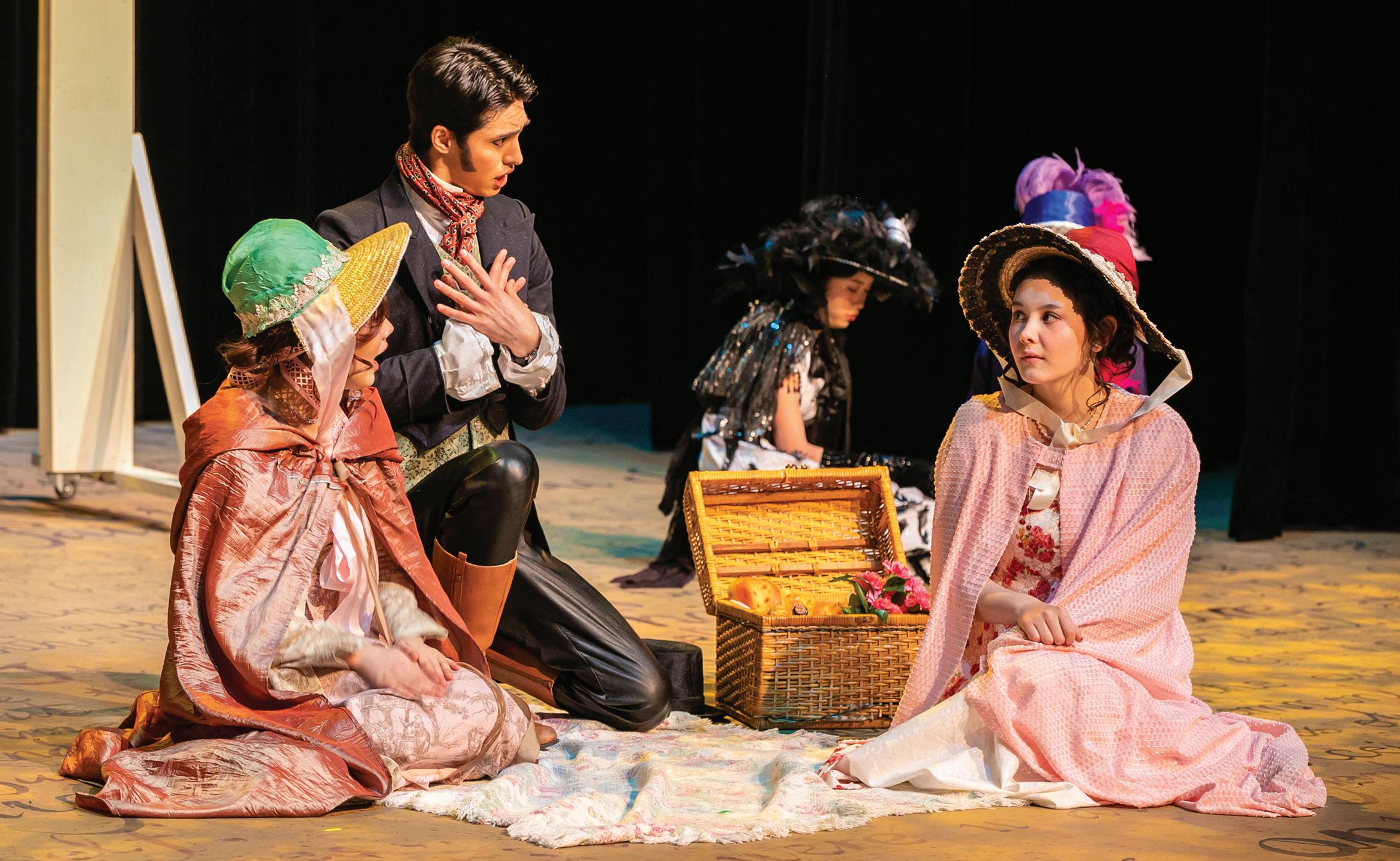
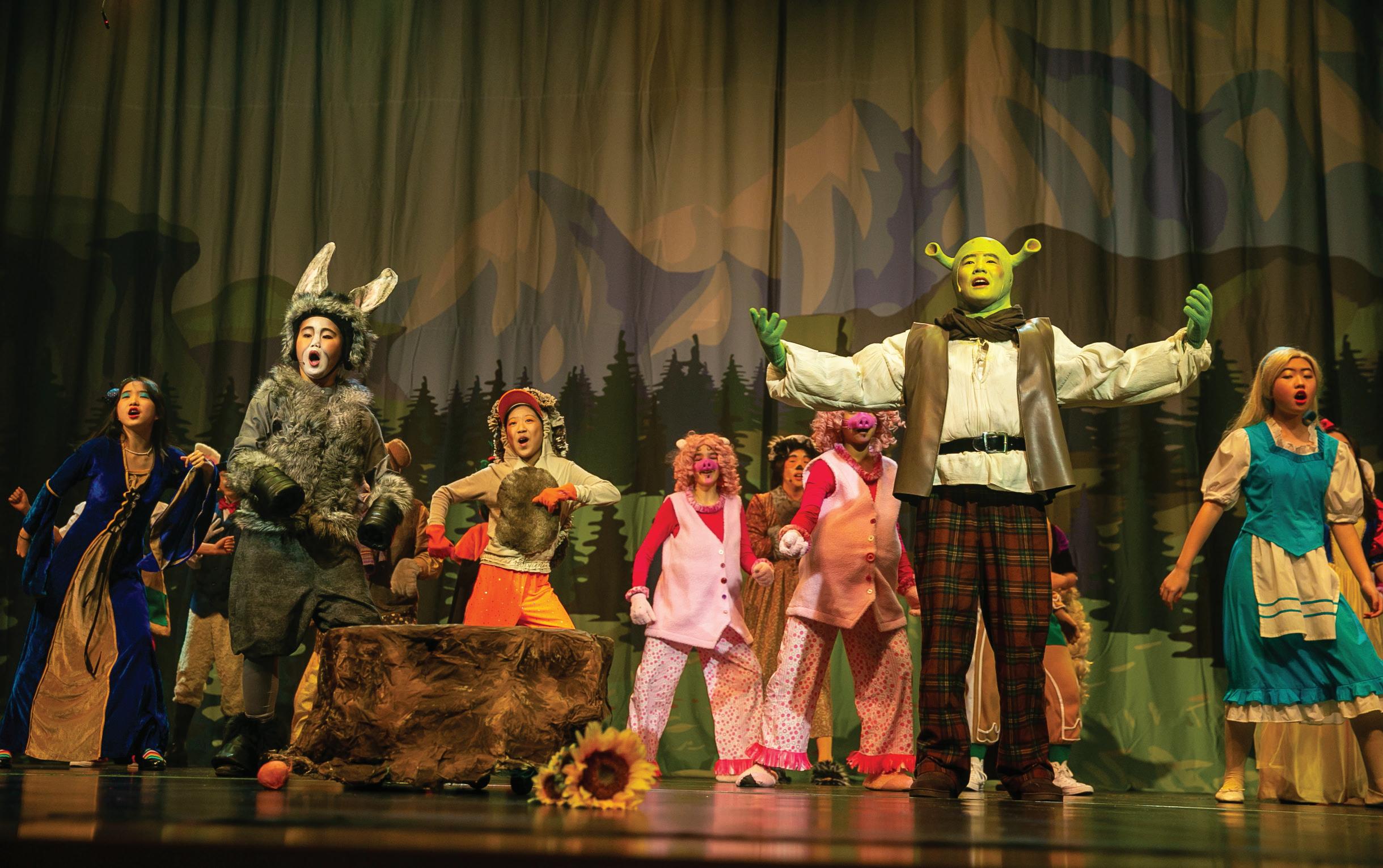
55 Spring 2023 | Communities
(Above) Hish School spring play Sense and Sensibility. (Below) Middle School musical Shrek Jr..
A child of war, a man of peace
By Natalia Federighi de Cuello SFS Board of Governors Member British School Parent
There is one great Korean who has given so much to the world and who happens to be alive. His name is Ban Ki-moon. Born in poverty in a thatch-roofed hut (Eumsong county, 1944), he rose to become Foreign Minister and won the elections to serve for two terms as the 8th Secretary General of the United Nations (2007-2016).
Ban Ki-moon was barely six when he had to hide from the falling bombs of the Korean war, facing hunger, internal displacement, and the risk of illiteracy.
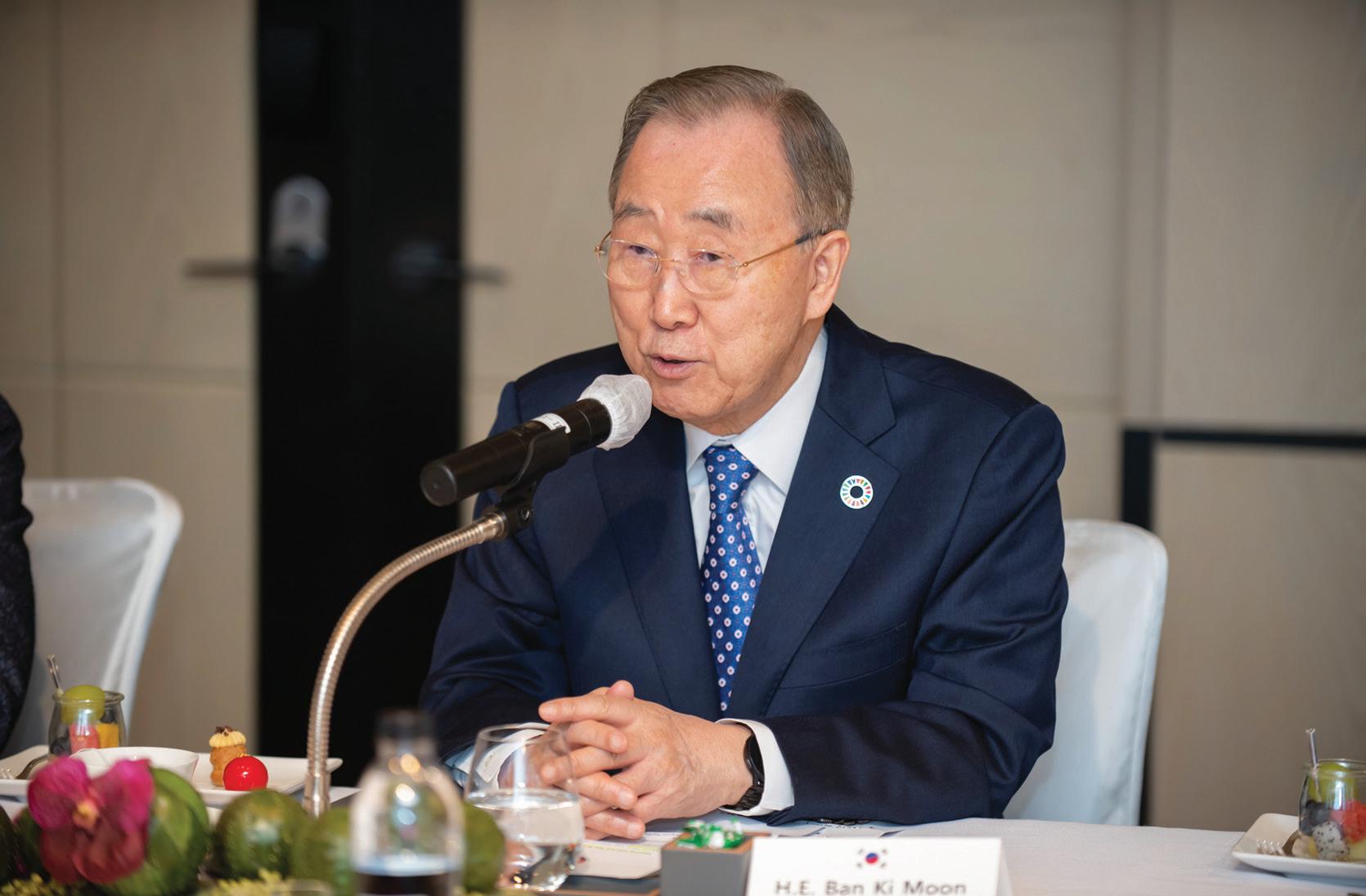
His life story exemplifies our school’s mission in action. Humble and determined, he championed the world’s vulnerable by putting Sustainable Development, Climate Change and Gender Equality at the top of the UN agenda.
As part of the Seoul Foreign School community, I believe our duty is to get to know him better, to be proud about his legacy and to contribute to its implementation.
The cruel Korean war turned Ban Ki-moon’s world upside down. He had to escape and walk for days looking for a safer place in Jeungpyeong where his grandparents’ house was in a mountain at the edge of a forest not accessible to the fighter jets.
He still remembers well the feeling of strong fear caused by the armed conflict, and the difficult journey escaping by foot with his family. His mum was nine months pregnant, having to move slowly amidst the snow and the lack of food.
This early experience tempered his character, becoming since then the man of peace we came to know later in his many diplomatic responsibilities at the Korean Ministry of Foreign Affairs as well as the 8th Secretary General of the United Nations.
The United Nations flag gave him hope and meant to him and his family the safety, security and sustenance they needed amidst the ongoing conflict. For the United Nations saved many Korean lives, by providing education, food security and shelter until and after the fighting stopped.
Ban Ki-moon’s life of service 46 years as Korean diplomat and 10 years in the UN as SG were interrelated to all these experiences and his early years of war. As a result, Ban Ki-moon’s devotion to peace and encouragement to restore trust among us (east-west and north-south). Peace and security are among the interlinked pillars of the UN Charter. Without peace, neither development nor human rights are possible.
Ban Ki-moon’s mother went into labour when they were still on the roadside escaping from war. Fortunately, a family in the nearest house took them and helped his mum. But three days later she had to continue walking miles on a snowy road with her newborn baby in her arms.
Inspired by the strength and example of his mother, Ban Ki-moon has supported women along his entire career, fighting against inequality and injustice, creating UN Women, and appointing more than 150 women in important senior levels within the UN and in Korea.
He feels especially proud of the Global Education First initiative he led to use the transformative power of education to build a better future for all by putting every child in a school, improving the quality of learning, and fostering global citizenship.
In the construction of the global development framework for 17 sustainable development goals (SDGs), a large set of stakeholders were involved for the first time, including civil society and the private sector.
The innovative ways of multistakeholder coordinated action that UNSG Ban Ki-moon facilitated (i.e. “Zero Hunger Challenge initiative”, “Education Above All” etc.) represented a level never seen before in the UN, with global sustainability initiatives and platforms bringing resources to truly scale up efforts.
Delays resulting from recent unforeseen disruptions, such as the war in Ukraine and the COVID-19 pandemic have delayed SDG compliance by 2030. As things stand today, it might be 2050
56 The BANNER | Academics
Comm unities
in Asia, 2063 in Latin America and 2100 in Africa by the time the world is able to meet the SDGs.
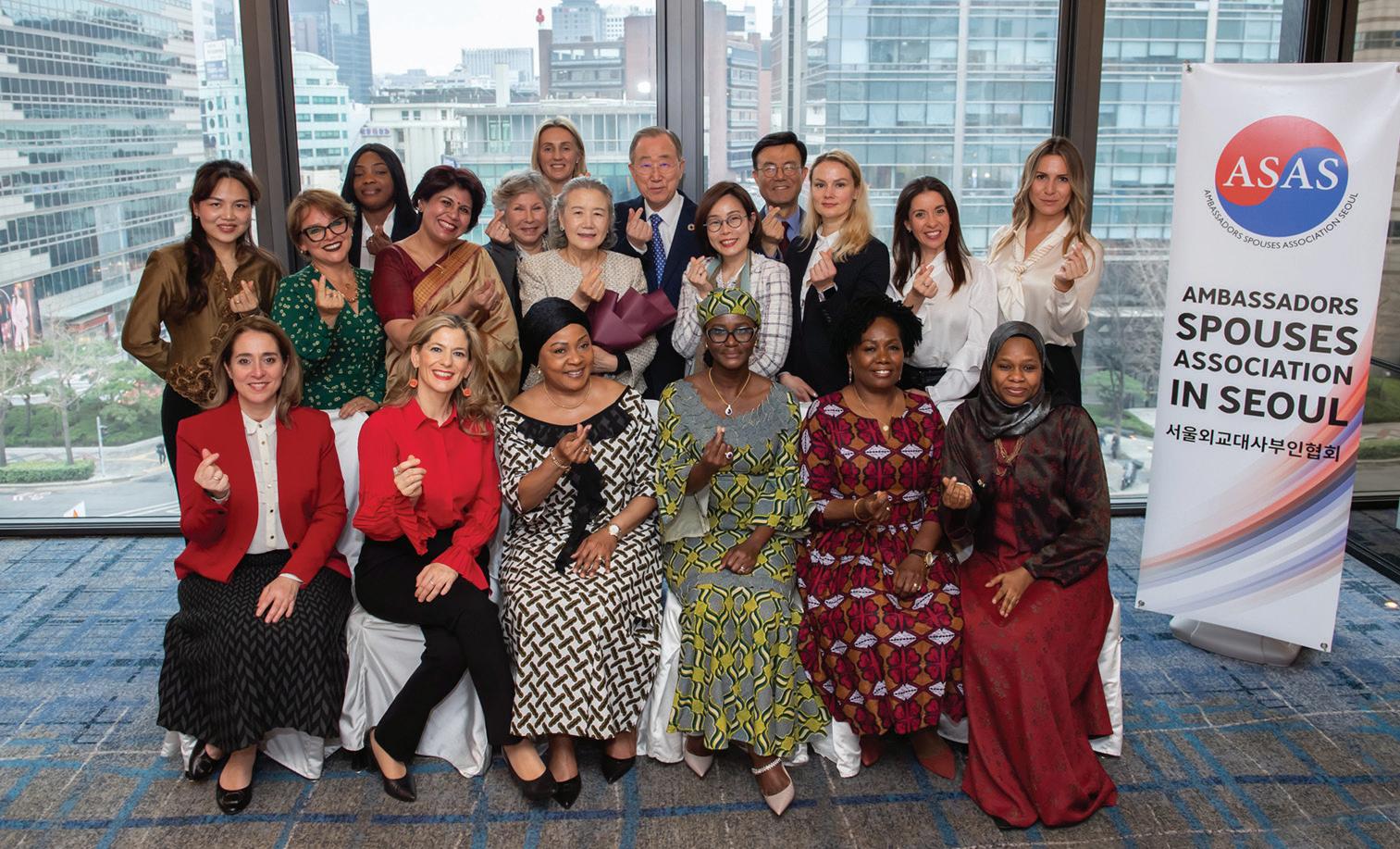
However, Ban Ki-moon’s main concern is with Climate Change, for which he was able to achieve a consensus response in the form of a treaty, the Paris Agreement (2015).
“Meaningful Climate action is number one priority. Human extinction in a hundred years is a threat without a total change. And it will be the 6th time in the history where a massive extinction happens”, said Ban Ki moon to the spouses of the ambassadors appointed to the Republic of Korea last 15 March 2023.

Regarding the Paris Agreement, he is also disappointed for the lack of political will and how developed countries have not kept their commitments and promises on funding for climate adaptation for those countries most affected by increased temperatures, rising sea levels and the stronger acidity of oceans.
Without adaptation, island countries such as the Dominican Republic will be left without beaches. Even the island of Manhattan in New York may be totally flooded. Hurricane Sandy in 2012 was an advanced warning of the dire times that may be ahead. So were the torrential rains flooding Gangnam in Seoul last August.
No country is safe from the ravages of climate change. Ban Ki-moon is now President of the Assembly of the Global Green Growth Institute (GGGI), where countries work together to transform their economies with a view to becoming carbonneutral. “Carbon neutrality by 2050 is a must”, he said.
Without further action the consequences of the increase will be devastating, and we are already seeing with the weather patterns (serious droughts and fires, ice melting in Antarctica and North Pole, the raise of see level…). “We don’t have time to lose; nature is telling us that we are taking the wrong direction”, he said.
He encourages the young to be activist, to build bridges, to speak out against injustice, and to work harder to raise awareness and public opinion to the political leaders about the important problems in the global agenda, strengthening the sense of urgency on climate action since we are on the verge of irreversible changes that can completely undermine the future of the life on the planet as we see it today.
His mission continues today as the voice of the voiceless and the defender for the defenceless and hopes that the young who will serve as future global leaders, also have grand dreams and long-term visions. “It is important to live with a purpose and to foster cooperation, tolerance, empathy, and action. The challenges we are facing are unprecedented and solidarity and compassion are a must”, he said.
You can learn more about this wonderful leader at the Peace Museum built in 2018 surrounding the house where he was born, as restored by the Korean Government. I also recommend you read his recent book “Resolved: Uniting Nations in a Divided World” that came out in July 2021. It is a wonderful way to learn about his legacy.
Ban Ki-moon is still very active and in touch with most important heads of state, CEOs and civil society leaders. You can engage with him through Ban Ki-moon’s Foundation for a Better Future (Seoul), his Centre for Global Citizens in Vienna and his Centre in New York. He is also Deputy Chair of The Elders, President of the Global Green Growth Institute (GGGI) in Seoul and Chair Professor at Yonsei University (“Ban Ki-moon Centre for Sustainable Development”).
Natalia Federighi is member of the Board of Governors at SFS, President of ASAS (Ambassadors Spouses Association in Seoul), member of the Board of the Garden Club in Korea, volunteer at Open Arms Korea and Spouse of the Dominican Republic Ambassador. Her two children study at the SFS British School.
57 Spring 2023 | Communities
Letter from Alumni Relations
Leaving for university after SFS can be an unnerving prospect. New graduates are faced with the challenge of transitioning from the familiar environment of SFS and Korea to the uncertain world beyond at university. This is often compounded by moving to an entirely new country where graduates also have to adjust to a new culture. The benefits of having an advisor during this time cannot be overstated. A mentor can provide valuable guidance, support, coaching, and advice that can help young people navigate this transition period.
Recognizing the importance of mentoring for our graduates, the SFS Alumni Association is launching a new mentoring program called Mentor Point. This program will match each graduating senior with an alum mentor for 6 months after graduation based on either university location or career interest. The alum mentor will work with a small group of students and will be available to offer support and guidance during this crucial time of university adjustment. The career mentor can offer advice on career paths, networking opportunities, and other practical matters that will help graduates make a smooth transition into the workforce after higher education.
The benefits of having a mentor are numerous. Mentors can share their own experiences with graduates, offer insights into their chosen profession, and help college students develop the skills
SFS Global Connect
they need to succeed in their chosen field. The importance of building a strong professional network has been emphasized with the seniors through multiple channels this semester. For example, statistically Gen Z stays at any given job for 2.3 years on average in the USA, with each move potentially bringing benefits in terms of salary and/or responsibilities, and young alumni can tap into the broader SFS community to aid their journey up the career ladder.
In addition to the practical benefits of mentoring, having a mentor can also provide emotional support during this time of transition. Alumni mentors can offer advice on how to deal with setbacks, and be sounding board for ideas and concerns while offering encouragement. They can help graduates navigate the challenges of post-graduation life and develop the resilience they need to succeed in the long term.
Mentor Point is an excellent resource for graduating seniors. By providing a mentor for every student, SFS is demonstrating its commitment to the success of its graduates and its belief in the strength of our alumni community. If you would like to learn more about being a mentor for a recent graduate, please contact me at eric.dehaan@seoulforeign.org
Eric DeHaan Director of Alumni Relations
SFS Global Connect is a private platform connecting alumni. The robust tool combines many of the features of Facebook, Instagram, and LinkedIn into an online space for alumni. You can look up and email friends via the directory, post and comment on photos, add to the feed, as well as check out all the events for alumni both in person and online. Access SFS Global Connect today at sfsconnect.com or by scanning the QR code.

58 The BANNER | Alumni
DOWNLOAD THE APP GLOBAL CONNECT Seoul Foreign School Celebrating 40 years of the British School, 40 years of IBDP & the 110 th anniversary of SFS
Interview with Youngme Moon '82
By Cyrielle Bazin Director of Communications and Marketing
Alumna Youngme Moon ‘82, who describes herself as a "lopsided person," has achieved an impressive career trajectory since her days at SFS, which were more tumultuous than one might expect from a Harvard Professor. Her unique perspective on success adds a refreshing twist to her captivating interview. Youngme's retrospective on her time at SFS highlights the invaluable lessons she learned through her participation in extracurricular activities and guidance from exceptional teachers. Her well-roundedness and collaborative spirit continue to shape her both professionally and personally, establishing her as a formidable presence in academia and beyond. Brace yourself for a tale of inspiration from this incredible SFS alumna!
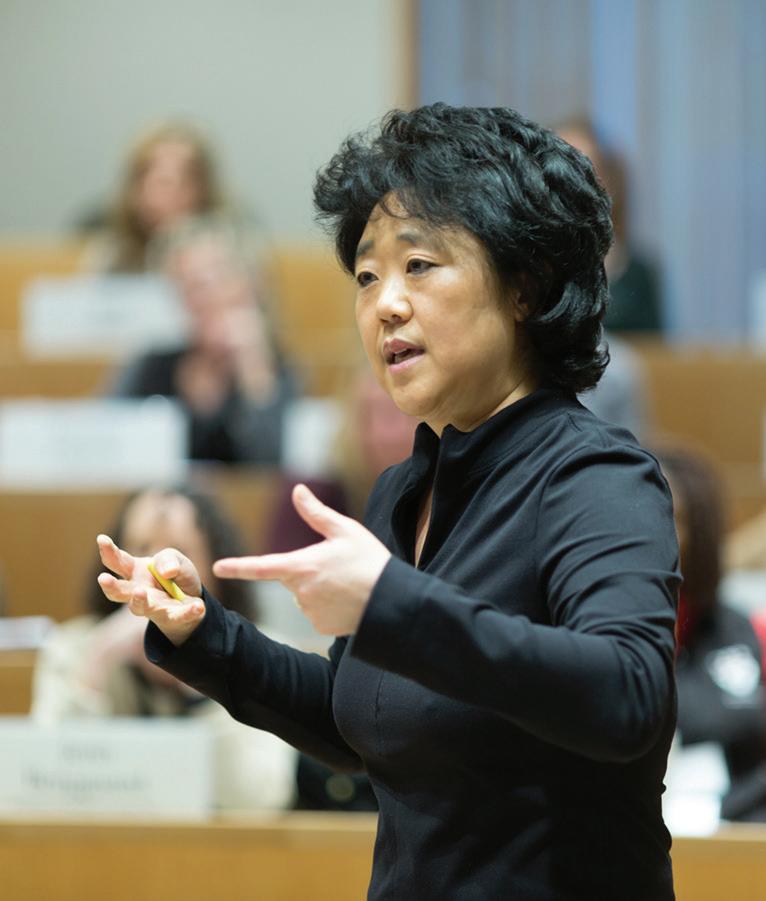
Q: Youngme, thank you for connecting with us today. Let's start from the beginning. Can you tell us when you attended SFS and how long you were there for?
A: I started in third grade. I was born in the US, and right before I started third grade, my parents moved back to Seoul, where they are originally from. I think they did not want me to lose my English. And I think they always had aspirations for me to eventually end up attending university in the United States. And in addition, I have two sisters. So there were three girls, and I think they recognised that the opportunities for women in Korea were really rather limited. And I think they wanted us to feel like we could be anybody we wanted. I graduated from Seoul Foreign, so I was there the entire way through, with a year or two back in the US. But for the most part all the way through high school until I graduated in 1982. My graduating class was much smaller. I mean, there were only a few dozen of us graduating, it was very small, and the school was much more physically humble than it is right now. But still, I have very fond memories of the place. And it was obviously some very formative years for me.
Q: So you graduated in 1982. And then what happened after that? What was next?
A: I came to the US for university. I studied political science at Yale. Then, after graduation, what did I do? I did a bunch of stuff. I really believe that your 20s are for exploration and for trying different things and for getting a little bit out of your box. So I did lots of different things. I sort of ended up working as a producer for CBS News. And I guess that was the bulk of what I was doing professionally in my 20s.
At a certain point, I realized I became very interested in technology and media, and the business of media and technology. So I went to Stanford for my PhD. Then, I entered academia. My first academic job was on the faculty of MIT. I wasn't there very long, only for a year. Then I moved to Harvard, and I've been at Harvard School since then. It's been a really wonderful and really flexible perch from which I can do many, many different things.
Q: How do you reflect back on your time at SFS?
A: When I went to school, it was far from perfect, and I don't want to pretend that I loved every aspect of it. I mean, who does, right? I got in trouble quite a bit. I was quite a handful, and I think my visits to the principal's office can probably confirm that. But there were a couple of things that were really extraordinary.
One was that it was such a small school, and yet it offered so many extracurricular activities. As a result, everybody did something, whether it was some kind of sports activity, yearbook, chorus, or participating in a play. A lot of us did many of those things. So it was like a Venn diagram of overlapping circles because we all participated in these different
59 Spring 2023 | Alumni
activities. It helped me develop a well-roundedness to what I was interested in and interact with lots and lots of different people, which was really important.
The second thing was that I had two teachers in high school that were really instrumental in creating a standard of excellence for me academically. Jack Moon was one of them, and the other was Lois Rankin, who taught me calculus. She was extraordinary, and I just learned so much from her. I never thought of myself as being a studious person, but she cultivated a sense of seriousness, of purpose with respect to learning that went far beyond thinking about grades or anything like that. And then Mr. Moon was just so tough. He was the toughest grader in the school. He pushed us really hard, and yet he was such a decent fellow. He was warm and affectionate. Those two really stood out for me.
When I went to university, I faced many challenges, but none of them were academic. The challenges were all about adjusting to a different environment and trying to figure out who I was. But academically, I felt like I was really ready to compete as a result of having those two teachers. So when I think back to SFS, it's really formed by those experiences.
Q: How did these experiences contribute to the person you became?
A: Let me give you an example. When I was in high school, by the time I was a senior, I was ready to take calculus. There were just three of us, myself and two other classmates, who were ready. So Miss Rankin taught us calculus. Every day, we would walk in and sit down at one of the student desks. As a class of three people, she would make each of us go to the boards, and she would give us a problem to solve. We would stand next to the boards, read the problem, and spend basically the entire class trying to figure it out. Because we were writing on the board, we could see each other's work and talk to each other, so it was like solving a puzzle together. Miss Rankin would sit there and could see all of our boards, so she could simultaneously give us a little coaching or advice on how to add it.
It was the first time as a student that it wasn't about the grade. It was just about how to figure the problem out. It was very collaborative. She would give us one problem for homework, and we would call each other at night to discuss how to solve it. It felt like solving a mystery every day. I never felt like it was work. It was challenging intellectually and personally. I remember feeling empowered and different by the time I finished that class. I don't
even know where the learning happened; it was invisible. There was never a point where I remember her lecturing us or actually teaching us something, but somehow, she taught so much. It was really a very special experience, and I will never forget it.
I find myself in front of a classroom all the time now, and I often think about that feeling of empowerment that she somehow managed to give us. She would throw things at us and just expect us to be able to figure them out. Whenever she saw that we were really stuck, she would step in with just the right amount of coaching and instruction to get us on the path. Every time we were able to figure it out, we felt a sense of empowerment. She was fantastic that way. I hope every student has one teacher like that before they finish school. Not all teachers can be like that, but if you have one, all it takes is one to give you a sense of what you can do and what you're capable of. It's really very special.
Q: You wrote a book on the topic of brands competing with one another to outdo each other. Do you believe that the idea of excessive competitiveness can actually hinder improvement? And do you think this concept can be applicable to the life of a high school student applying to universities?
A: I discuss the concept of differentiation in my book. It is the opposite of homogeneity and can be applied to the educational system, which tends to breed well-rounded kids. I remember when my oldest child started school, he was a teacher's pet and was loved by his teachers. However, when my younger child started school, her kindergarten teacher told me about her weaknesses, such as her atrocious handwriting and lack of penmanship. The teacher tried to encourage me to think of my daughter's weaknesses and strengthen them. However, I pushed back against the teacher and said that my children have different strengths and weaknesses, and that lopsidedness can be an advantage. As a lopsided person myself, I have found that it has played to my advantage throughout my career. I believe that the world can accommodate both types of people, and our educational system should recognize and encourage students to embrace their strengths and who they are.
Q: What advice would you offer to high school students who are currently in the process of figuring out their place in the world? A significant portion of that relates to their university choices and grades, what advice would you give them?
A: So, I would say a couple of things. One is that there are many paths to success, and it's easy to fall into the trap of thinking that
60 The BANNER | Alumni
success means following a specific formula, like going to a certain school, majoring in a specific subject, and achieving certain grades. But as someone who has met many successful people, I can tell you that everyone's story is different. It's fascinating to hear how some successful people describe their high school experiences and how they started out as screw-ups or almost got kicked out of school. I almost got kicked out of SFS multiple times myself!
The second thing is, time is limited, and it's important to explore various options while you're still young. When you're 40 or 50 and settled down with a family, it's challenging to drop everything and try something new. Try it while you're young. My kids are young adults now. And I say if you're gonna do crazy stuff, do it now, like this is the time. And so, to play it safe now is absolutely absurd. I think there are very few people on the planet, who have the luxury of getting to choose. And if you happen to be one of those lucky people, and that includes 100% of the kids who go to SFS, and to squander it by doing the same thing, every time is such a waste of human potential. Don't be afraid to step out of your comfort zone and try new things, even if they seem scary or unconventional. The more experiences you have, the better sense you'll have of what really resonates with you. And once you find that thing that feels right, it'll just click, and you'll know that's what you were meant to do. It might take some time and exploration, but I have confidence that you'll find your way there. That's really what I was getting at.
Q: What was that thing for you?
A: In my 20s, I did a lot of crazy things and through those experiences, I learned a few important things about myself. First, I realized that I'm a rebel at heart and don't like having a boss. Second, I also discovered that I didn't enjoy being a boss either. I found that I got irritated easily and wasn't cut out for managing people. Instead, I knew that I needed to find something that was more entrepreneurial and allowed me to work independently. Originally, I pursued a PhD with the idea of starting my own consulting business. However, I ended up in academia and discovered that I enjoyed coaching, mentoring, and teaching.
One of the things I love about being a faculty member at Harvard Business School is that you can build a unique portfolio of activities based on your interests and strengths. I've been able to create a portfolio of activities that I absolutely love, such as enabling other people's success, unlocking their potential, and coaching businesses. Every faculty member has their own unique
set of activities that can change from year to year, making it a dynamic and exciting environment.
Q: Tell me, how does a quite rebellious student at a school in South Korea end up being on the board of some of the most esteemed companies in the world and being a Harvard professor?
A: Well, first of all, I'm not nearly as impressive as you make me out to be [laughs]. I believe high school years are a crucial period for self-discovery. Looking back, I think a lot of my behavior during that time was an attempt to uncover who I truly was. I acknowledge that there were times where I was immature and acted like a jerk [laughs]. I had to learn to be more responsible, kind, and empathetic. So, when you find yourself in conflict or hitting a wall, it's essential to identify the source of the conflict. Some conflicts come from a place of integrity, while others stem from immaturity.
Regarding academics, I believe academic performance and intellectual engagement are two different things. To have an impact on the world, you need to find a way to become emotionally, mentally, and intellectually engaged in your surroundings. If the classroom setting doesn't work for you, then you need to find a different context to showcase your engagement and contribution. It's not enough to blame the educational system for poor grades; you need to find something that works for you.
Q: And what would you say to our young female students who are trying to find their place in the world?
A: Oh, the world is their oyster, I promise you, the world is their oyster. Here's the thing: there's not a day that goes by that I don't say two things to myself. One, every single day, I think - it is so hard to be a woman, it is so hard to be a woman. And then the second thing I say to myself every day is - it is so awesome to be a woman. I mean, it is so awesome. So every day, I experience both of these things, sometimes simultaneously, it is so hard, it is so awesome. And one of the reasons it's awesome is that I get to interact on a different level with other amazing women. And in my case, I get to interact in a really intimate way with other Asian women, because I'm an Asian woman, and it's a very, very powerful kinship. And so there's something really magical about that. They can be world beaters, and I have full confidence in them.
Thank you so much Youngme!
61 Spring 2023 | Alumni
The Next Big Thing: Chloe Son '17
By Eric DeHaan Director of Alumni Relations
Son ‘17 is a theater enthusiast and a computer science professional. In this interview, Chloe talks about her background, her involvement in various activities while at SFS, and her journey from being Salutatorian to pursuing her interests in STEM. She also shares her thoughts on the current state and future of augmented reality, and her work at Naver Labs.
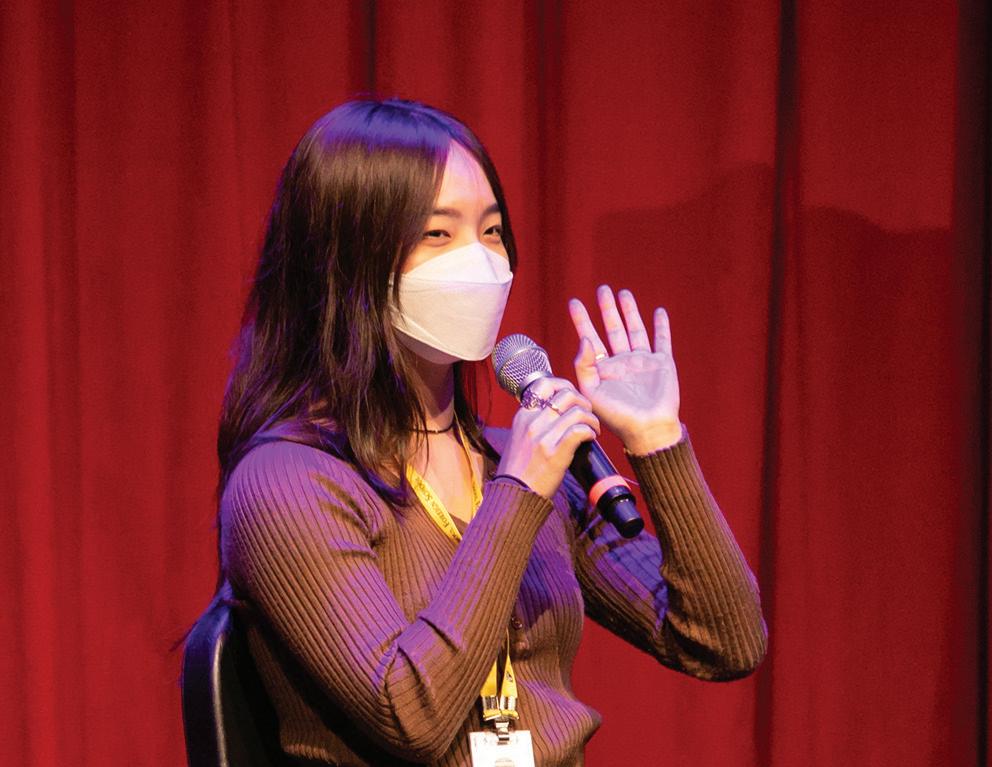
Q: Chloe, please tell us a little about your background, and your time prior to your SFS experience?
A: I was born and raised in San Jose, California, in the Bay Area near San Francisco and lived there until I was around ten or so. It was a very suburban, Americanized upbringing with my family. I didn't have a lot of exposure to Korean culture, despite being ethnically Korean.
Q: When did you start at SFS?
A: When I first came to SFS, I started with Mrs. Kuhl's class in third grade. I still remember her, and she still remembers me. It was a very wholesome class.
Q: You were involved in many activities while you were at SFS. Tell us a little bit about that.
A: I was known for being a theater kid at SFS. I did a lot of theater with Mrs. Moon, performing in a lot of musicals. I was one of those elementary school kids back in the day who would go to the Lyso Center and watch the high school productions. I would be so into all of them that I would take the program and go backstage to ask for all of their autographs. I still have them all. To me, those performers were like celebrities, I still remember their names. I looked up to them so much, so to be in high school, and to be one of those performers felt very much like full circle. I also did TASSELCambodia, which is a service club that works to provide education for Cambodian children and Cambodian teachers. I liked the mission so much, I continued to serve with it after graduation and still work with TASSEL to this day.
Q: You were Salutatorian. Do you remember that experience?
A: That was a huge surprise. I did study hard, but because I was so busy with extracurriculars I really didn't think about it. I had no idea I was Salutatorian, so it was a huge, very pleasant surprise.
Q: Is there anything you would change about your SFS experience, or anything you would add to it?
A: I don't know how I would change this, but I do wish that I had spent more time with friends. Every single day of the week, I had a lunch meeting; then, after school, I had all these extracurriculars, musical practice, forensics, and choir practice. After that I would go home, do homework, and go to sleep. So I didn't spend any time hanging out with friends. I wish I had done that more because I actually got closer to my high school friends after graduation. They're all such amazing people, and I wish I'd gotten more time with them while we were still physically in the same space.
Q: How was your transition to Dartmouth?
A: It was terrifying. I remember that first day, the moment my parents drove away, I went back to my dorm room and started crying. It was all so scary at first. But then I found my way. Everyone I knew in college found their place, myself included. To this day, I think Dartmouth is one of my favorite places ever, because everyone there is so supportive of each other's intellectual growth. Everyone wants to help each other get jobs and get the career that they want. It's my favorite place.
Q: How did you get involved in the STEM field?
A: My original academic focus was more on the humanities. I was very much the kid who was always reading, all day long. I wanted to do something creative originally, and I didn't have any thoughts of doing anything STEM related. But then I thought, I kind of want security in the future. When I thought about doing a fully creative job I wasn't exactly okay with the instability that came along with that. So I thought, how can I marry these two things that I want in a career together?
I decided I wanted to become a video game developer in my sophomore year of high school because it had storytelling, it
62 The BANNER | Alumni
Chloe
had the creative aspect in design, and those things led me to programming. I figured that, if video game development didn't work out, I could go into software development. So that's how I started to develop an interest in STEM, because I was first interested in storytelling.
Q: What did you study in college?
A: I graduated with a Bachelor of Arts degree for computer science modified with digital arts.
Q: When we think of augmented reality (AR), what comes to mind is games like Pokémon Go. Where is the field now and where is it going in your opinion?
A: I think AR is really cool. I think a lot of people don't realize this, but when you open Snapchat and you have all of those filters to choose from, that's also augmented reality. The software has been getting a lot better over the years, and my company, too, is developing cutting edge software.
I think we're all waiting for that AR breakthrough, because you don't see a lot of people actively using AR right now. I think the main reason for that is that there's not currently a staple hardware that you use for AR. Right now people use their phones for things like Pokémon Go or for filters.
The thing about AR, though, is it's supposed to be 3D, and the 2D display on your phone doesn't maximize the potential of AR. The technology people are waiting for is AR glasses, which are still very much in development. I think once those get released, then AR will really have a breakthrough.
Q: You work at Naver Labs, which is a Research and Development subsidiary of Naver, where you're working on future technologies and research in Korea and Europe. Given your role, are you able to share any interesting projects that you know about and you are working on?
A: I work on the AR team and the project that I'm working on right now is regarding AR navigation. When you have applications like Naver maps or Google maps, you can program your route from home to school, and it shows you how to get there. But we're making an AR version of that.
It’s very much a progressive technology and very innovative. I think that one day it's definitely going to replace the conventional phone app navigation. I'm very excited about that. We're also a Robotics Lab, which means we have a lot of cool robots roaming around. If people want to come to our company building at Naver Labs, we have a Starbucks on the second floor that you can go to, and a robot can deliver your coffee.
Q: How do you balance creativity and tech?
A: I think one of my strengths is having that balance. At work, I'm a software engineer but we also have designers on the team. It’s really helpful that I understand the designers’ part, as well. I know that they have creative dreams that they want to make come true, and they might need certain tools to make that happen. I'm able to bridge the communications between groups saying, “This is what our technology is currently capable of, and this is what the designers want. How can we have a goal that understands both of these perspectives?” I also balance out how I express my creativity personally as much as I can. I go home and I like to write video games, or I read books, or right now, I'm trying to develop my own video game, too. So I’m always seeking that balance.
Q: Tell us what it is like being a woman in tech?
A: This is my personal perspective; every other woman's perspective working within a tech team might be different. I feel so incredibly lucky because my team is definitely mostly men, people who are of the male gender. They treat me with so much gentleness and respect. I've never once felt discriminated against as a woman in my workplace. I also really appreciate that there is another woman developer on our team. I think what's great is we just have fun communicating and complimenting each other, and it's fun because we can talk about the things that we enjoy, we share that bond. I'm grateful for her presence. I would say from my personal experience, overall it's been really respectful. If there's any woman who feels worried about joining the tech culture because it's dominated mostly by men, that has not been my experience, and I hope it is not your experience in the future. I really encourage you to try it out.
Q: Anything additional you would like to share with the greater SFS community and the Banner readers?
A: I want to share something with the current students. I hope people don't see Dartmouth College and “software engineer”, and think, oh, this person was really smart, and they easily got to where they are now. When I was in high school, I was stressed all the time and I always thought I wasn't doing that well. There were a lot of nights I was crying in my room, thinking that it was so hard and wondering if I was ever going to make it. I want students to know - it was not easy, and if you feel like you're failing, there's a pretty big chance you're doing better than you think. I hope that can be an encouragement to current students who are struggling in the intense academic environment of school right now.
Wonderful; thank you so much, Chloe!
63 Spring 2023 | Alumni
Class Notes
The Banner always welcomes your Class Notes and submissions. To submit, please reply to emails or send notes to eric.dehaan@ seoulforeign.org.
Magali Filipuzzi Chuffart ’93 participated, with a friend, at the Rallye Aicha des Gazelles in Morocco. An off-road rally, organized by women, for women. No GPS and no phones for navigation, only old-fashioned navigation with a map and compass. A mix between old and the modern world!

charge of all radio communications equipment. He has also overseen many of the technology improvement projects for the LAPD, especially in the area of trying to go paperless.
Gene Moon ’93 would welcome any SFS Alumni to look him up while in the Los Angeles area. His contact details are on sfsconnect.com. Gene was on campus as the APAC Orchestra Festival Guest Conductor with Eric DeHaan, Director of Alumni Relations, and Jack Moon.
Anna Cho ’96 remembers Ed Lee ’96, who passed away, as a beautiful soul. Ed is second from the left with Richard Vaughn ’96 to his right, Anna Cho ’96 to his left, and Dukki Moon ’96 at the end.

SFS classmates of 2003, Ted Kim ’03, Brian Park ’03, Joon Lee ’03, and Andy Oh ’03 are still at it after 20 years!
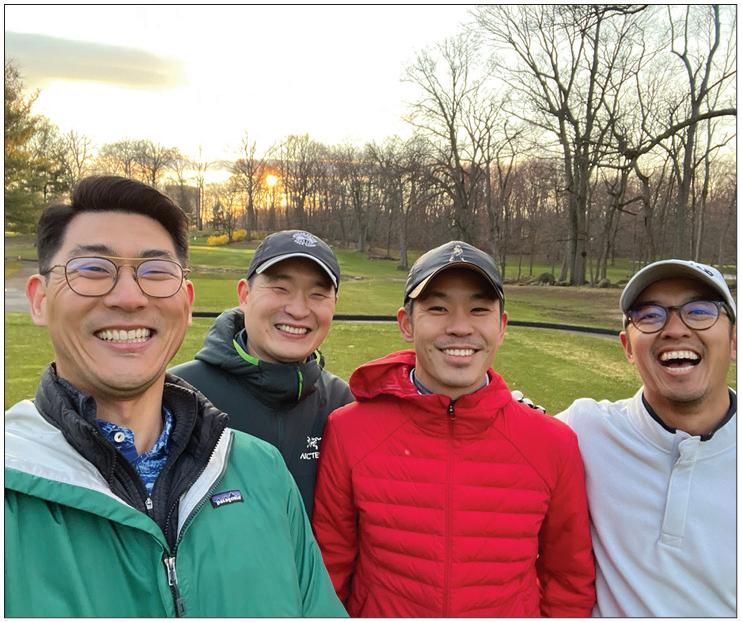
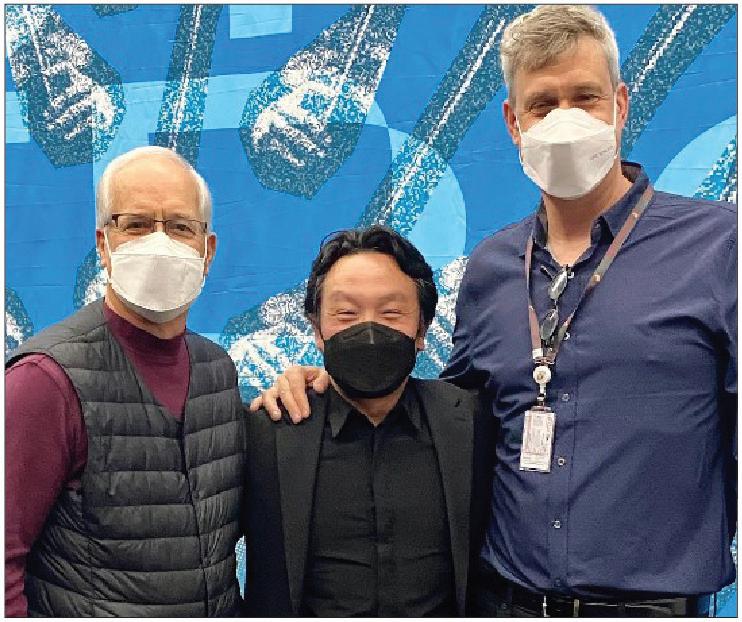
Upon graduation Larry Park ’93 worked in several different fields but has found law enforcement to be his calling. He has been working with the department’s Information Technology Bureau (ITB) as a Sergeant in
In January Alex Paik ’04 and his wife Jihyun Oh welcomed the birth of their baby, Hailey. Alex manages AP Communications, a PR & Marketing agency in Seoul. He lives near Hongdae and enjoys visiting and staying in touch with SFS by serving on the Alumni Committee.
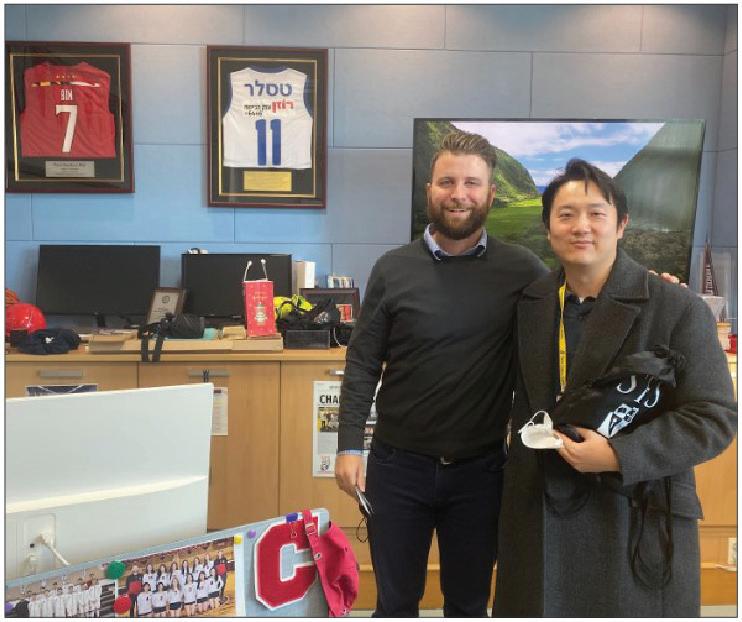
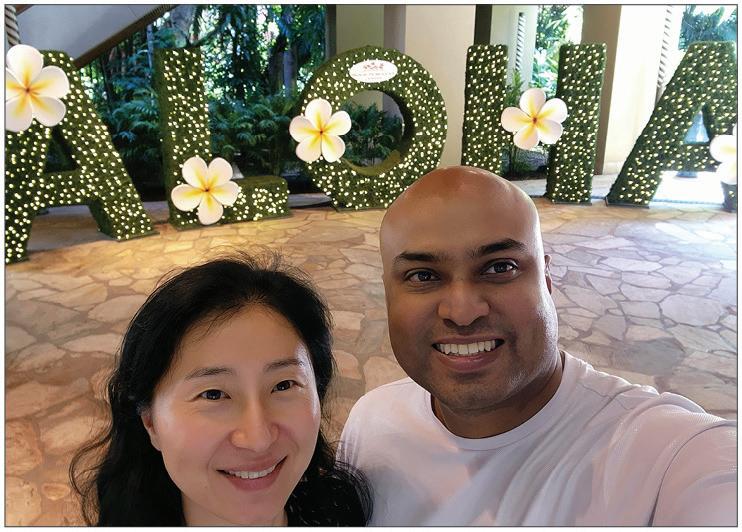
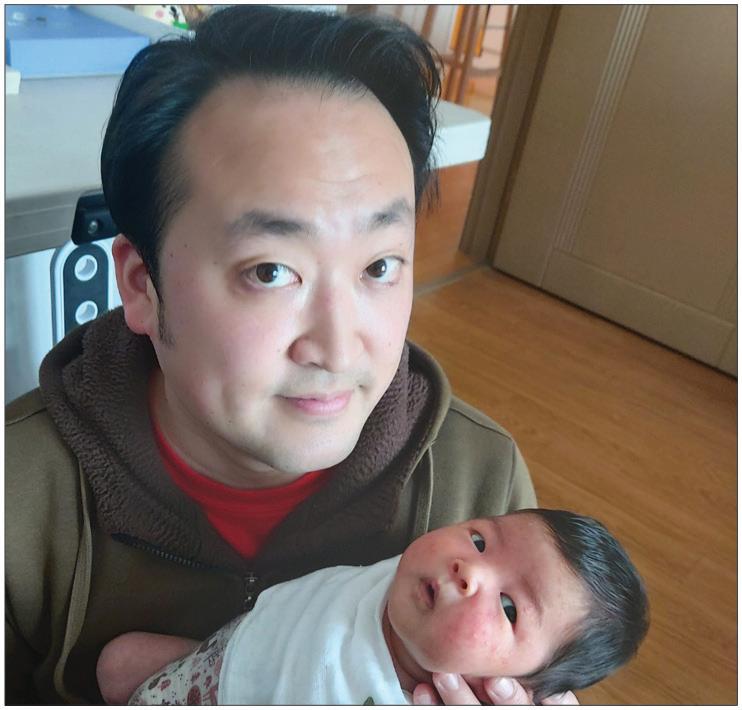
Sanchit "Sunny" Sehrawat ’04 currently lives in San Diego with his wife, where they bought a house in the middle of COVID. After various engineering roles in the automotive industry, he is now working as a Technical Program Manager at Amazon, making software for nextgeneration electric vehicles.
Meganne Benger ’09 and Alli Gingerich ’14 were both staff kids for one year together at SFS. While they weren’t exactly buddies (grade 4 and grade 9) at that time, they both moved to Kuala Lumpur in 2020 and reconnected there. They now enjoy being housemates, colleagues, adventure buddies, and good friends as they teach, travel, and reminisce about childhood in Korea.
Michelle Wilde ’12 enjoyed her time back on campus this winter. It was the first time she has been back since her graduation. She shared some pictures of her time at SFS both in 2012 and during her visit
64 The BANNER | Class Notes
93
96
03
04
05
09
Chris Chang ’05 sends his best to his classmates. Here, he is visiting SFS and catching up with Paul Rader.
12
Magali Filipuzzi Chuffart '93
Gene Moon '93 (center) with Jack Moon (left) and Eric DeHaan (right).
Ted Kim '03, Brian Park '03, Joon Lee '03, and Andy Oh '03.
Alex Paik '04 with his daughter Hailey.
Sanchit "Sunny" Sehrawat ’04 with his wife.
Chris Chang '05 visiting Paul Rader '04.
Richard Vaughn '96, Ed Lee '96, Anna Cho '96, Dukki Moon '96
this winter. A highlight of her visit was seeing Edie Moon and reminiscing about the theatre productions she was involved in.

14
Sam Joo ’13 joined the International Finance Corporation (IFC, part of the World Bank Group) in 2021, focusing on private equity investments in emerging markets. Over the last two years, he has invested in companies based in India, Egypt, Kenya, and Indonesia. He is most proud of the fact that these investments were completed in the midst of the COVID-19 pandemic and the current global macroeconomic downturn, when other global investors’ appetite for investing in companies in emerging markets was declining rapidly, and that he was able to mobilize capital into companies and geographies that he felt needed it most.
Heddi Lee ’13 is working as a Product Supply Senior Manager in the Korean branch of a global FMCG company. She is celebrating 10 years since graduation.
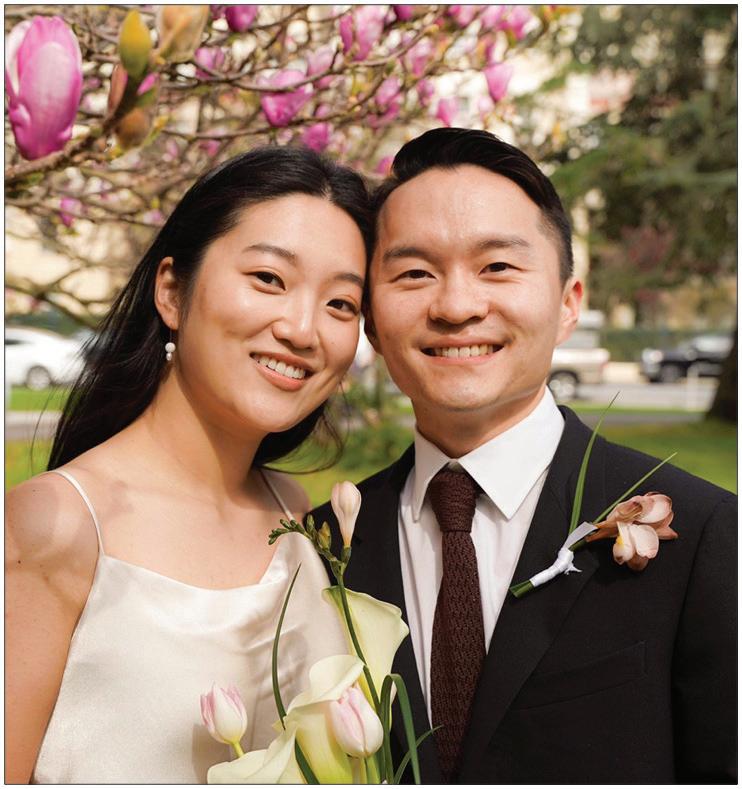
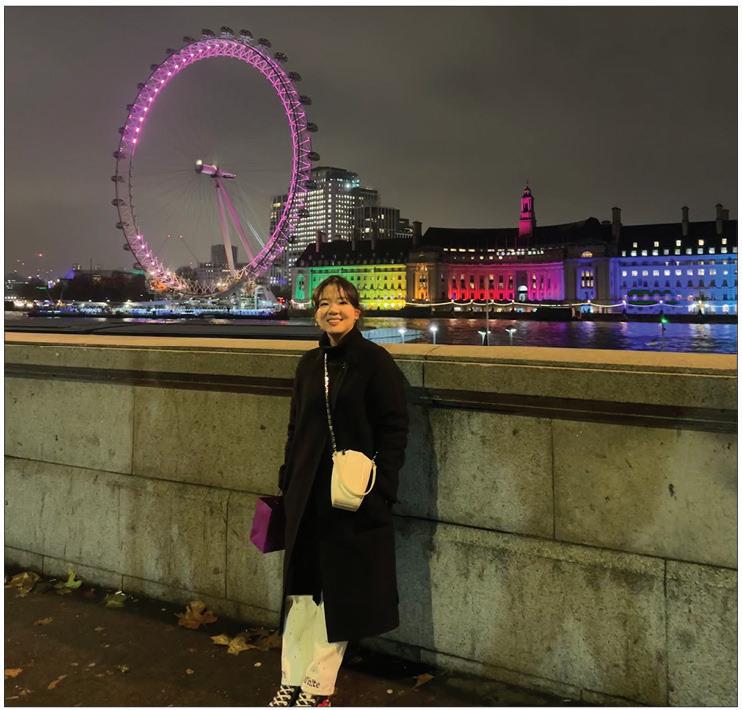
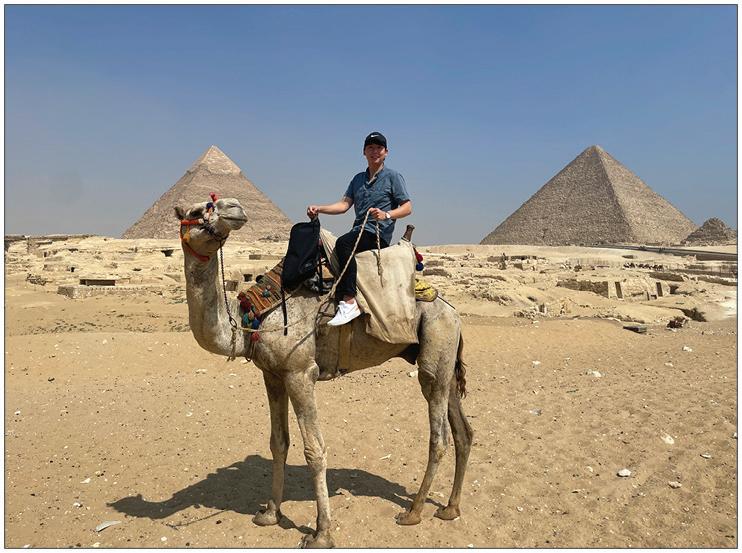
After graduating from SFS, Richard Cho ’15 and David Lee ’15 have kept in touch and continue to remain strong Crusader friends! This photo is from a recent trip to LA where they spent too much money on mediocre food at NOBU in Malibu.
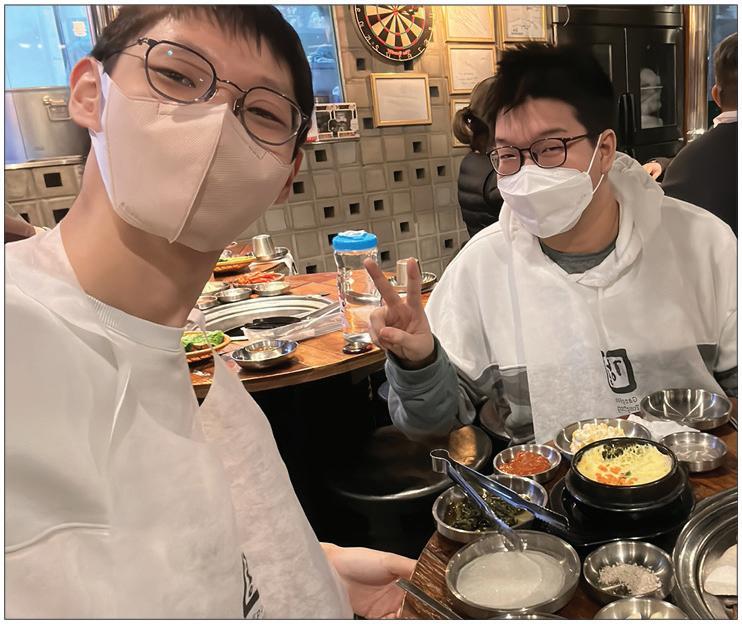
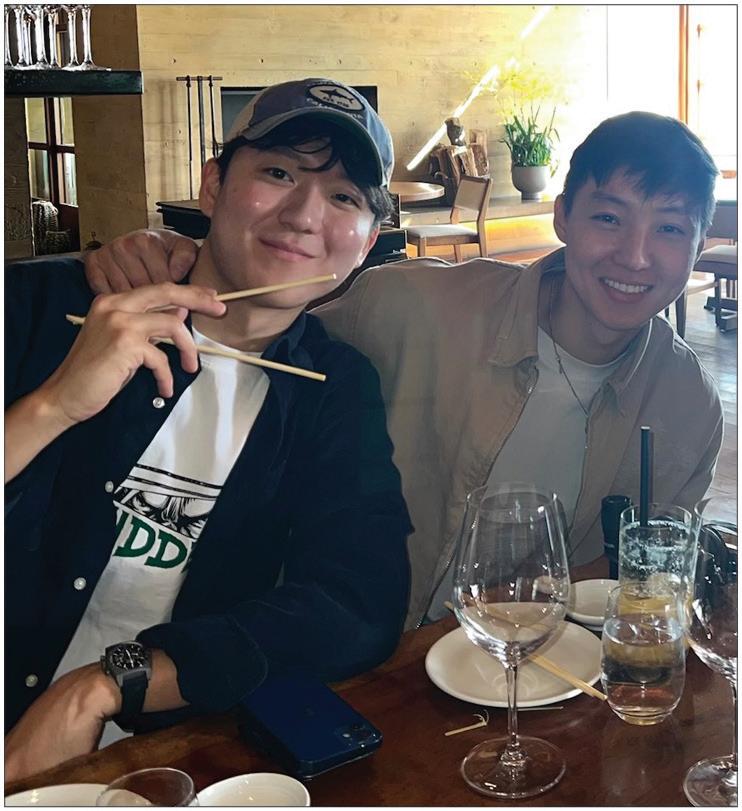
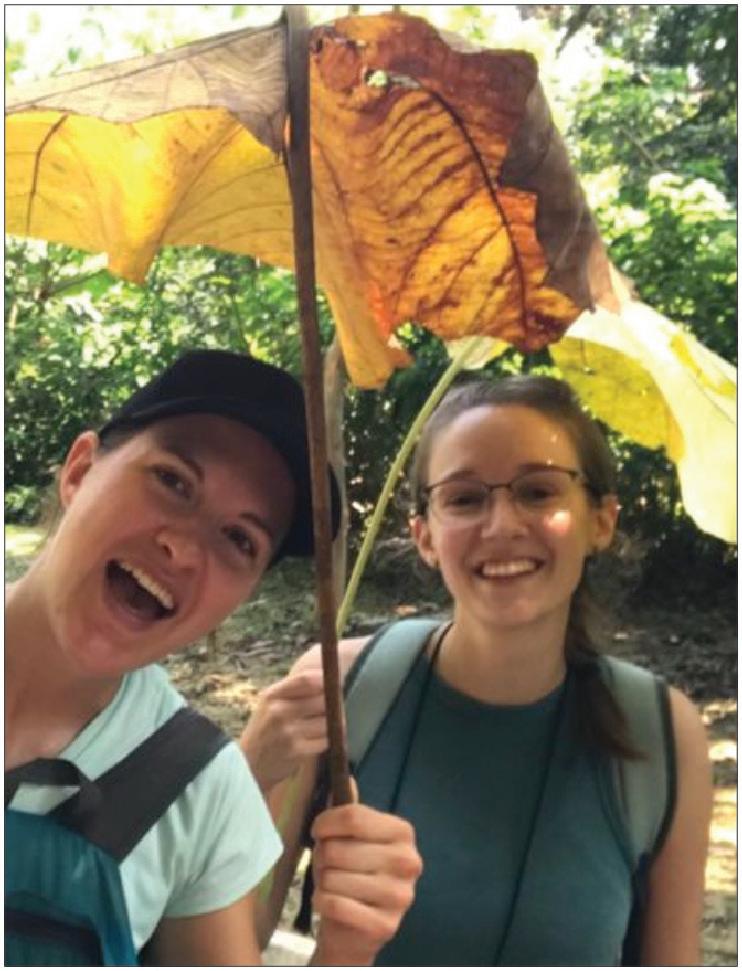
17
Ethan Lowry ’20 is now a junior at the University of Arkansas, Fayetteville. He is studying Management Information Systems & Marketing.
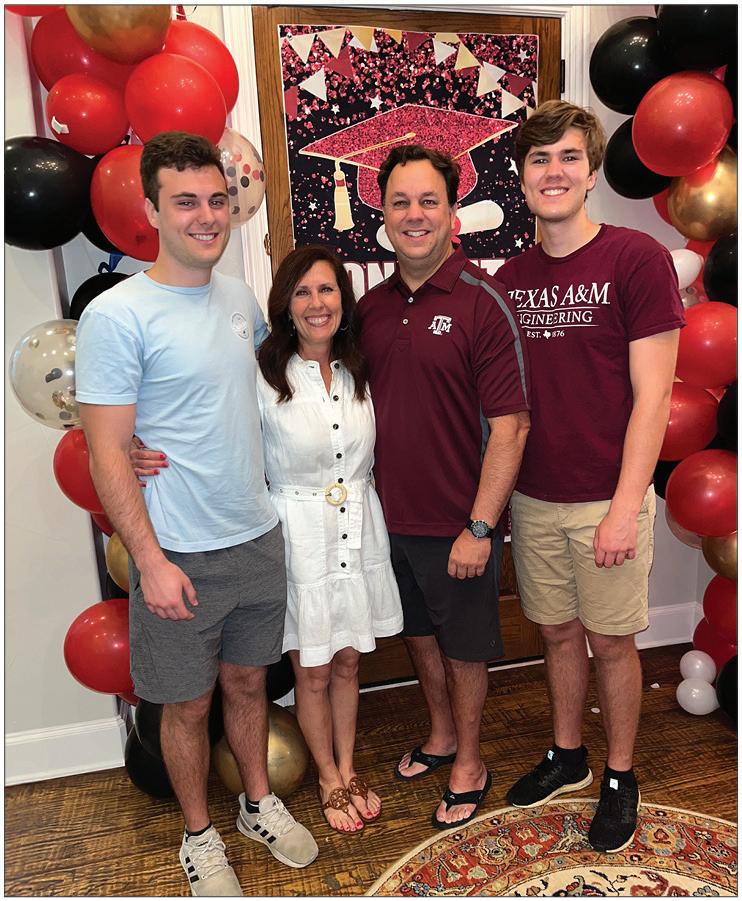
13
15
Albert Kim ’14 and Yage Song ’14 are getting married on April 29, 2023 in Seoul. Albert is the son of Esther Kim, who works in SFS's IT department.
Joseph Hong ’17 enjoyed dinner with Andrey Ten '17 at a Korean BBQ restaurant.
20
65 Spring 2023 | Class Notes
Meganne Benger '09 and Alli Gingerich '14.
Michelle Wilde '12 visiting Edie Moon this winter.
Sam Joo '13
Heddi Lee '13.
Albert Kim ’14 and Yage Song ’14.
Richard Cho ’15 and David Lee ’15.
Joseph Hong '17 and Andrey Ten '17.
Ethan Lowry '20 with his family.
Lately at SFS
There is so much happening at SFS on any given day that it would be impossible to capture everything in one magazine, so we’ve rounded up a few events that happened this semester at Seoul Foreign School.
Snapshots of Pre-K Cafeteria
Caleen Williams Early Years Art Teacher
Pre-K Homeroom Teachers and the Early Years Art Teacher teamed up to create a space that showcases students' artwork representing all the colors of the rainbow. The efforts toward this project include students actively creating artwork in their art classes from the lower pre-K classes from both the British School and the Elementary School. Students and parents were also invited to come check out what students had been learning and creating and had the opportunity to create artwork to go onto the mural.
What was once white walls in the cafeteria has now been transformed visually to encourage students toward healthy eating. We are hopeful that now students understand the importance and joy in "Eating the Colors of the Rainbow"!
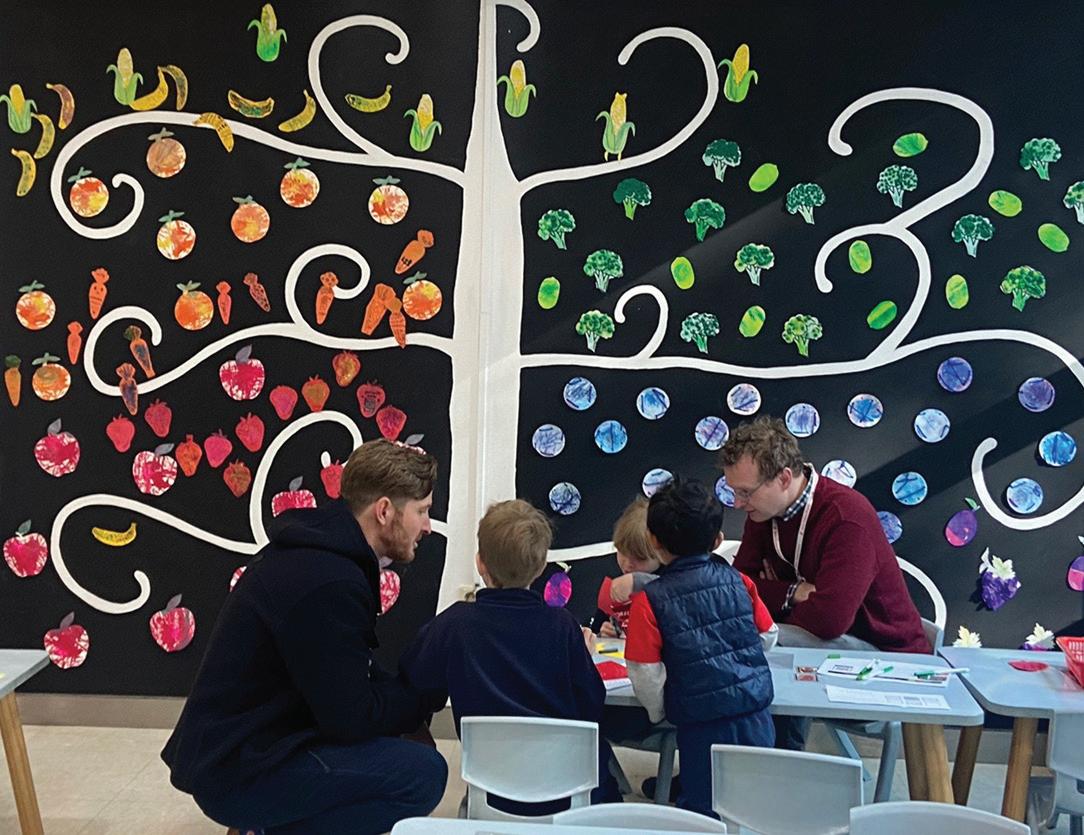
Nanumi and SFS: a partnership for Change
Follow us on Social Media
There’s always something happening at SFS. Follow us on social media and don’t miss an update!
Website: www.seoulforeign.org
Instagram: @seoul_foreign_school
Facebook: https://www.facebook.com/seoul.foreign.school/

Youtube: Seoul Foreign School
LinkedIn: Seoul Foreign School
Twitter: @SFS1912
For the past 3 years we’ve all been living in a frozen world where regular activities became dangerous, wearing masks became a daily part of our lives, and going to school or even just taking a walk was a risk to our health. Life was on pause. Covid had blocked us and our desire to help and give back to our community via direct service. As we transition back into our precovid lives, we can carry on with British School Social Leaders (BSSL) with no strict rules or limits on how we carry out our ideas. The next chapter of BSSL allows us to visit places within our community or allows others to come to campus to take part in activities we have organised.
BSSL has been a way for British School students to think of innovative strategies and ideas to help our community for years. My group revisited the work of past KS3 students and decided to reestablish a connection between the British School and Nanumi. Nanumi is a shelter for the homeless run by Director Kim, where volunteers help to provide food for a large number of homeless people. This act of direct service is what my group aimed to do during this year’s BSSL project. With no covid limitations, we were able to get experiences not possible in recent years.
The fact that some of us interacted personally with the homeless made it much more impactful as we got a brief glimpse of what life is like for them up close. It made us realise that we are one circumstance from being in a similar situation and that we are so fortunate to have the luxury to help those in need.
This year won’t be the last time a BSSL group will collaborate with Nanumi, it’s just the next chapter of many to come. We hope that our contribution impacted and made a significant difference to the community we served, and will continue to do so. Nanumi has helped us realise the importance of community and service. We hope that Nanumi will do the same for the future students who choose to serve and continue to inspire those involved.
Lizzie Kim British School Year 9
66 The BANNER | Lately at SFS
FOBISIA Leadership Conference
Abi Yoo British School Year 9
In December of 2019, the younger me was looking forward to venturing outside of Korea with my newly made friends, however those dreams were promptly destroyed by the start of COVID. Disappointed was an understatement; with all trips being cancelled I dreamt of a day when we could go and travel abroad. Finally, this day came.
On the 9th of February 2023 we left from Incheon Airport to Bangkok, Thailand. Immediately, we were greeted with the hot and humid weather but somehow it felt refreshing. The first day at Shrewsbury International School consisted of a project called Race4Good, founded by Linda Cruse. I was intrigued by the stories she had to tell and was amazed at how much she had accomplished. As the days went on I got more and more interested in how we can embrace our own interests and talents to create something more. Throughout these days I took part in a number of different workshops and learnt how I can lead others and most importantly, how I can lead myself. One of my favourite speakers was Isabel Valle, a Leadership Coach who, during the conference, taught me to focus on controlling my mind and leading my own thoughts before others. Later on I spoke with her separately about some questions I had and what advice she had. Even though it was short, those few minutes gave me guidance that I know will last me a lifetime.
During this trip I also got to meet new people, teachers, and students. By sharing our different traditions we were able to accept and support the differences rather than allow them to further move us apart. When I returned to Korea, I felt like I woke up from a long dream. One which you don’t really want to wake up from. Once I returned however, my mental model had changed. If you asked me before the conference, “What do you think makes a good leader?” I would have said the ability to listen to others and communicate with them. I would have talked about how the leader must work for the team. This is all true but one crucial thing that I learnt during the trip was that a leader works for the team and that the leader is also a part of the team. If you ask me now, “What do you think makes a good leader?” I will confidently say the ability to listen to others, to cooperate and encourage but also, to take care of yourself. The ability to lead yourself before taking on the responsibility of leading others. The ability to be self-aware and understand your own doubts (gremlins) before helping others. I learnt that thinking about yourself does not make you a bad leader; sometimes you have to take a step back and guide your own mind before guiding others. Now that restrictions are being lifted I hope that in the future we can have more opportunities to learn and develop our thinking.
In the British School section of our latest magazine, we would like to correct an error regarding the authorship of the article. The article titled Bringing back Community: reflections from SFS British School was written by Abi Yoo in Y9, and not by Junseo Lee as previously stated. We apologize for any confusion or inconvenience this may have caused. Here is Abi’s original piece:
Erratum
During the past year there have been so many changes in such a short amount of time that I don’t think I have been able to truly appreciate the British School community. I personally believe that the changes regarding the head students [electing three students instead of two, with one responsible for the care of each Key Stage 3 year group] was a good decision because it unlocked so many opportunities for ideas and opinions to be voiced and shared from all year groups. Becoming a head student myself is going to be one of my biggest achievements this year and I am constantly learning and developing new skills that I am sure will help me in the future. There are a variety of different skills that I learnt throughout my time at SFBS, and the core values will always be a big part of my time here. My ability to collaborate and communicate with peers has significantly increased since I first joined this school; I have learnt how to respect people, not just teachers but other students as well; I have learnt how to be courageous and take risks from time to time, how to reflect on my past decisions and experiences, and learnt to reflect on what I can do better next time I face the same problem. Through this position as head student I have had the chance to communicate with so many different members of the SFBS community and it has really shown me how much the teachers and the school in general care about us students’ wellbeing and our school lives. I believe that community is and always will be a very important part of SFBS and I wish for the future generations to be able to experience the same welcoming, safe environment I had the pleasure of being in.
Jamie Juhyun Oh British School Year 9
The FOBISIA Leadership Conference has taught me a lot of things since I came back to Korea. Not only did I learn and develop my leadership skills, but I also got to learn how to lead and coach not only others but also myself.
Isabel Valle was one of our spokespersons, and she taught us that there are three steps in leadership: 1. lead myself; 2. lead others; 3. become one. Numbers 2 and 3 seemed quite easy in our daily lives, as they were more about communicating with others; however, number 1 (leading myself) is the biggest challenge in leadership. In fact, from my own experience, keeping my mental state stable is quite challenging when leading others due to all the pressure and stress I receive. She taught us that for us to be successful leaders, we need to know how to maintain ourselves and lead ourselves into a more optimistic mindset.
By attending this conference, I got to learn that leadership isn’t only about collaborating or being confident; it’s also about being mentally stable and positive.
67 Spring 2023 | Lately at SFS
Summer camp trip to Jeju.
Letter from Advancement
Dear SFS Community,
We are nearing the end of a school year that feels more like normality. Everyone was busy and excited trying to make up for all the lost pandemic years and we were grateful to have celebrated our belated 110th Anniversary and bring back the entire community with the International Fair this spring.
It has been a great year for Advancement at SFS too. This year, we have received KRW 394,471, 226 to the Annual Fund as of May 10, 2023 which directly benefits every student, every day, and every part of the SFS experience. In addition to the Annual Fund, we have received support for scholarships, Building for the Future Fund and other areas of need where total funds received is KRW 505,144,346 and 687 gifts to date.
This year’s Annual Fund has made a direct impact on school learning by supporting technology software for math, literacy, and college & career readiness curriculum, robotics equipment, new speaker and amplifiers system in the Lyso Center for the Performing Arts, and professional development opportunities for faculty and staff, to name a few and the upgrading of the soccer field which is planned for the summer of 2023. The three week fundraising campaign for the soccer field this spring brought the SFS community together once again and we are so proud and grateful for how our community rallied to support a facility that will benefit our entire community for many years to come.
As we continue to seek donations for the soccer field, we invite you to join our growing donor community by making a gift of any size by June 30th. Participation builds community, so please pitch in and help us create an upgraded soccer field for our community this summer! With great appreciation for your continued support,
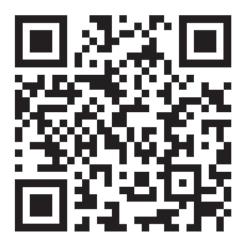 Yoojin Um Director of Advancement
Yoojin Um Director of Advancement
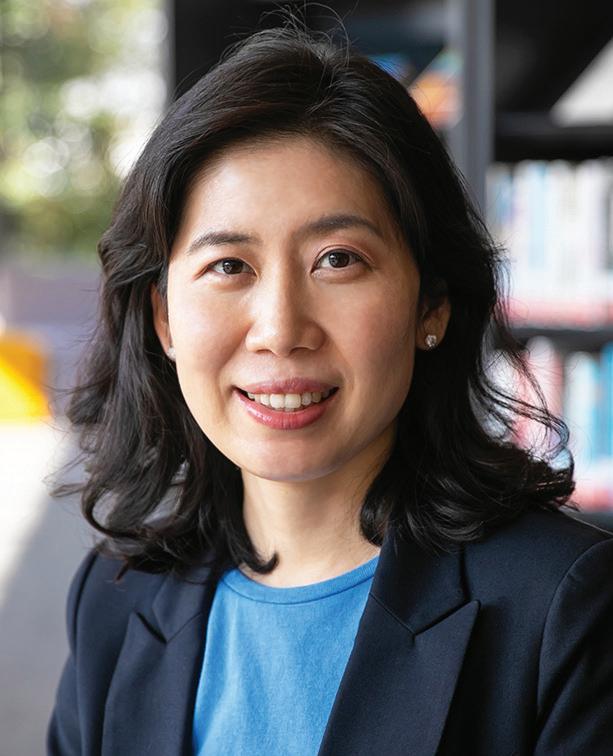
HS Student Gifts her Award to the Annual Fund
Hyunjoo (Grace) Lee, Grade 11, received an award at the Hanwha Science Challenge, performing a science experiment about eradicating radioactive material from the soil. Hanwha holds one of the biggest science competitions in Korea. Last year’s theme was “Saving the Earth”, finding creative ways to contribute to energy, climate change, and water solutions. Despite the long challenging process, Grace learned how to set the logistics and scope in the planning stage and learned to see the story that the data was telling her during the experimenting stage. It was meaningful to present and listen to other groups’ ideas and presentations. Grace was one of the finalists out of over 1,000 students and received a Bronze award. She decided to donate KRW 1,000,000 to the School so that it can be put to better use for the SFS community.
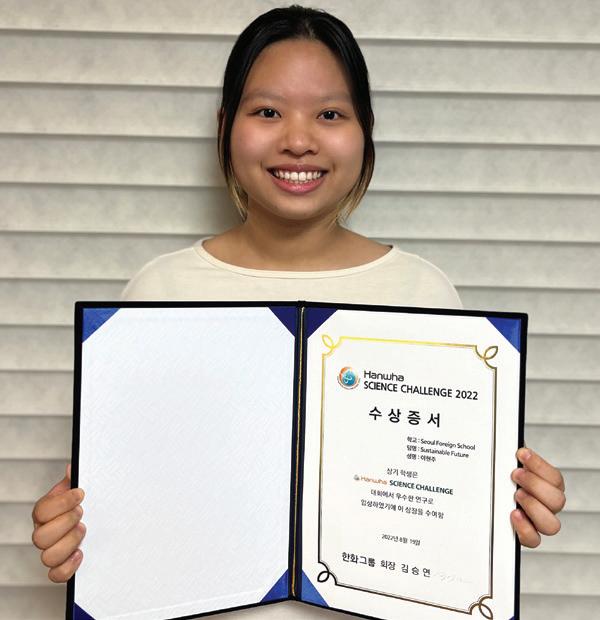
2023 Girls Varsity Soccer Team Makes a Gift to the New Soccer Field
For more information on giving:
In support of the soccer field upgrade this summer, the 2023 Girls Varsity Soccer Champions collectively made a contribution of over KRW 5,000,000 to the Annual Fund. We are so proud of their achievements this year and grateful for the team coming together to support this initiative for everyone in the community to enjoy. Thank you!
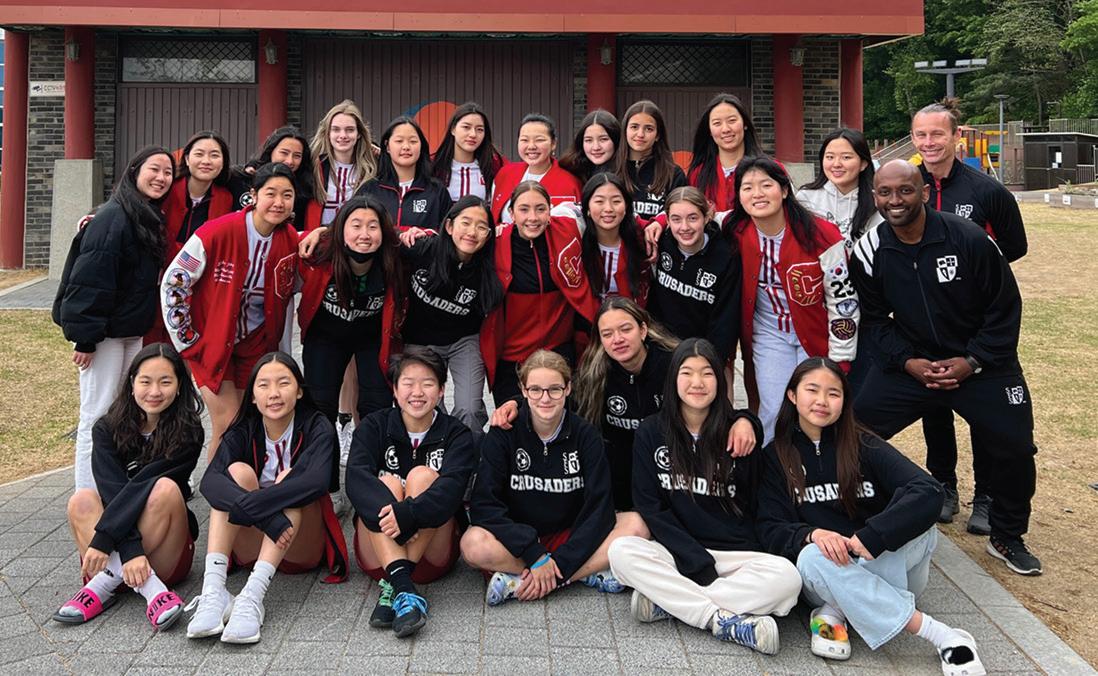
68 The BANNER | Advancement
2022 - 2023 Donors
As of May 10, 2023
Faculty and Staff (F/S), Alumni (A) (USD 1 = KRW 1,298.60)
The Heritage Club $ 100,000 + KRW 100,000,000 +
1912 Society $ 50,000 - 99,999
KRW 50,000,000 - 99,999,999
The Millennium Club $ 10,000 - 49,999
KRW 10,000,000 - 49,999,999
Red and Black Club $ 5,000 - 9,999
KRW 5,000,000 - 9,999,999
The Crusader Club $ 2,500 - 4,999
KRW 2,500,000 - 4,999,999
$ 1,000 - 2,499
The Kopp Family - Hana ’24 & Aidan ’28
Josephine ’22 and Jeneve ’27 Lee
Sungah (Hannah) Lim ’27 (A)
Joelle ’29 and Cooper ’34 Oh
Daniel Park ’34, Sophia Park ’37, Jae Hong Park and Catherina Yoon (F/S)
Lauren ’23 and Aidan ’26 Song
Hyejin and Min Suh
Young Beom Um and Ju Hyun Chung
THE CRUSADER CLUB
Ian Ka loi Chu ’32
Ryan, Sophie, Will ’32, Flo ’34 and Alfie ’37 Hammerberg (F/S)
Maryclaire Seo Yeon Kelly ’35
Family of Sebi Kim ’27
The Kwon Family - Oh Hyung, Hee Sun, Bryan H. ’22 and Grace H. ’30
THE CREST CLUB
The Crest Club
Centennial Club
KRW 1,000,000 - 2,499,999
$ 100 - 999
KRW 100,000 - 999,999
The Legacy Club Under $ 99 Under KRW 99,999
Annual Fund
1912 SOCIETY CLUB
Friends of Seoul Foreign School
THE MILLENNIUM CLUB
Edward Choi ’38 Family
Joseph Choi ’27
Ian Chung ’36
Junghan Kim and Kyungmi Lee
Jennifer Oh and Yon Sog Choi
Parents of Benjamin Tae-young Yoon ’32
RED AND BLACK CLUB
2023 Girls Varsity Soccer Team
Tom and Anita Alexander (F/S)
Danam Engineering
Colm and Sinead Flanagan (F/S)
Debbie Gim ’06 (A)
Goldman Sachs Matching Gift
Yune ’27 and Jean ’33 Hur
Dr. Carl Im and Ms. Helen Chung
Adithya ’30 and Shana ’30 Iyer
Celine Jin (F/S)
Kevin Jo
Kayler ’26 and Mingyo ’28 Kim
Yoochan ’33 and Yoojun ’34 Kim
Anonymous (2)
The Aumann Family
Seungyoon Baik ’31
Jinsung Bang ’29
Isaiah ’38, Abe ’35, Tim and Cyrielle Bazin (F/S)
The Black Family (F/S) (A)
Sean, Stephanie, Spencer ’37 and Sullivan ’39
Cary (F/S)
Minjoon ’32 and Guipeum ’32 Chang
Youngjoong Chang, Hyolin Kim and Ian
Chang ’25
SooJin Cho (F/S)
Kwanghae (Aaron) Choi ’35
Lucas Yul Choi ’34
Minsoo Choi and June Kang (A)
Moses, Dahee, Adeline Lia Choi ’34
Ryan ’28 and Eric ’33 Choi
Ella ’24 and Gwyneth ’25 Chun
Steven Chung ’28
Jayden ’30 and Aaliyah ’33 Cruz (A)
The Cupps Family
James ’26 and Harry ’30 Gartside
James and Sarah (Hubbard) ’71 Gunberg (A)
Chloe ’25, Zoe ’28 and Ellie ’30 Han
Sei Eun (Claire) Hong ’28
Tchiamo ’30, So Young and Simon Hurst
Michael and Danielle Jarvis Lucchesi (F/S)
GaHyun Kim ’33
Jerome and Silvia Kim
Joanne Kim ’28
Tabitha ’17, Luke ’21 and Jordan ’23 Kim
Youan Kim ’35
Hae Jin Koh (A)
Nancy Le Nezet and Adam Bernard (F/S)
Aiden ’30 and Jaden ’33 Lee
Chloe Lee ’31 and Yoojin Um (F/S)
Hyunjoo Grace Lee ’24
Richard Lim ’94 and Lauren Lim ’32 (A)
The McMurray Family
Leon ’27 and Lev ’27 Militsin
John Min ’95 and Halyn Min ’28 (A)
Rebecca Murray (F/S)
James No and Dr. Haegeun Song
Hyungji Park ’85, Dongkyun Nicholas ’22 and Seoyun Natalie ’24 Kim (A)
Susan Park and Minhoo Bae (F/S)
The Prest Family (F/S)
Paul ’04 and Hannah Rader (F/S) (A)
The Seewald Family (F/S)
Seodaemungu Volleyball Association
Benjamin Sim ’27, Michelle Kim ’00 and Sung Jin Sim (F/S) (A)
Daechang ’23 and Mirim ’26 Suh (A)
The Walker Family (F/S)
Jessica ’15, Michael ’18 and Stephanie ’25
Woo (F/S)
Stephanie Woo ’25 (F/S)
Yeonhui Soccer Club
Renee and Zoey Yoo
Dowon (Mason) Yoon ’31
CENTENNIAL CLUB
Anonymous (13)
Ethan Albano ’24 (F/S)
Ky Almand ’27
Dong-Joon (Andrew) An ’24 and MinSung Kim (F/S)
Abe Bazin ’35 (F/S)
Isaiah Bazin ’38 (F/S)
Arnaud and Lisa Boulestreau (F/S)
Melissa Brabon (F/S)
The Breedlove Family (F/S)
Nancy Calimlim (F/S)
Daniel Minki Chang ’32
Charlotte Choi ’30
Hana Choi (F/S)
Makayla Choi (F/S)
Tovee Choi ’30
Yun Jeong ’24 and Hee Jeong ’28 Choi
Andrew Chung ’97, Soo Youn Nam, Farrah Chung ’29 and Micah Chung (A)
Peter Chung ’89 (A)
The Creech Family (F/S) (A)
The Cuello-Federighi Family
Eric and Jillian De Haan (F/S)
Kang Hoe Do (F/S)
Mathilde ’21, Hugo ’26, Marieke and Jeff Doherty (A)
Helena Dommestrup ’25
69 Spring 2023 | Advancement
Yves Donval (F/S)
Peter Dorow ’79 and Cerise Kogl (A)
The Elliott Family (F/S)
The Feitosa Family (F/S)
Abby Fitts ’97 (A)
Noah Gerding ’96 (A)
The Gilmore Family (F/S)
Kirsten Gray (F/S)
Ling Guo (F/S)
Jee Hye Ha (F/S)
Olivia ’26 and Ines ’31 Ha
Caroline Hahn (F/S)
The Han/Chi Family (F/S)
The Han Family-Emma ’27 and Erin ’30 (F/S)
Yuna Han ’22 (F/S)
Carl Hanson
Haruka Hattori (F/S)
Holly Hitchcock and Colin Spitler (F/S)
The Holbrook Family (F/S)
Chris, Julie, Calla ’36 and Zinnia Horan (F/S)
Elizabeth ’27 and Madeline ’30 Hwang
Yuwon Jeong (F/S)
Sungwoo Jo ’28
John K. Johnson ’69 (A)
Matt and Caden ’35 Johnson (F/S)
Sophia and Kaya ’36 Johnson (F/S)
Jamie ’09 and Jonathan ’11 Jun (F/S)
Grace Jung (F/S)
Seung Min Kang (F/S)
Sophia Kang (F/S)
Yoon Kang (F/S)
Anna Kim (F/S)
Catherine Kim (F/S)
Colin ’18, Ryan ’21 and Cameron ’25 Kim
Crystal Kim (F/S)
Daniel ’28 and Asher ’32 Kim
Dave H. Kim
Eileen Kim ’31 and Juhie Suh ’92 (F/S) (A)
Enoch ’33 and Elliott ’36 Kim
Ethan J. Kim ’34
Hannah Kim (F/S)
Heejin Kim Gregory ’03 (A)
Jean Kim (F/S)
Jinny Kim (F/S)
Kyu Heon Kim (F/S)
Marie Kim (F/S)
Nikki Kim (F/S)
Paul Kim (F/S)
Ryan Kim ’28
Taehwan Kim ’32
Dongwook Koh (F/S)
Soora Koh (F/S)
Michael Kosh (F/S)
Kian ’26 and Nuri ’28 Krumscheid
Nami Kwon (F/S)
Jae-Eun Lah (F/S)
Andy and Joanna Lee (F/S)
Christine Lee (F/S)
Helen Lee (F/S)
Hugh Heung Sang Lee (F/S)
Jina Lee (F/S)
Junhee Lee ’32
Moon Jin Lee (F/S)
Seulgee Lee (F/S)
Younghi Lee
Arabella Lespine (F/S)
Yanghee Lim (F/S)
Zhiyong (Rian) Liu ’36
Vasile Lozneanu (F/S)
Zuzana Matusova (F/S)
The Mazowiecki-Kocyk Family (F/S)
Elizabeth McGarroch-Slack (F/S)
Heather Min (F/S)
Jenny Min ’25
Moon Ki Min (F/S)
Ved Mishra ’35 (F/S)
Gene ’93 and Theresa Moon (A)
The Munce Family (F/S)
Michael O’Donnell ’70 (A)
Megumi Ono ’29
Elish Pangiraj and Prema Thomas (F/S)
The Park Family (A)
Anna Park (F/S) (A)
Dean (Chang) Park ’89, Jisoo Shim, Stephanie Park’ 22 and Sylvia Park ’24 (A)
Nicholas Park ’93, Eunie Lee ’00 and Yena Park ’26 (A)
Yena Park ’26 (A)
Brigitte Parr (F/S)
James ’30, Bram ’32 and Frankie ’38 Rader (F/S)
David and Julia Robinson (F/S)
Jordan ’29, Carly ’32 and Amelie ’33 Ruggles
Anthony J Selley (A)
Soomin Seo and Kangwon Lee
Seoul Foreign Adult Soccer Team (F/S)
The Shim Family
Jany Shim (F/S)
Hyesoon Shin (F/S)
Benjamin Sim ’27 (F/S)
Alyvia Smith ’34 (F/S)
Shannon and Justin Smith (F/S)
Inwoo Sohn ’24
Angela, Shin, Emery ’29 and Calvin ’31 Son (F/S)
The Sons - Emery ’29 and Calvin ’31 (F/S)
Grace Song (F/S)
Jakob Stehle ’23
Aiden Suh ’26
Minjae Suh ’29
Myung Sung (F/S)
The Swaine Family
The Teather Family (Jade ’18 and Ella ’21) (F/S)
Kelly Yuan Tian (F/S)
Felipe ’23 and Diego ’23 Torrealba
Fred Underwood ’72 (A)
Peter ’73 and Diana Underwood (A)
Vincent-Jo Family
The Visahan Family (F/S)
Donna Wang (F/S)
Matt, Dee Dee, Lily ’24 and Olivia ’26
Wasmund
Hye Sun Woo (F/S)
Mia and Joshua Yaniw (F/S)
Jami Yeo (F/S)
Joanna Yoo (F/S)
Catherine Yoon ’28
Jeonghee Yoon (F/S)
Michael Yoon ’30
Jerry ’29 and Nina ’31 Zeng
Hanwen ’30 and Xianwen ’37 Zhang
THE LEGACY CLUB
Anonymous (9)
Heather Adkins (F/S)
Younjin Ahn (F/S)
Young Bo Bae (F/S)
Anton Bernard ’26 (F/S)
Lychelle Bruski (F/S)
Vanessa Buggs ’36 (F/S)
AhYoung Chi and David Han (F/S)
Ja Yong Choi (F/S)
Hannah Chung (F/S)
Justin Chung ’13 (A)
Cristina Cockrum (F/S)
Nicole Cook (F/S)
Sara Dorow ’82 (A)
Seong Hoon Hong (F/S)
Wootak Jeun (F/S)
Jimenez and Mazul (F/S)
Emmalee Johnson (F/S)
Jin Hyuck Joo (F/S)
Jiyoung Jung (F/S)
Jung Kyo Jung (F/S)
Calvin Kamphuis (F/S)
Dongsuk Kang (F/S)
Sang Oh Kang (F/S)
Borah Kim (F/S)
Chul Hoi Kim (F/S)
70 The BANNER | Advancement
Doyeon (Daisy) Kim (F/S)
Esther H. Kim (F/S)
Esther (Ji Young) Kim (F/S)
Hyung Gil Kim (F/S)
Jiyeon Kim (F/S)
Nampil Kim (F/S)
Sook Young Kim (F/S)
Sung Duck Kim (F/S)
Eunha Ko (F/S)
Sarah Ko (F/S)
Hong Seo Koo (F/S)
Ikhwan Kwon (F/S)
Byung Ju Lee (F/S)
Eun Ji Lee (F/S)
Eun Mi Jennifer Lee (F/S)
Hyesoo Lee (F/S)
Jae Hun Lee (F/S)
Jinju Lee (F/S)
Jiwon Lee (F/S)
Jung Yong Lee (F/S)
Natalie Lee ’31
Seoung Hwa Lee (F/S)
Seungwoo Lee (F/S)
Sua Lee (F/S)
Marcus Li ’26 and Leo Malik ’31 (F/S)
Catherine Lorenz (F/S)
Kalina ’30 and Aniela ’31 Martin (F/S)
Meagan Mathews (F/S)
Amy Midgley (F/S)
Grace Miller (F/S)
Shawn Monette (F/S)
Dong Hoon Moon (F/S)
Young Sik Moon (F/S)
Seung Min Nam (F/S)
Indira Pappaterra (F/S)
Justin Park (F/S)
Ro Park ’33
Andrea Razon (F/S)
The Scott Family - Ryley Scott ’30 and Sidney
Scott ’32 (F/S)
Woochul Seol (F/S)
Dong Jin Shin (F/S)
Chris Sykes (F/S)
Karen Terry (F/S)
Ben Van Lierop ’65 (A)
Luna Webb ’28 (F/S)
Emma Woo (F/S)
Chang Kun Yang (F/S)
Jean Yoo (F/S)
Ji Yae Yoon (F/S)
Xin Zhao (F/S)
Anna Zygner (F/S)
Building for the Future Fund
THE MILLENNIUM CLUB
Joseph Choi ’27
Haelyung Hwang Family (A)
Family of Dong-Yeob Daniel Hyon ’27
RED AND BLACK CLUB
Debbie Gim ’06 (A)
Goldman Sachs Matching Gift
Sungah (Hannah) Lim ’27 (A)
THE CREST CLUB
Nate and Julie Doelling (F/S)
Dae Woon Kim (F/S)
CENTENNIAL CLUB
Anonymous (1)
Youngwoo Cho (F/S)
The Creech Family (F/S) (A)
Scott and Lilly Day (F/S)
Choongpyo Hong (F/S)
Matt, Sophia, Caden ’35 and Kaya ’36
Johnson (F/S)
Chris Een-Soo Kim (F/S)
Hannah Kim (F/S)
Yerin Amy Kim ’32, Yhu-Bin Lee and Seong
Dong Kim (F/S)
Marcus Li ’26 and Leo Malik ’31 (F/S)
Mariana Miroiu (F/S)
Nathan ’24 and Ana ’27 Park (F/S)
Andrew ’26 and Jia ’28 Rhee
Juyeon You (F/S)
THE LEGACY CLUB
Anonymous (1)
Won Joo Hwang (F/S)
Pitch In: Playground
THE MILLENNIUM CLUB
Anonymous (1)
The Striffler Family (F/S)
RED AND BLACK
Latham-DiStasio Family
Endowment
CENTENNIAL CLUB
Anonymous (1)
Hae Jin Koh (A)
Jack R. Moon Biology Scholarship
THE CREST CLUB
Jennie Rader Purvis ’83 (F/S) (A)
CENTENNIAL CLUB
Anonymous (3)
John ’04 and Stephanie ’05 Black (F/S) (A)
The Gilmore Family (F/S)
Jack and Edie ’77 Moon (F/S) (A)
The Yap Family (F/S)
THE LEGACY CLUB
Anonymous (2)
Jong Chul Choi (F/S)
Temporarily Restricted Funds
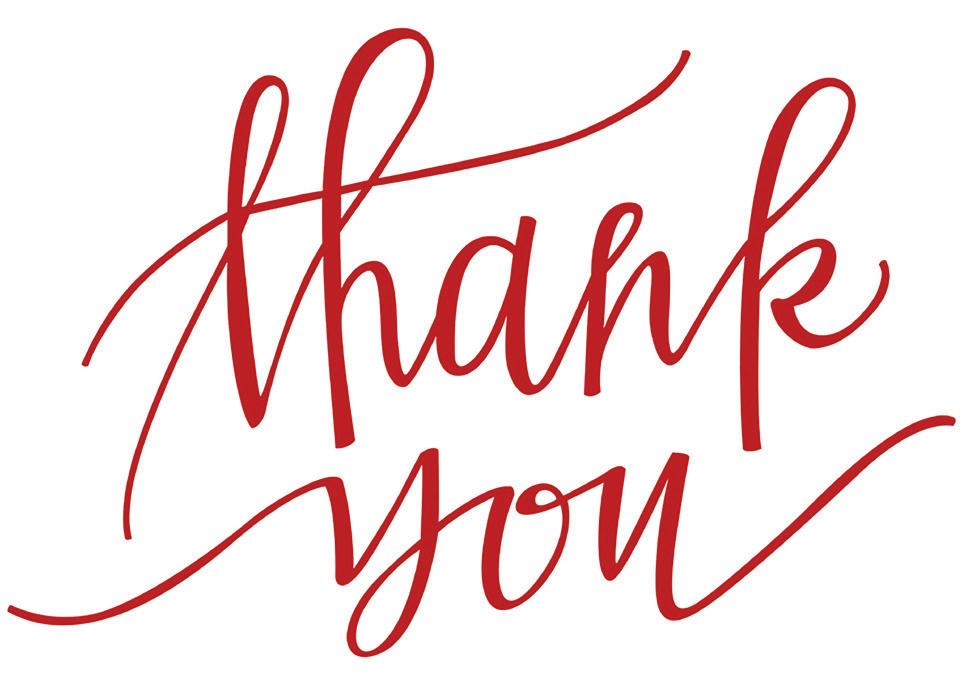
RED AND BLACK CLUB
Younghan, Grace, and Isaac ’34 Hahm (F/S)
THE CREST CLUB
Hae Jin Koh (A)
In Honor of Kevin and Ellen O'Donnell (A)
CENTENNIAL CLUB
Julie Lee (F/S)
Gifts in Kind
Anonymous
Global Korean Nursing Foundation
Younggwon Kim
Kroad
71 Spring 2023 | Advancement
Mr. Kocyk's 2022 Time Capsule Word Puzzle
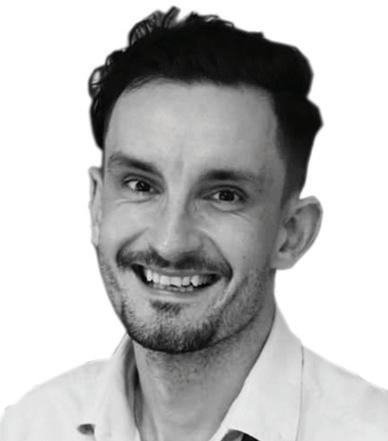
72 The BANNER | Games
WORLDCUP
ARGENTINA CHATGPT CLIMATESUMMIT CRYPTOCURRENCY GASLIGHTING MARSMISSION MBAPPE OLYMPICS OMICRON SPACEX UKRAINE
73 Spring 2023 | Games Pokemaze!
catch Pikachu! Help Ash get to Pikachu as fast as possible!
Gotta

74 The BANNER | Games
1. snrrunayaostu
2. erlsuspsauoi
3. pclteoirorav
4. strcitoepra
5. uoauicsrbhsra
6. luasrslauo
7. arouousbtnrs
8. potadtecylr
9. rgsusostuea
10. rspiuasuson
11. sluimamgil
12. tuluraasr
1. Tyrannosaurus 2. Plesiosaurus 3. Velociraptor 4. Triceratops 5. Brachiosaurus 6. Allosaurus 7. Brontosaurus 8. Pterodactyl 9. Stegosaurus
10. Spinosaurus 11. Gallimimus 12. Talarurus
Math Puzzle
How to Play:
1. Roll two dice
2. Add the numbers
3. Cover the sum with your marker
4. First player to get 4 in a row wins!
75 Spring 2023 | Games
Seoul Foreign School
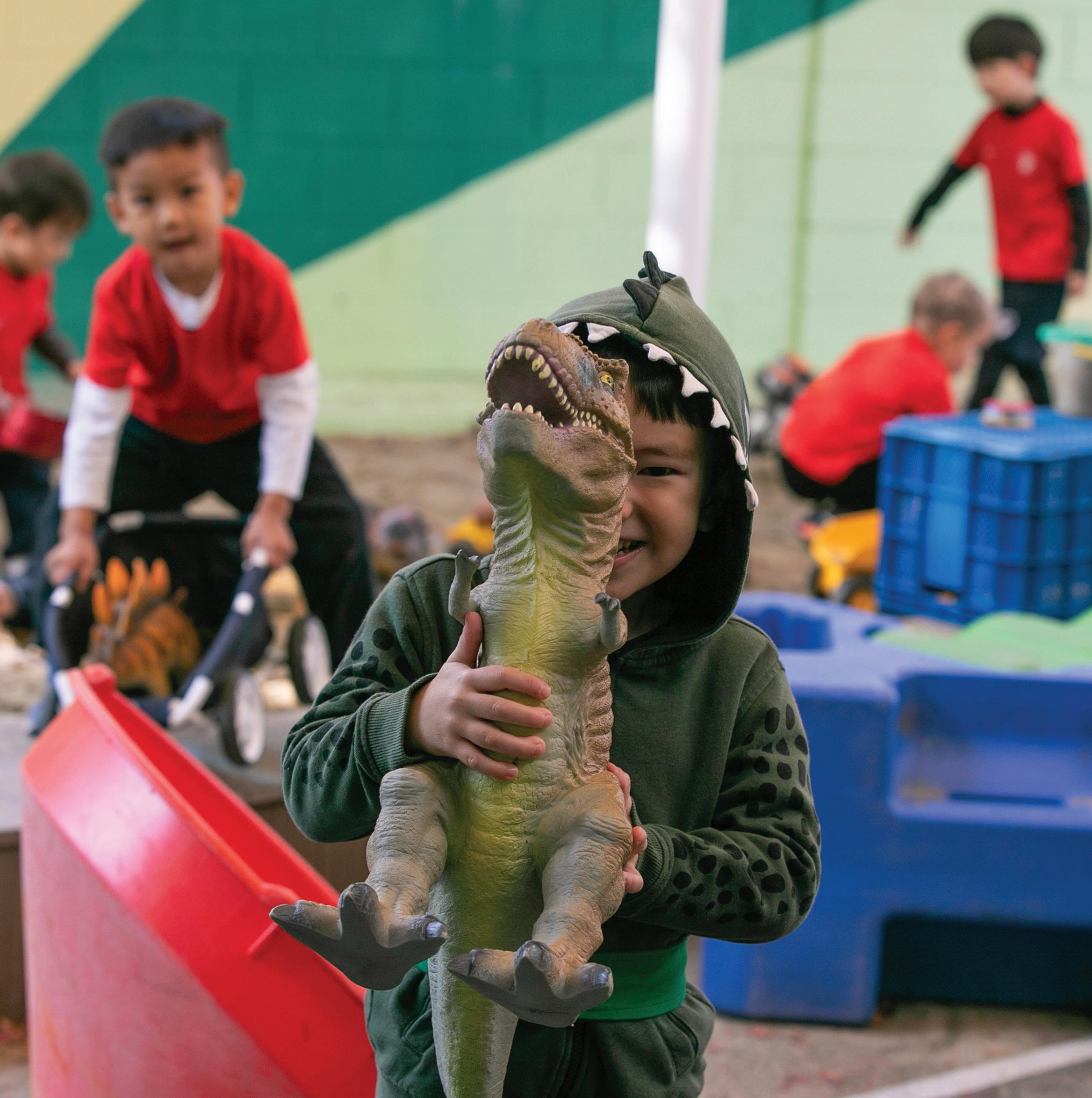
39 Yeonhui-ro 22-gil Yeonhui-dong, Seodaemun-gu Seoul, South Korea 03723 www.seoulforeign.org
For the digital version of this issue, scan the QR code or visit https://sfscom.page.link/banner2023spring
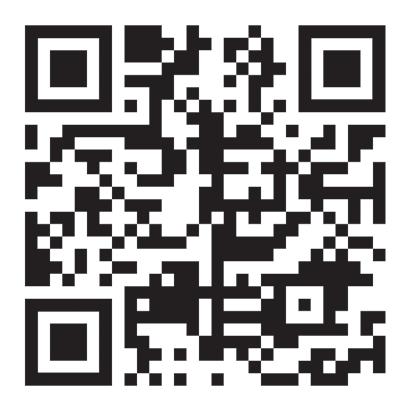 British School Foundation Class playing with dinosaur toys as part of their IEYC unit of 'Dinosaur Detectives'.
British School Foundation Class playing with dinosaur toys as part of their IEYC unit of 'Dinosaur Detectives'.




























 By Rafael Jimenez Learning Support Specialist
By Rafael Jimenez Learning Support Specialist


 Elementary School House Captains
Elementary School House Captains




 By Brigitte Parr Head of Design
By Brigitte Parr Head of Design











 (Above) High School varsity cheerleading team during Homecoming performance.
(Above) High School varsity cheerleading team during Homecoming performance.















 By Paul D. Rader '04 Director of Sports
By Paul D. Rader '04 Director of Sports





 By Justin Smith Middle School Principal
By Justin Smith Middle School Principal




























 Yoojin Um Director of Advancement
Yoojin Um Director of Advancement







 British School Foundation Class playing with dinosaur toys as part of their IEYC unit of 'Dinosaur Detectives'.
British School Foundation Class playing with dinosaur toys as part of their IEYC unit of 'Dinosaur Detectives'.